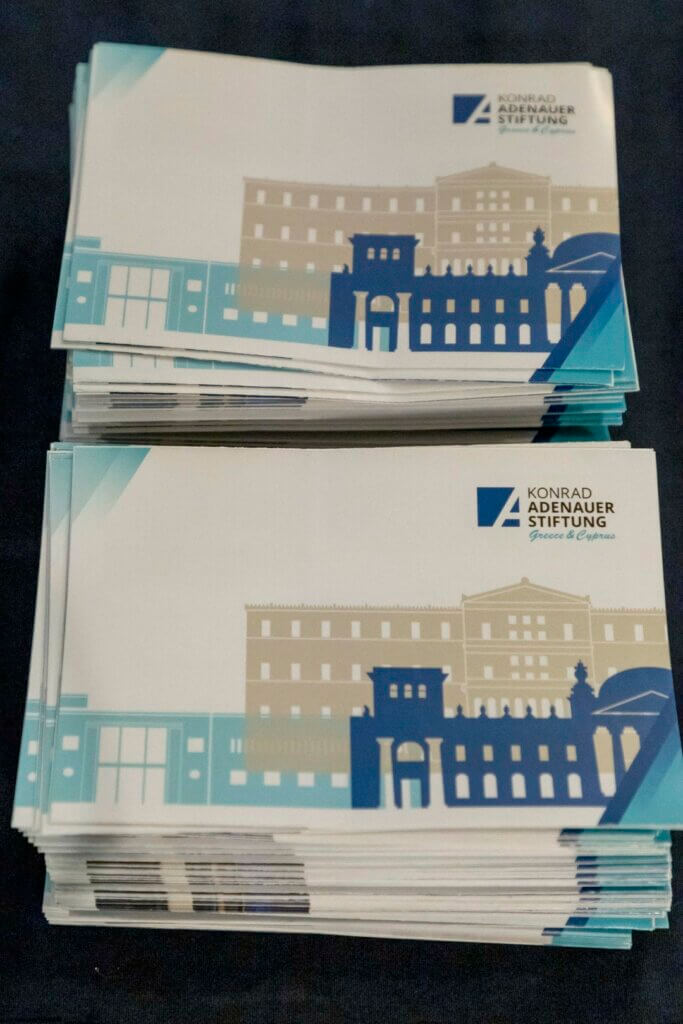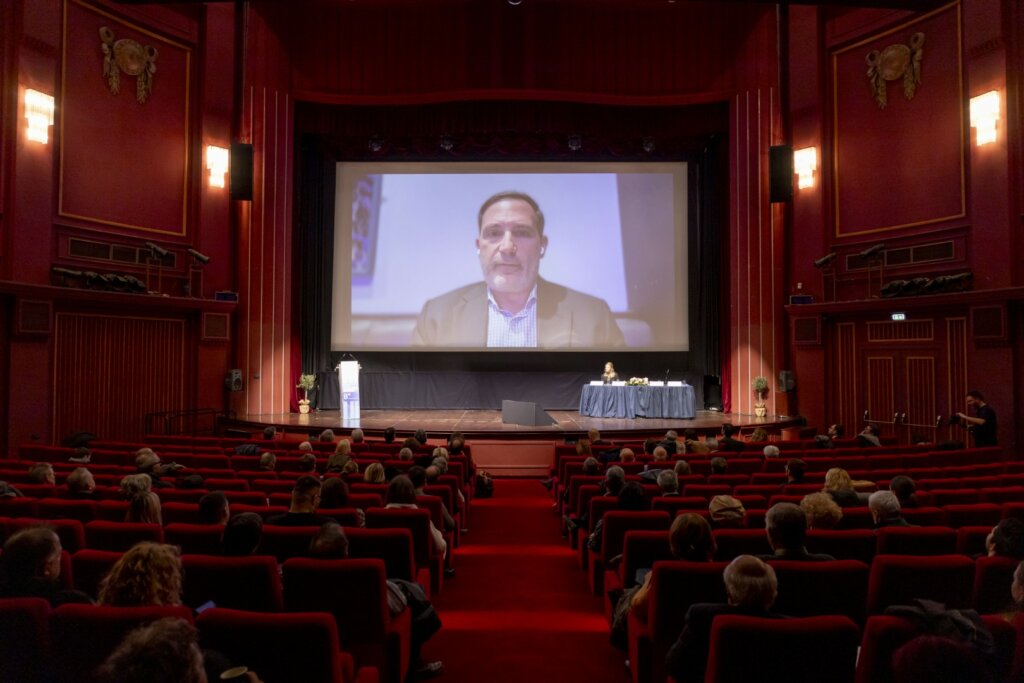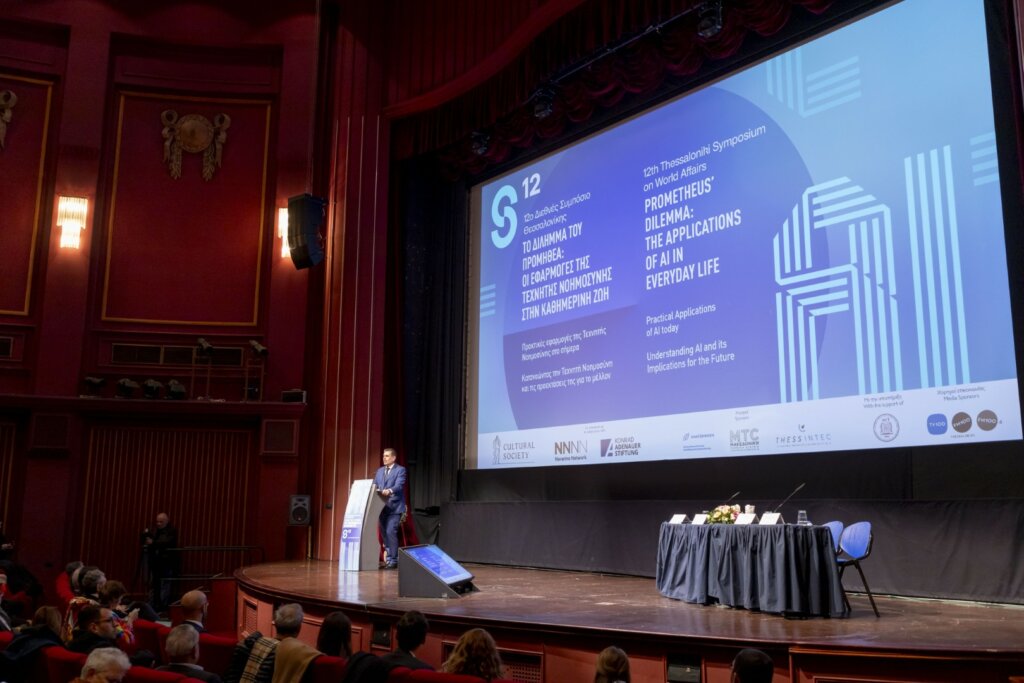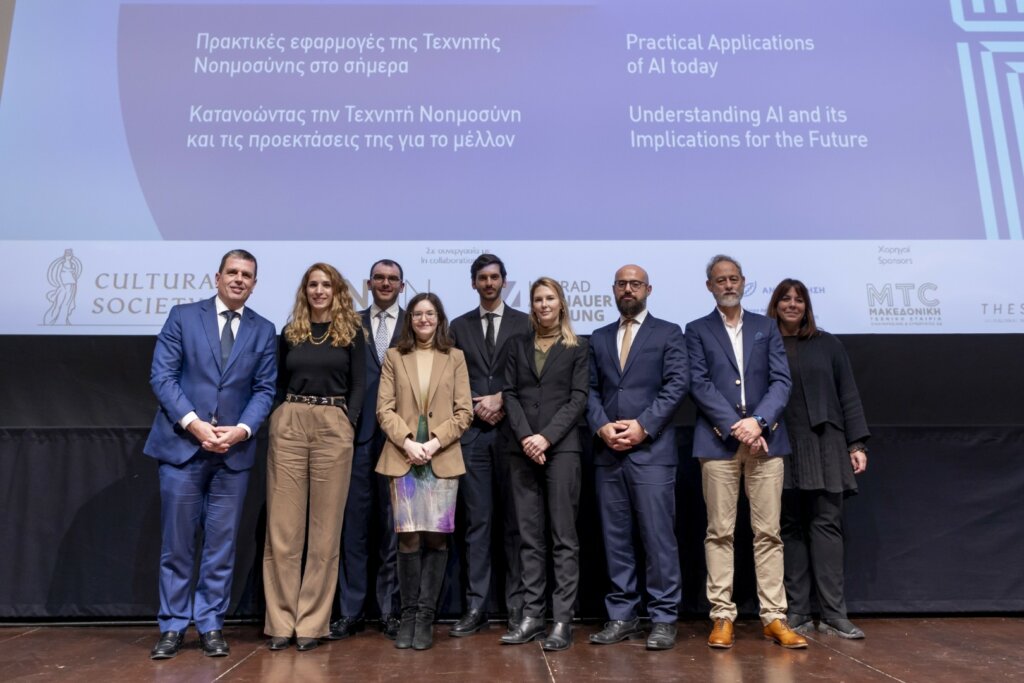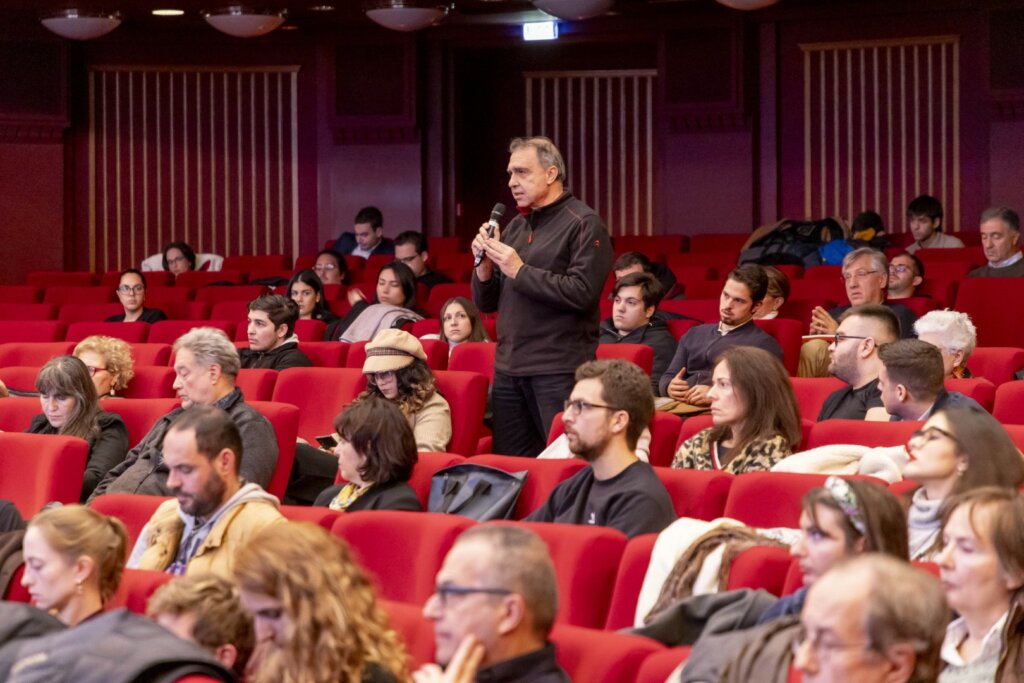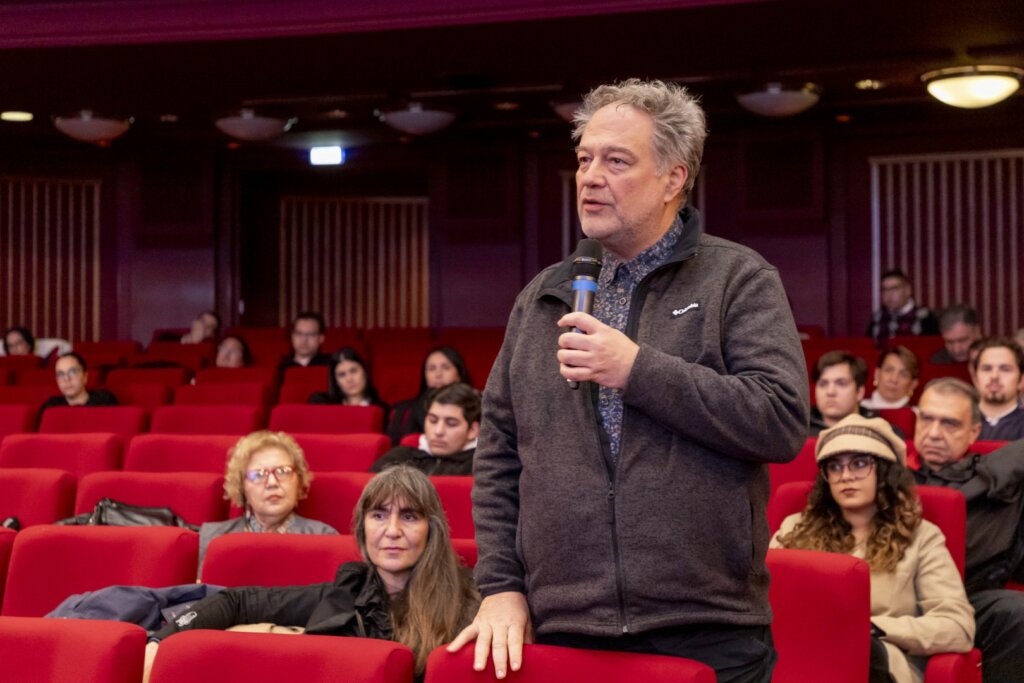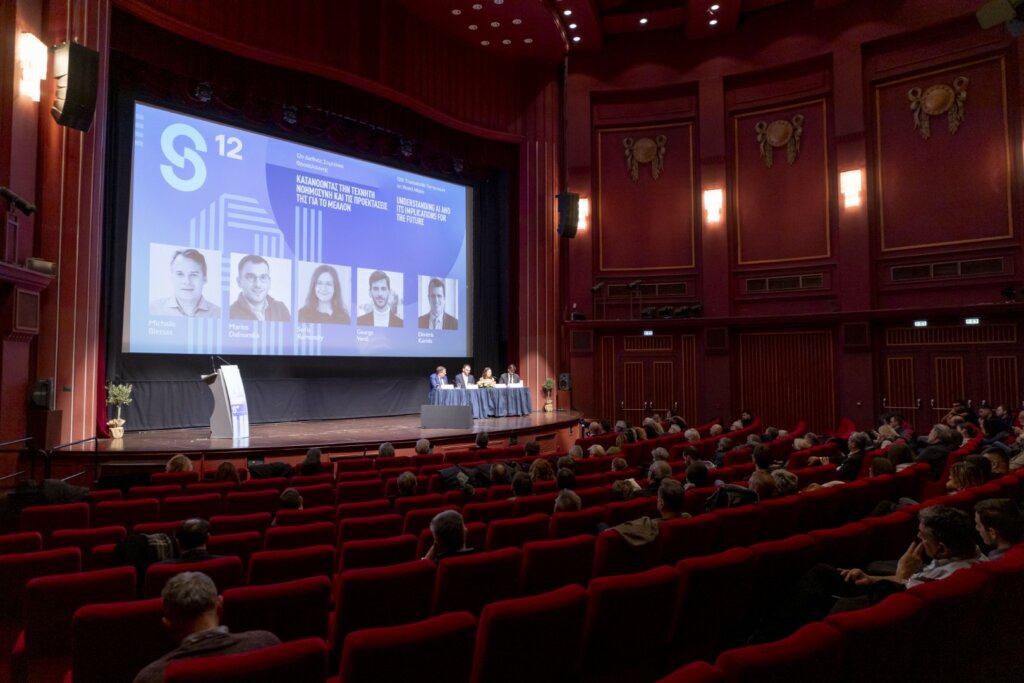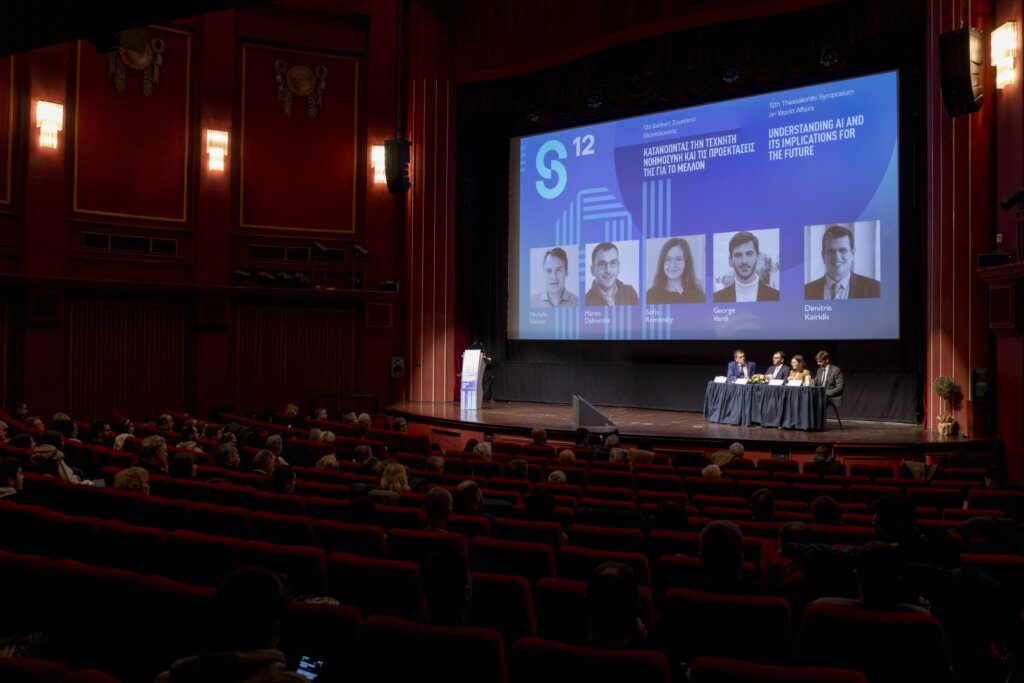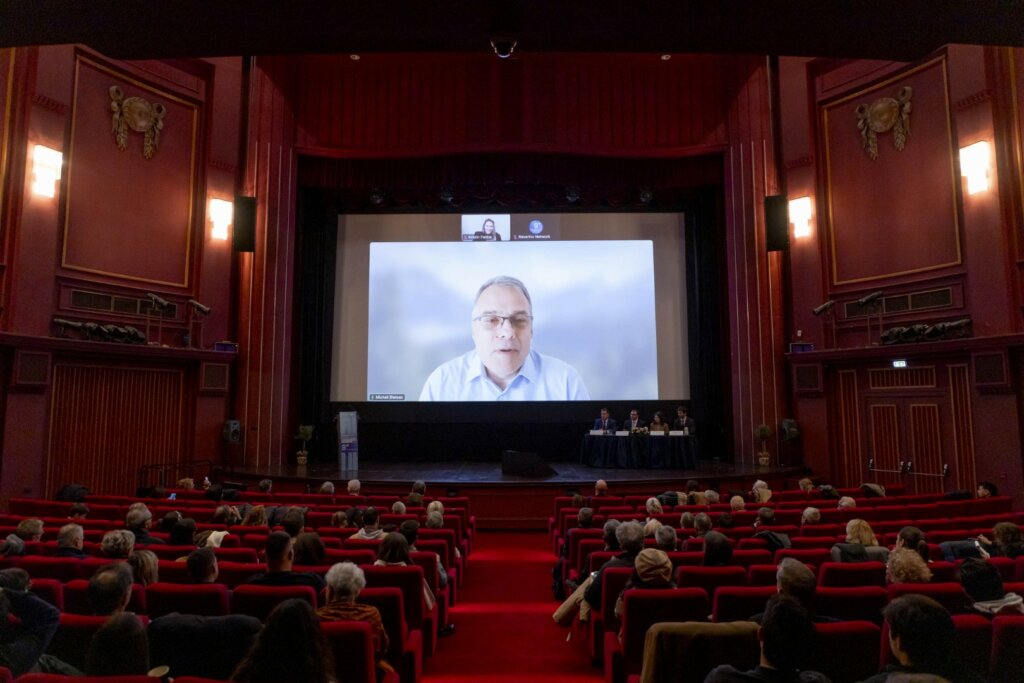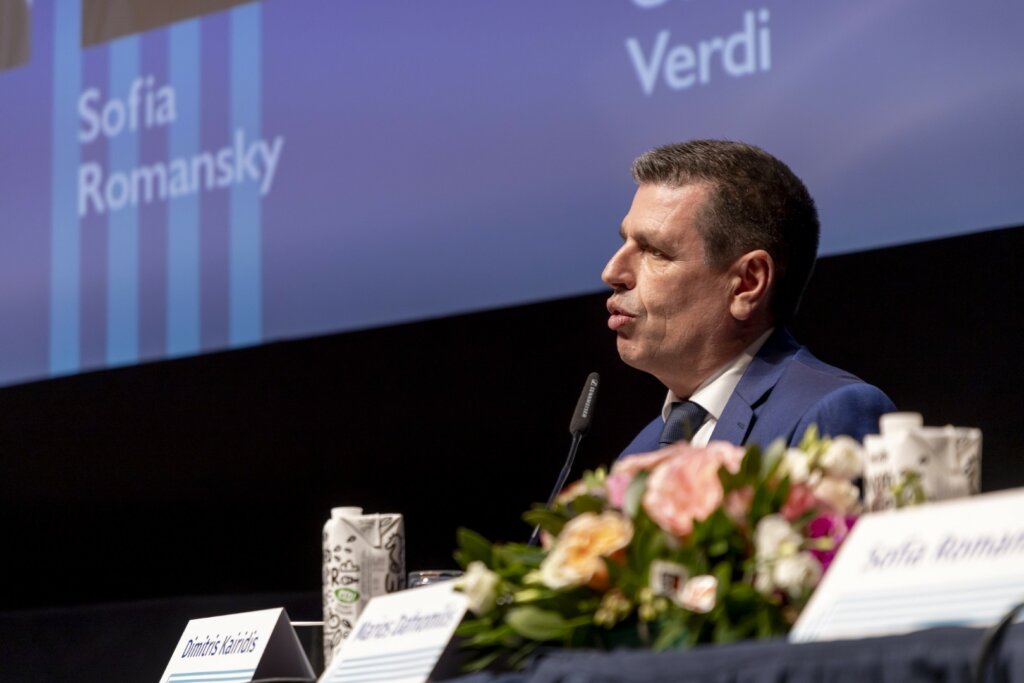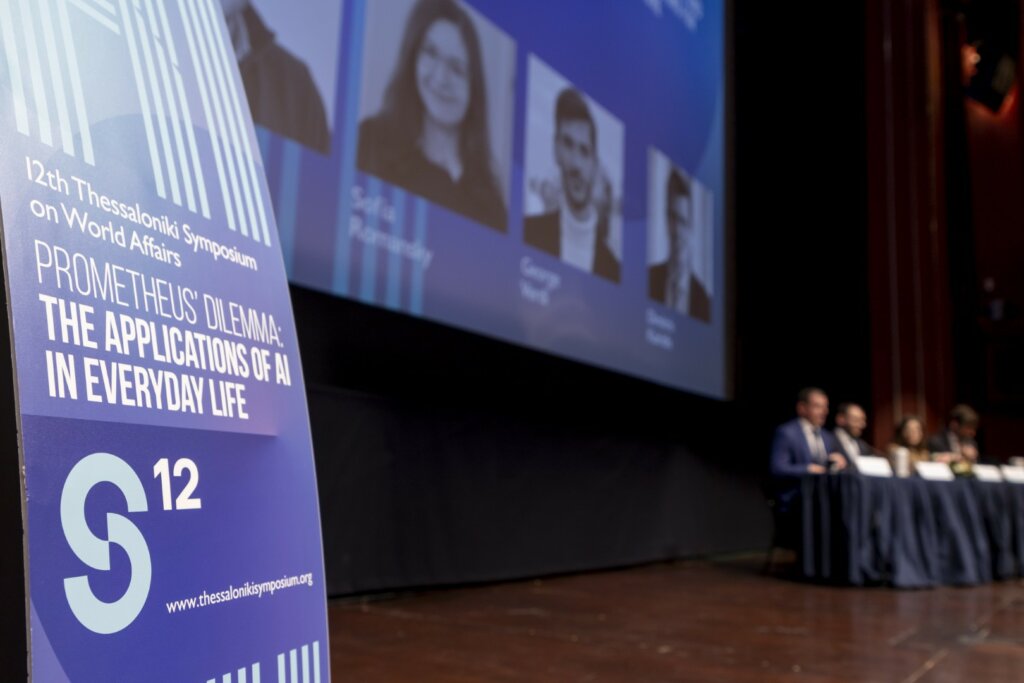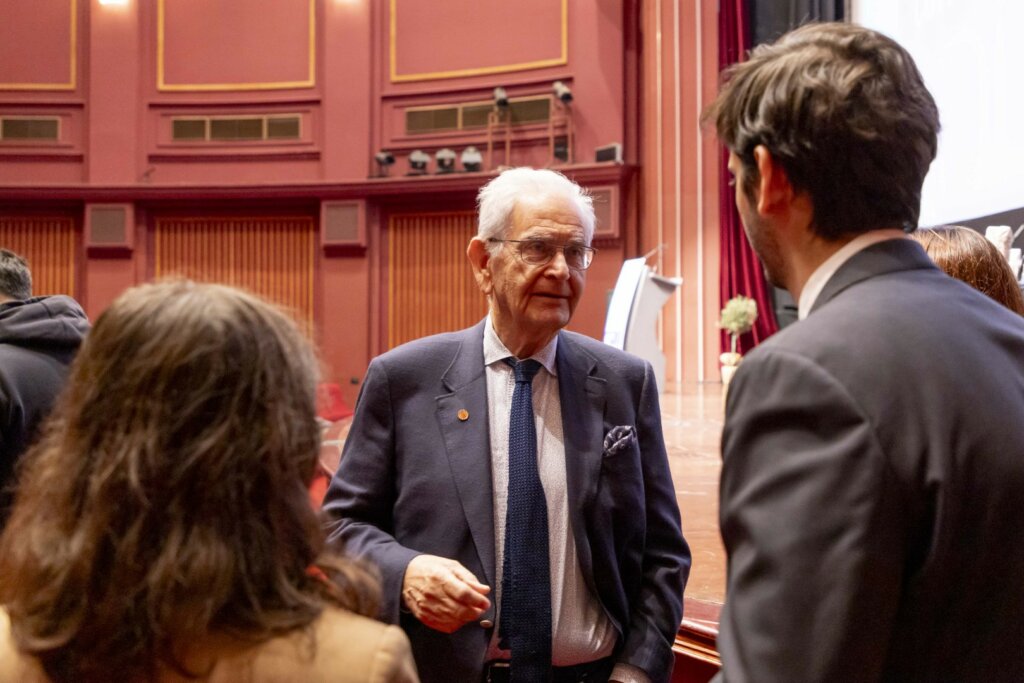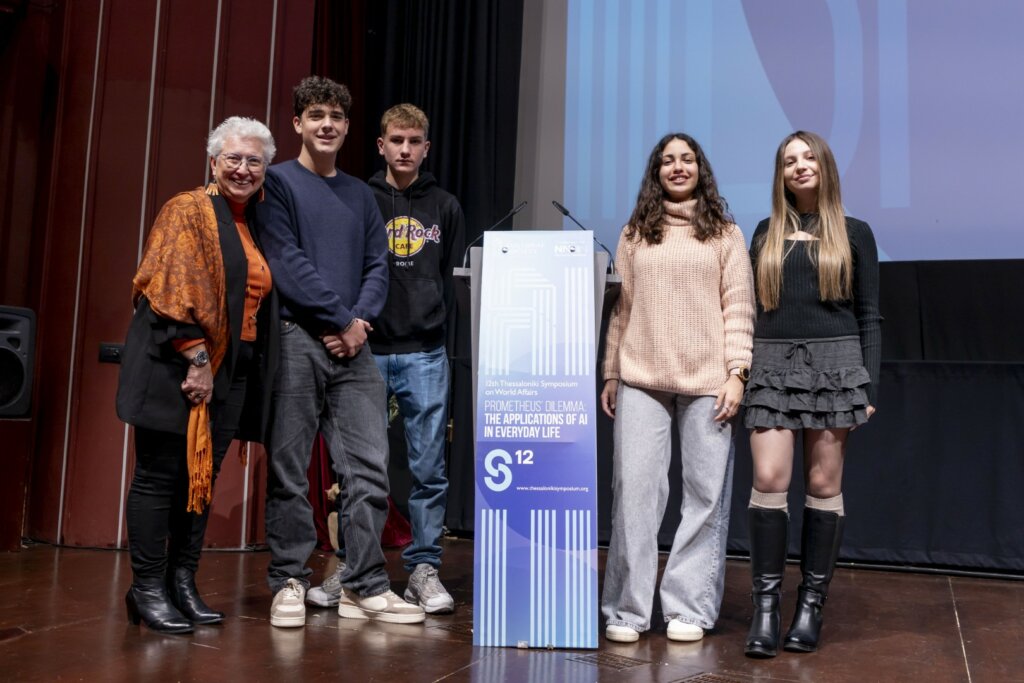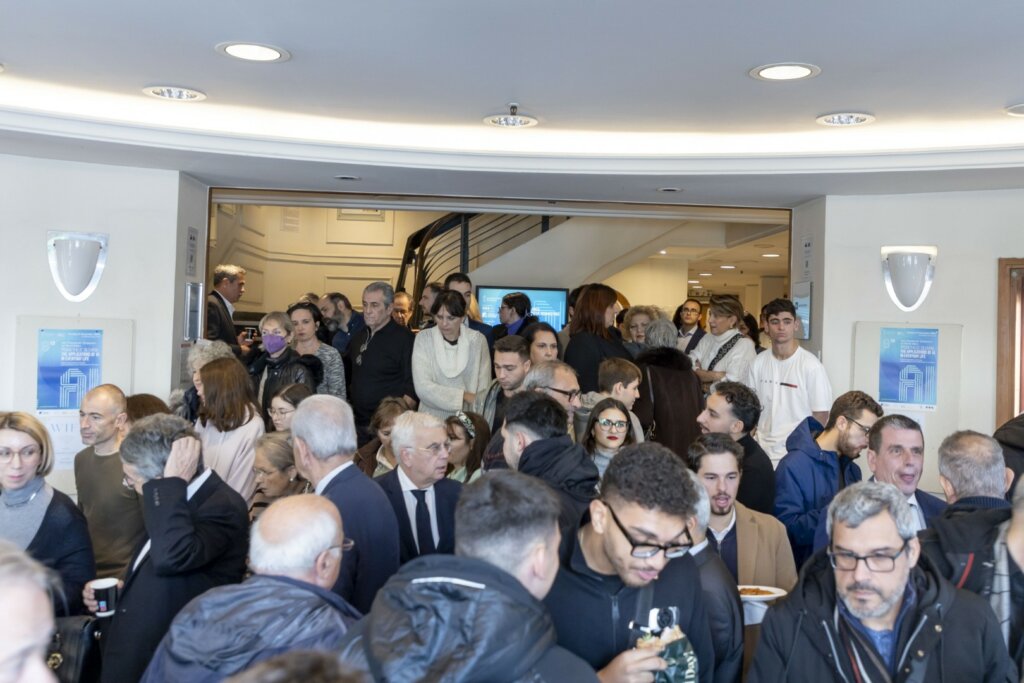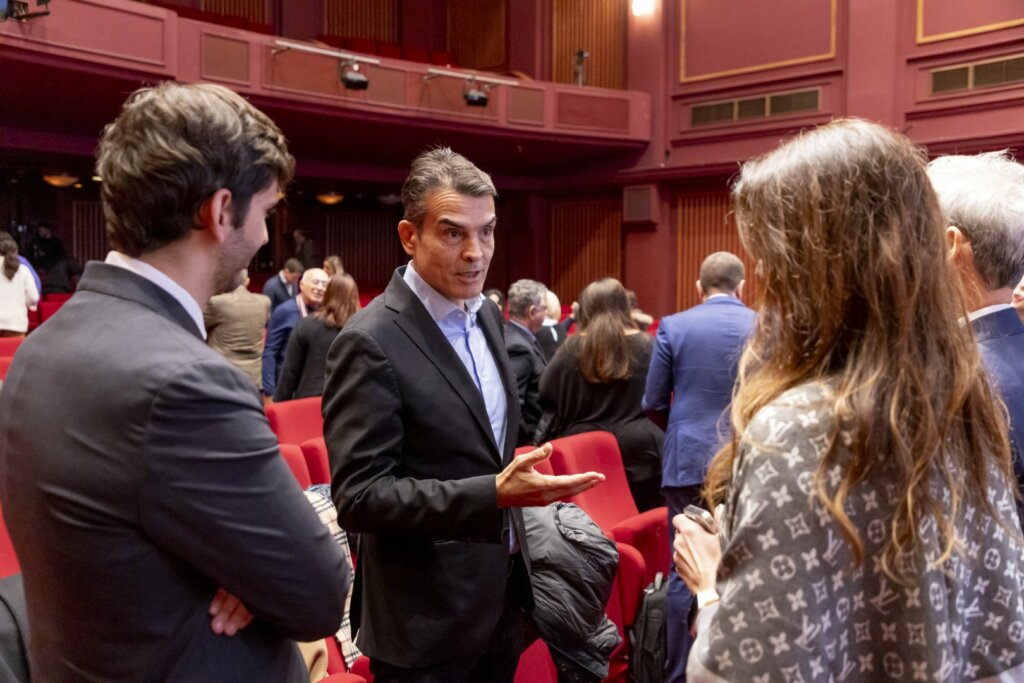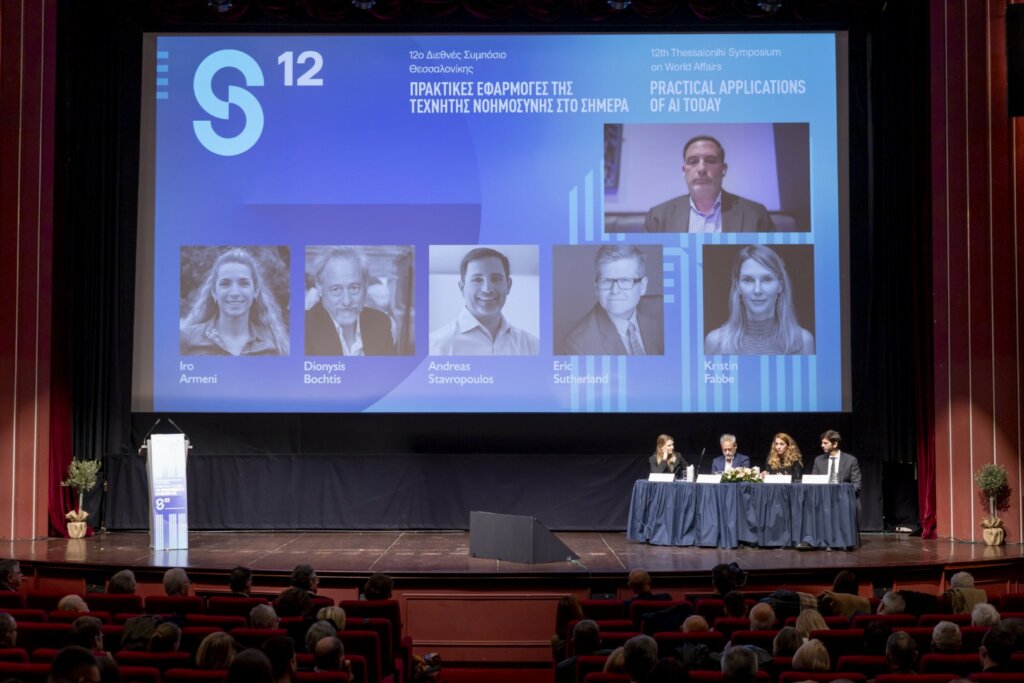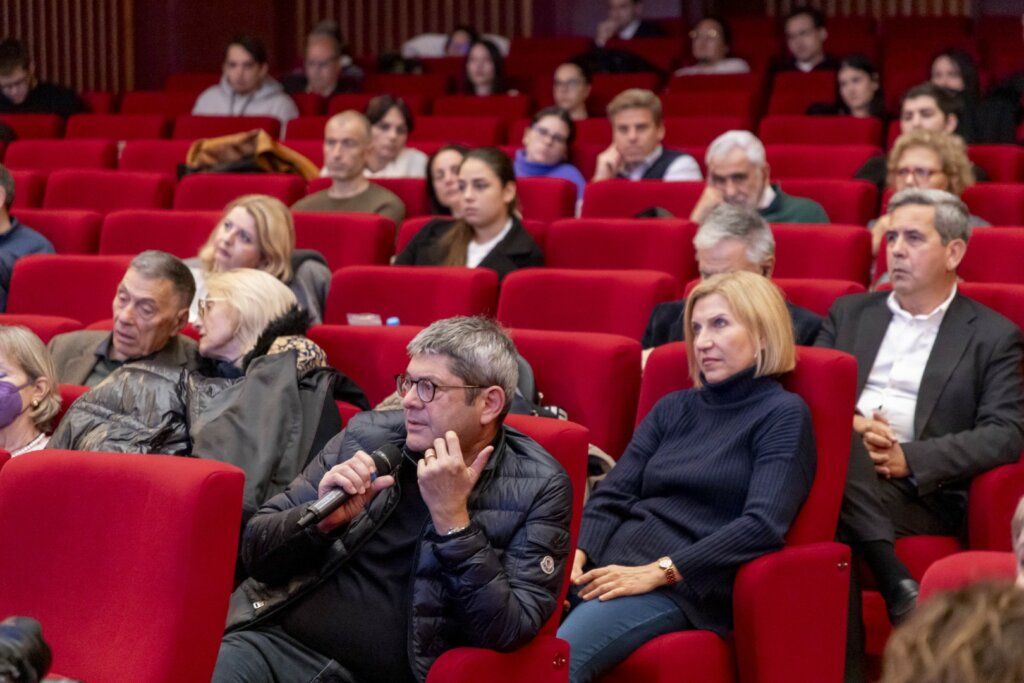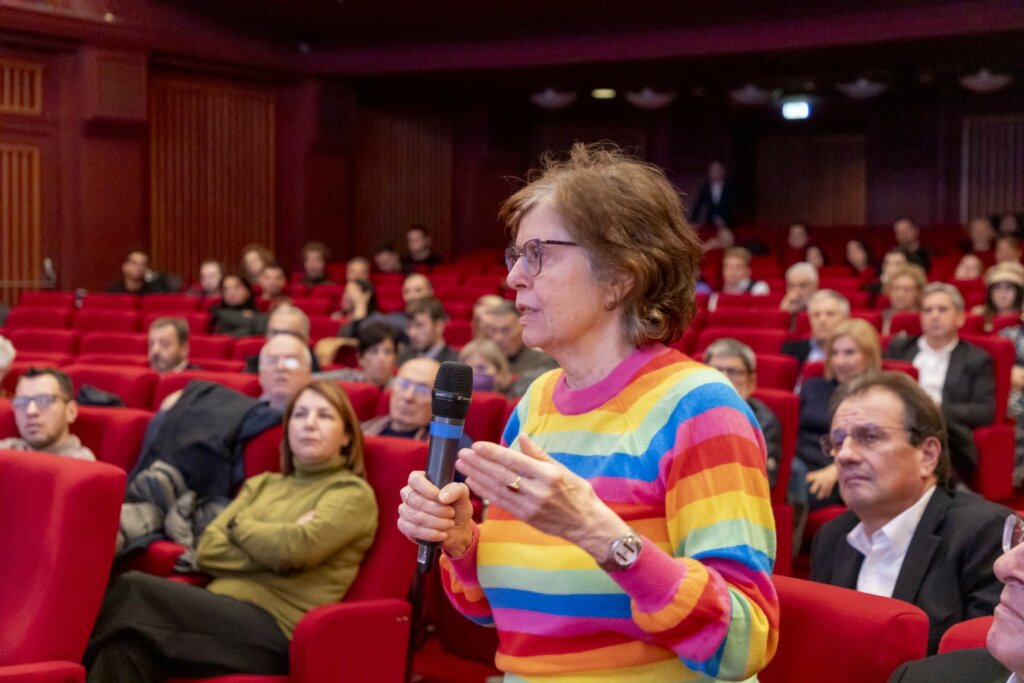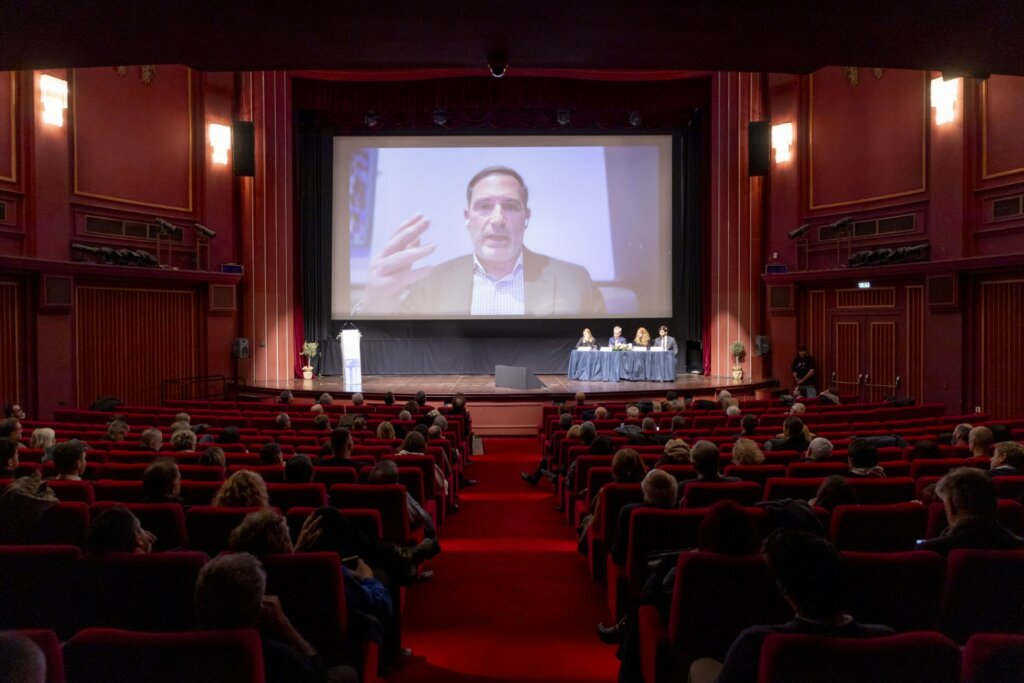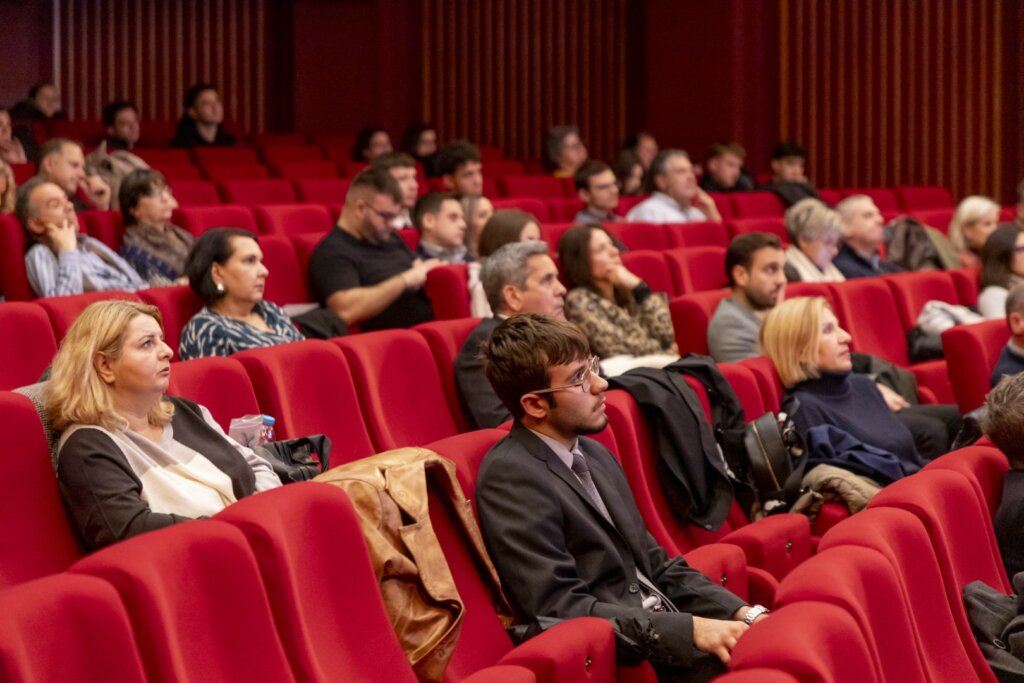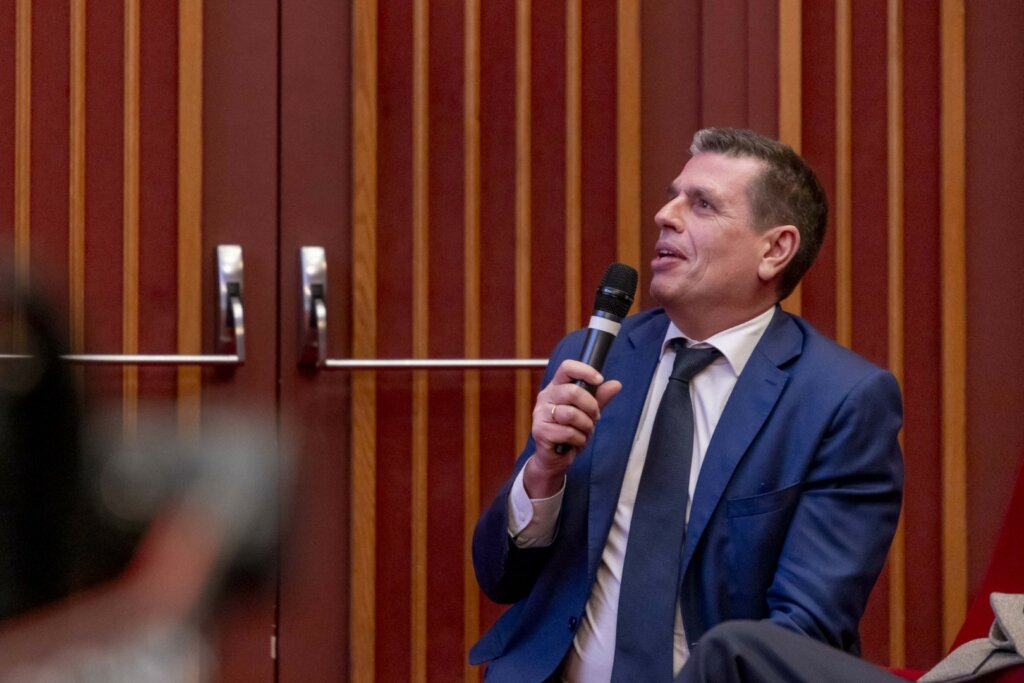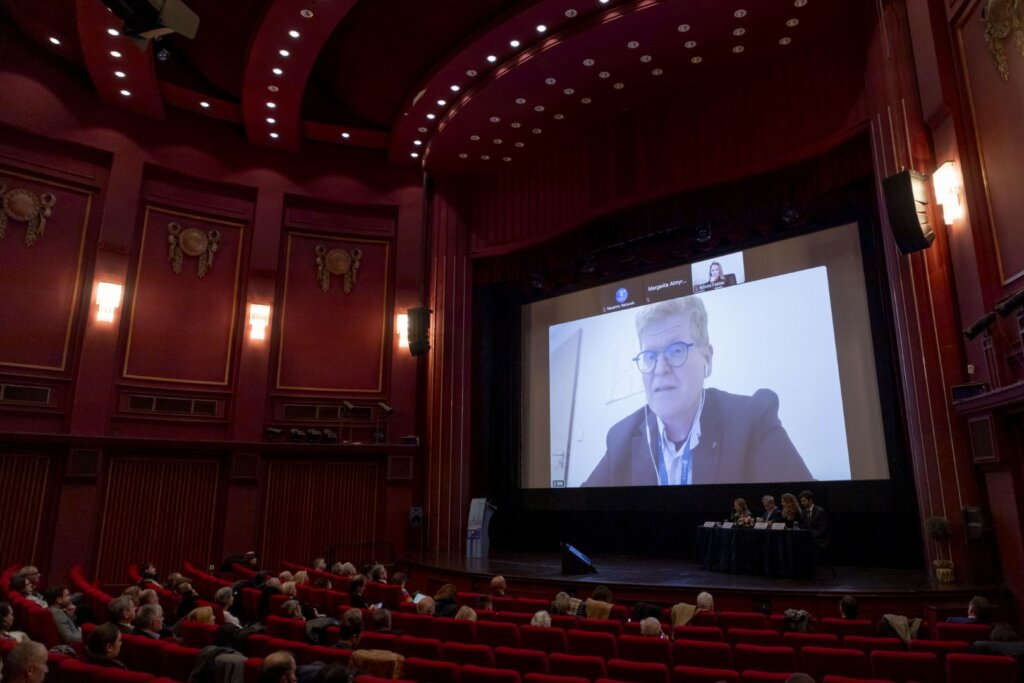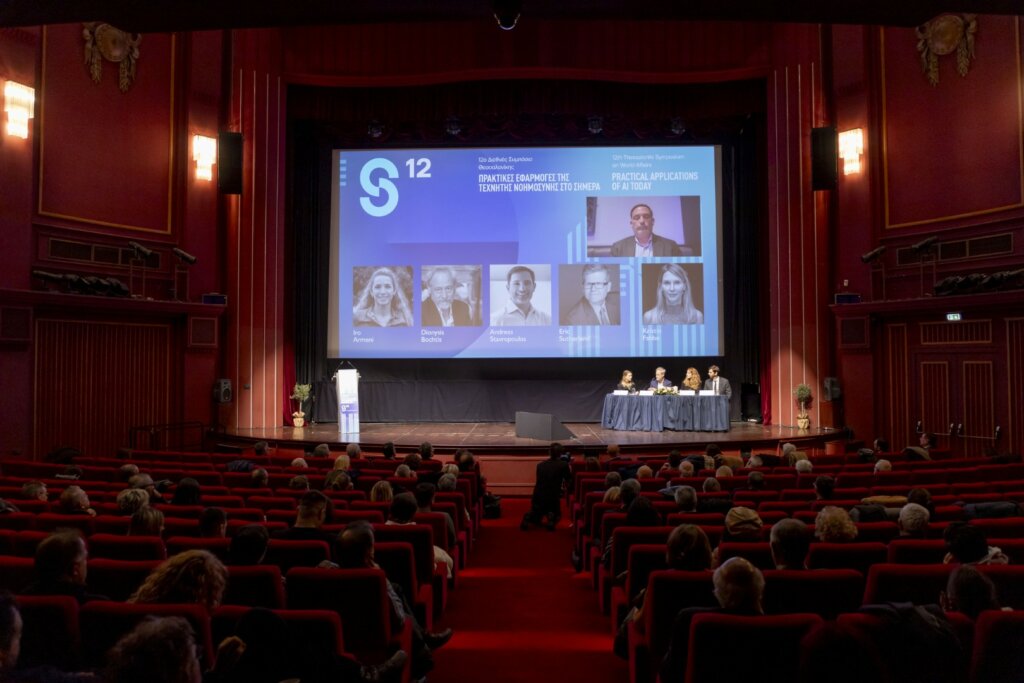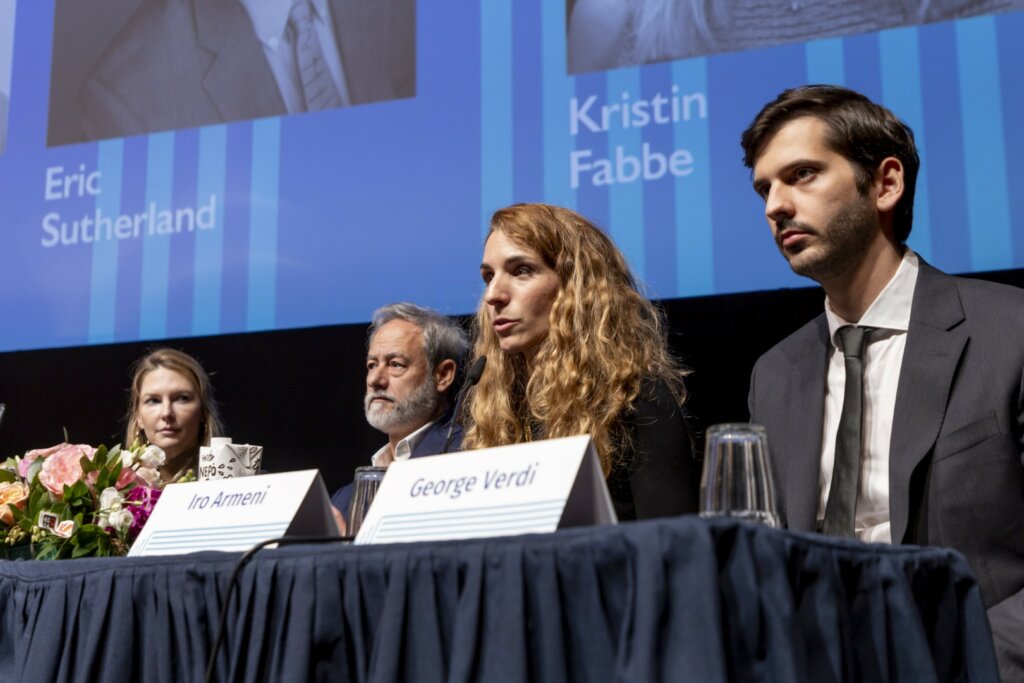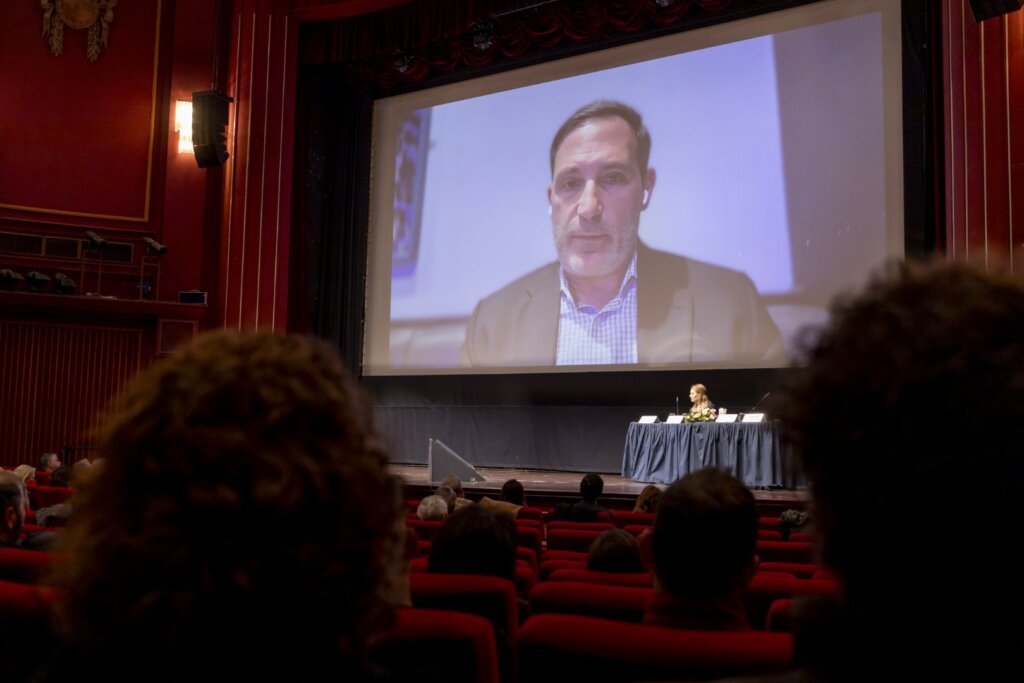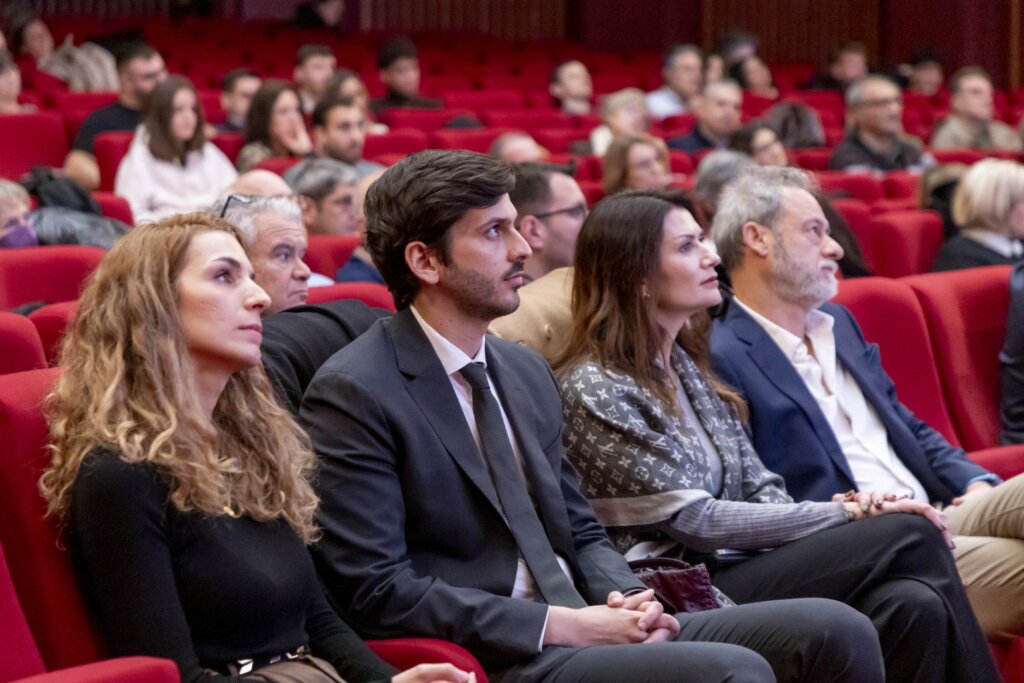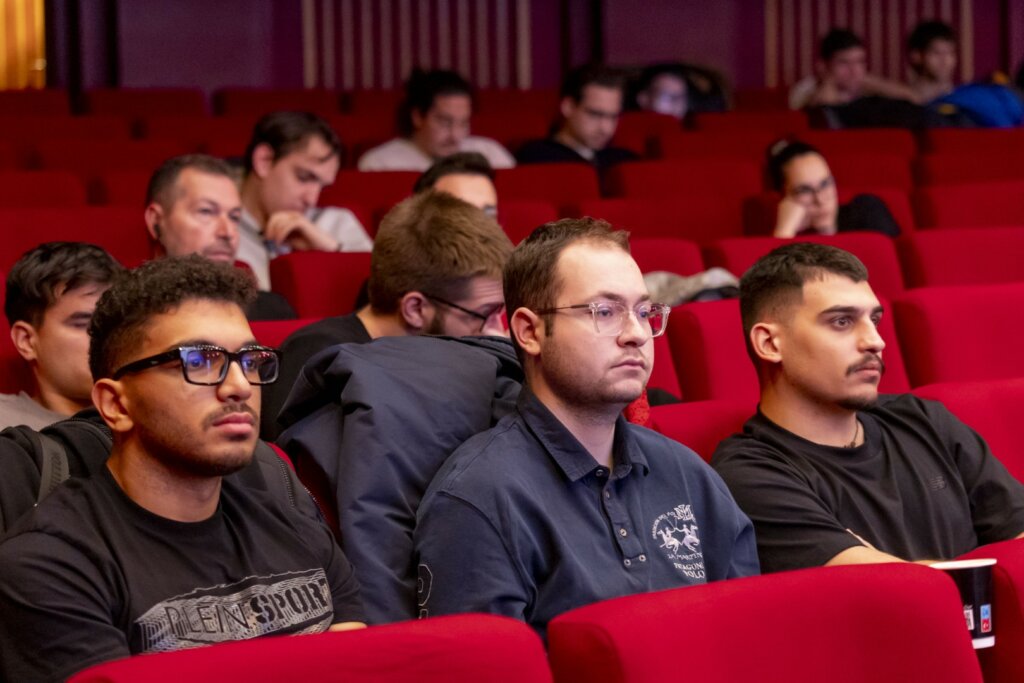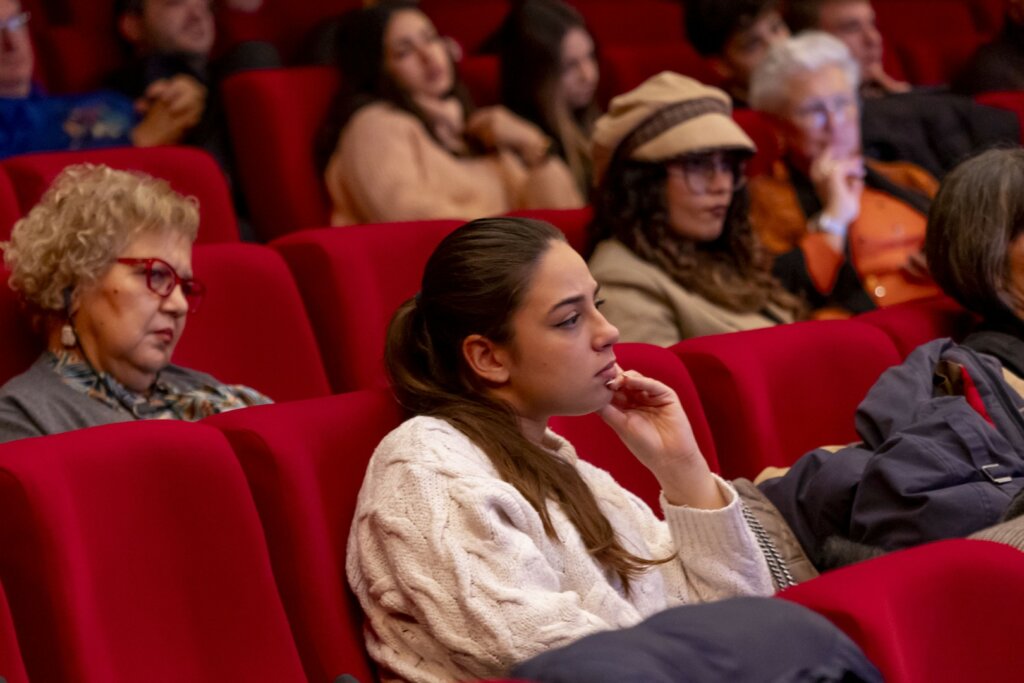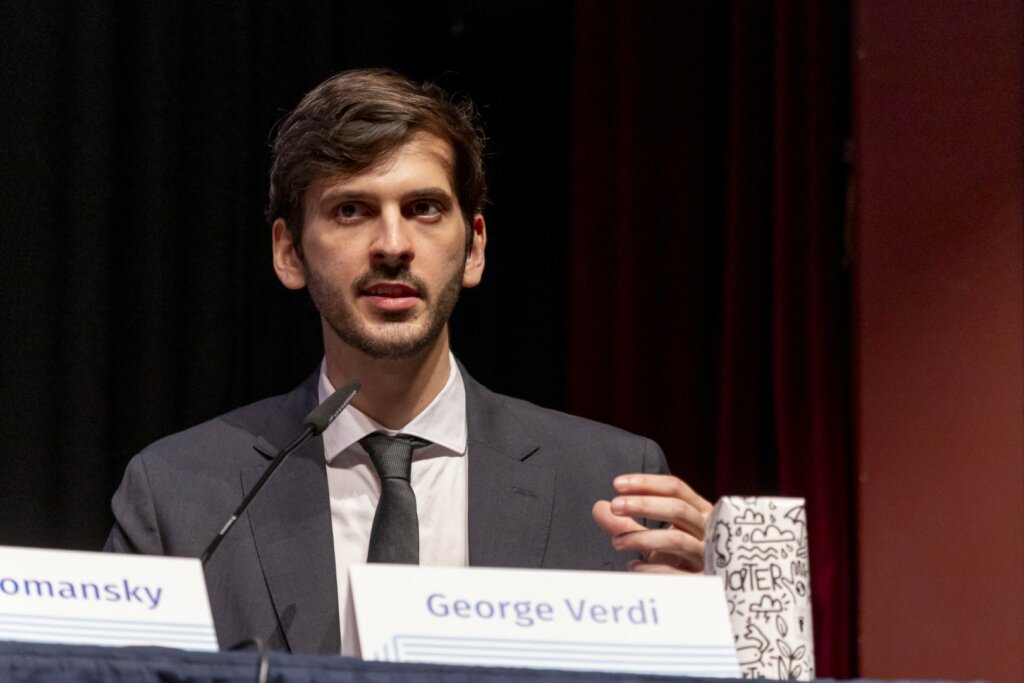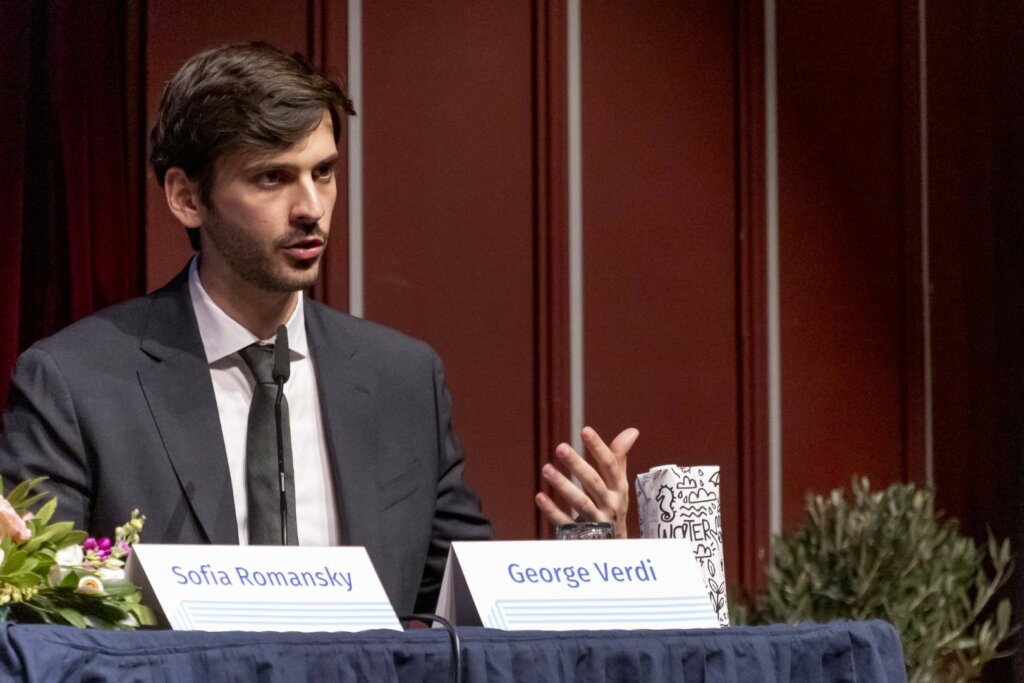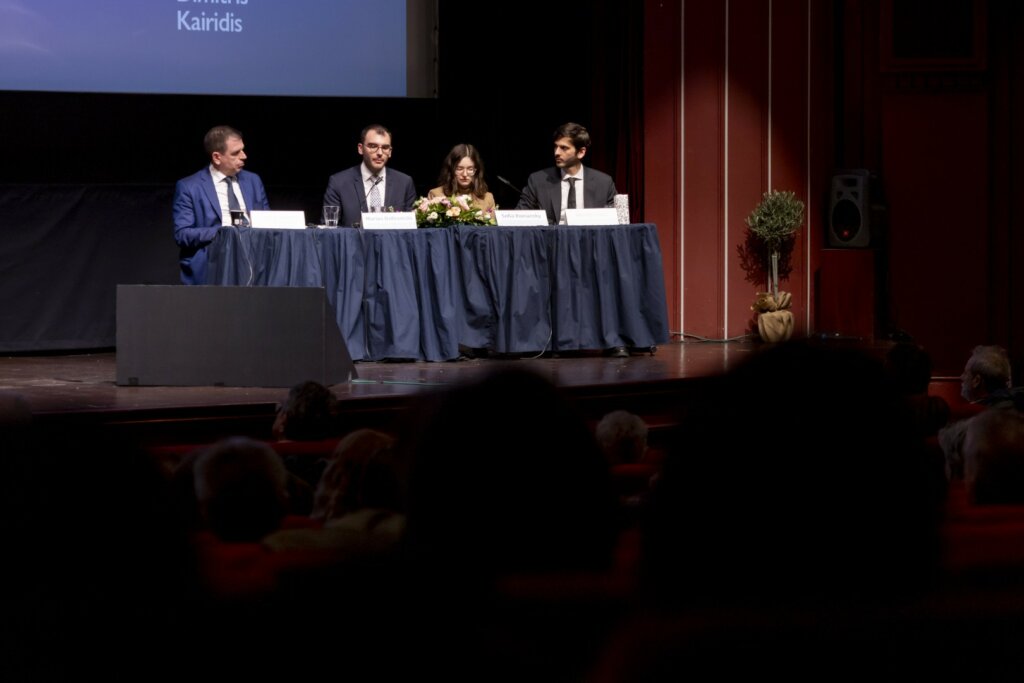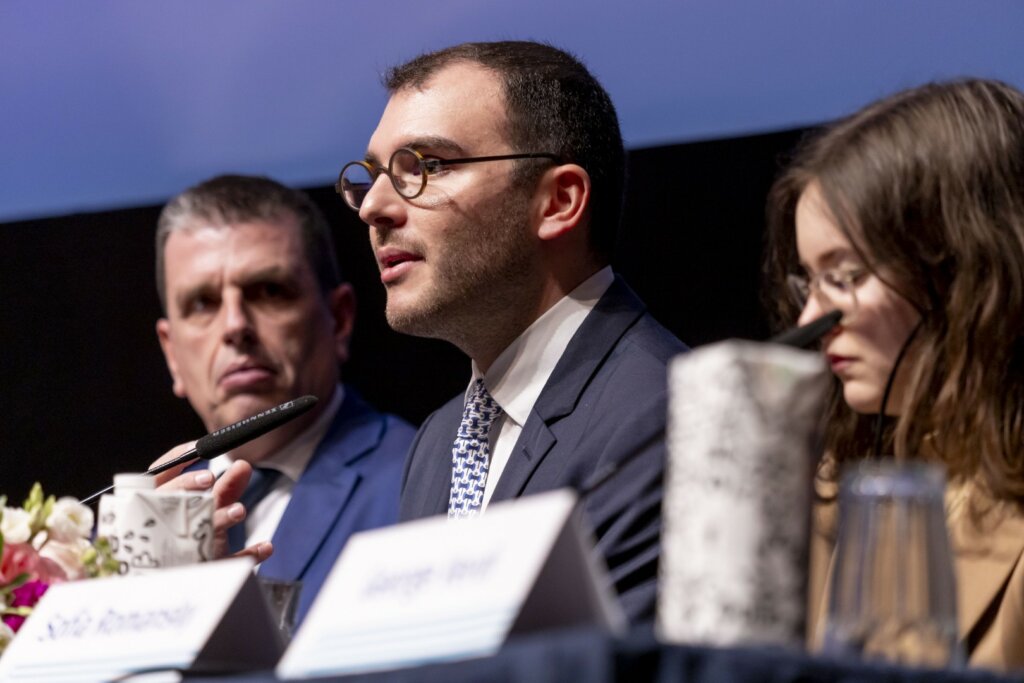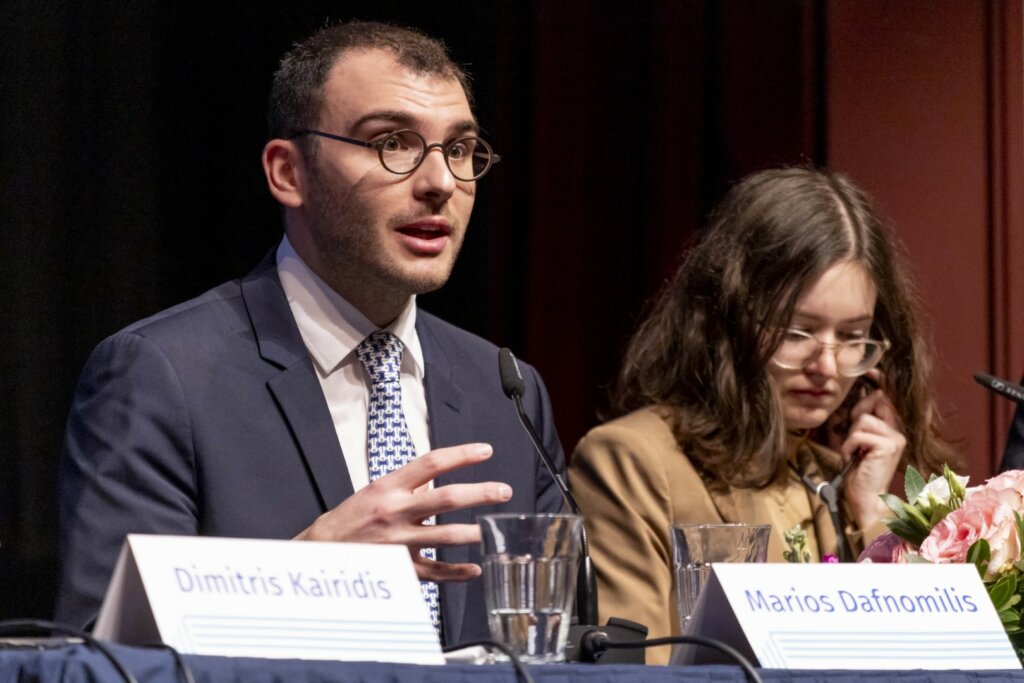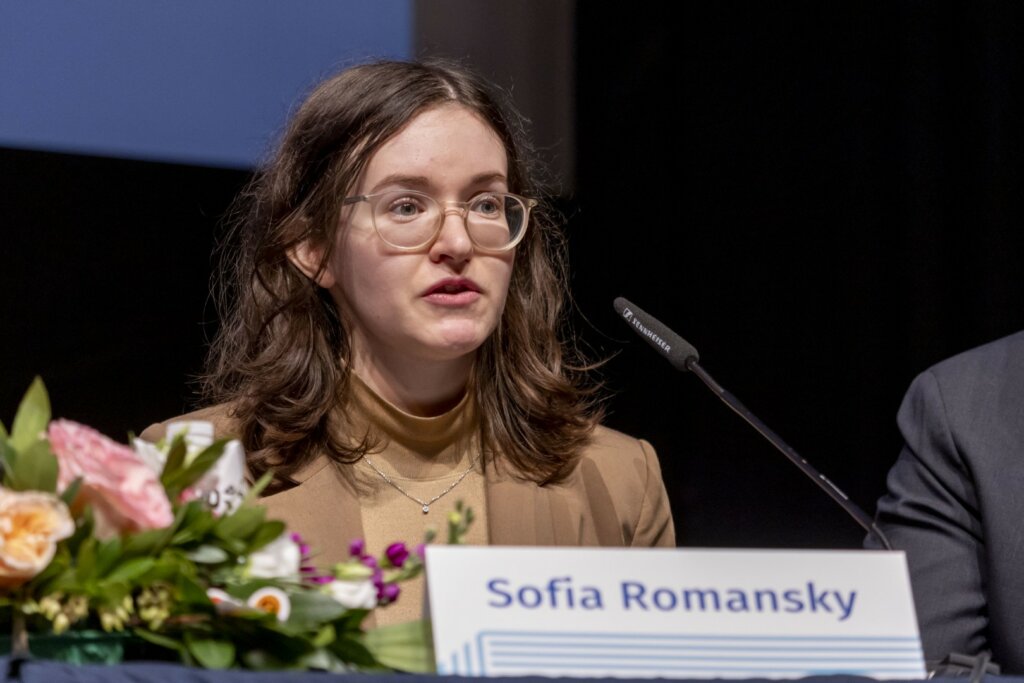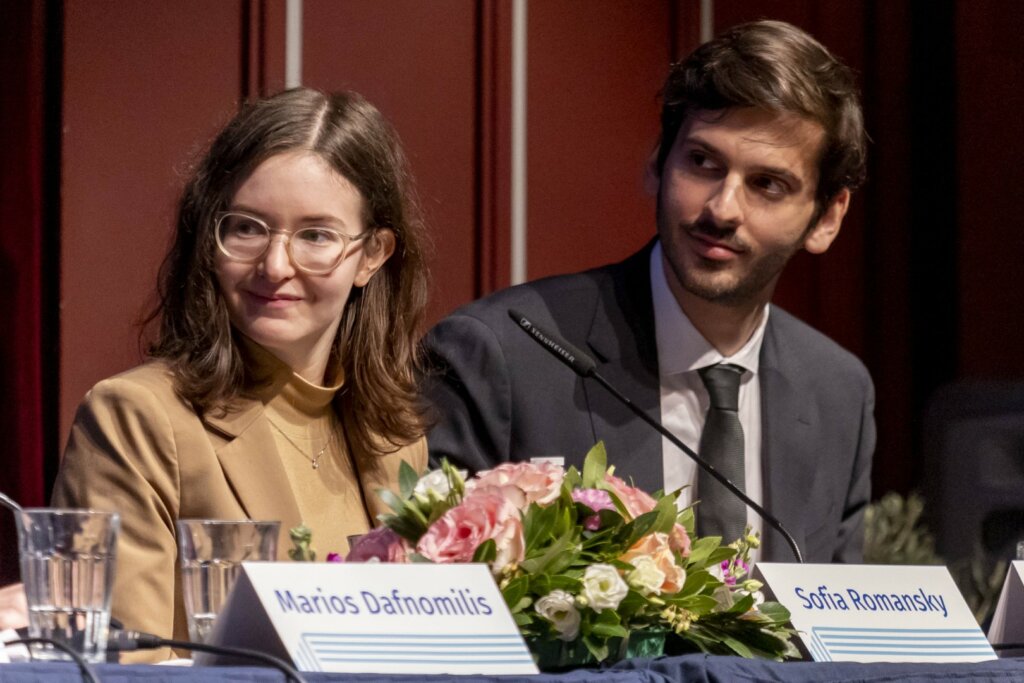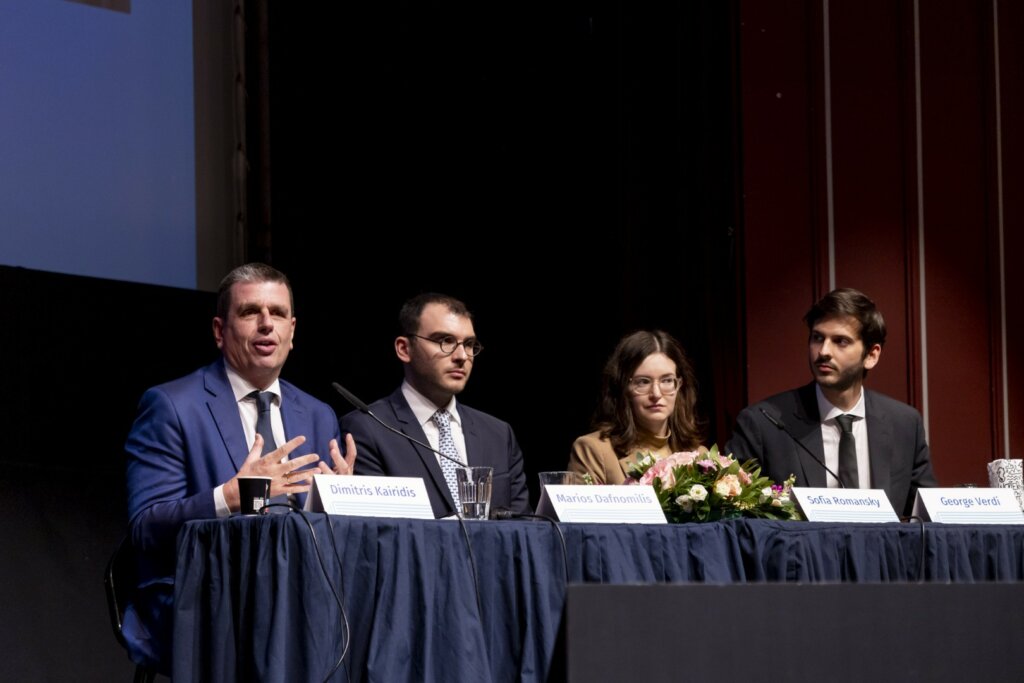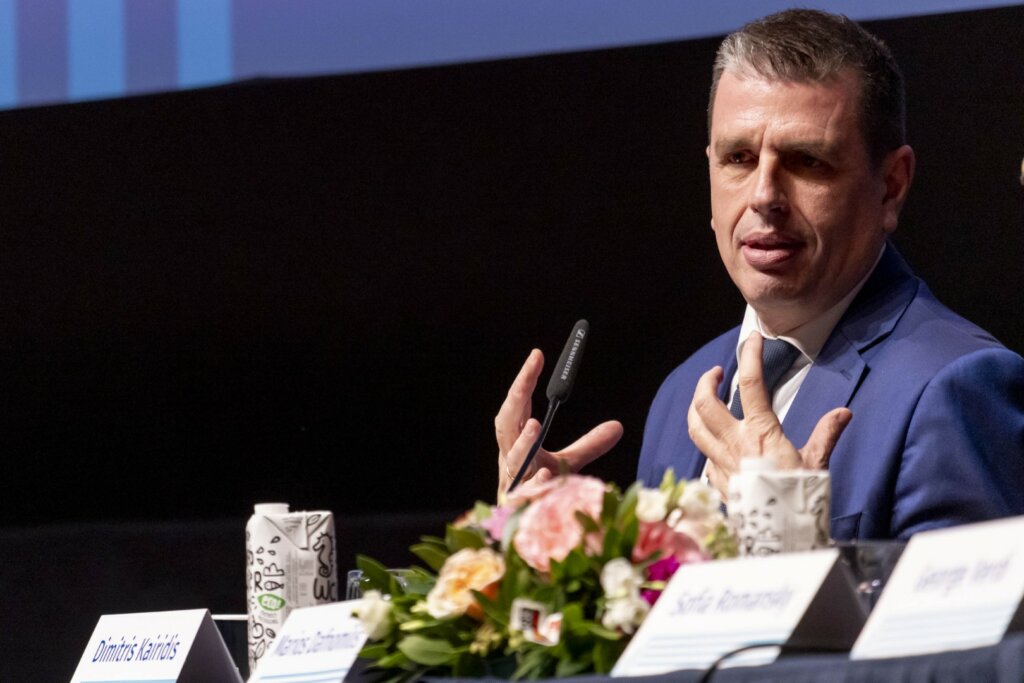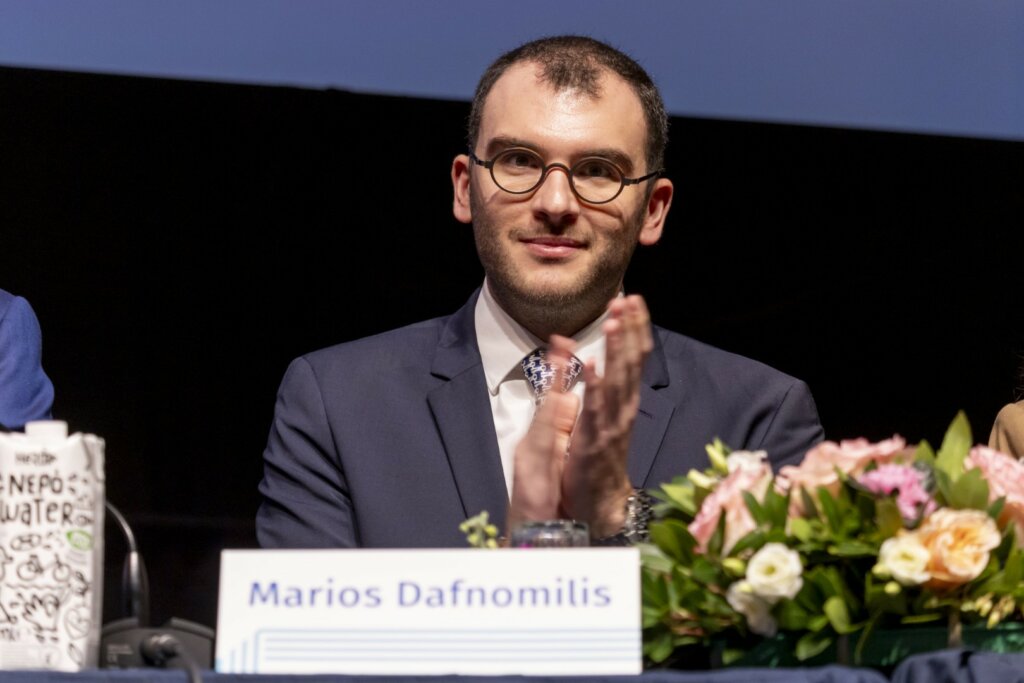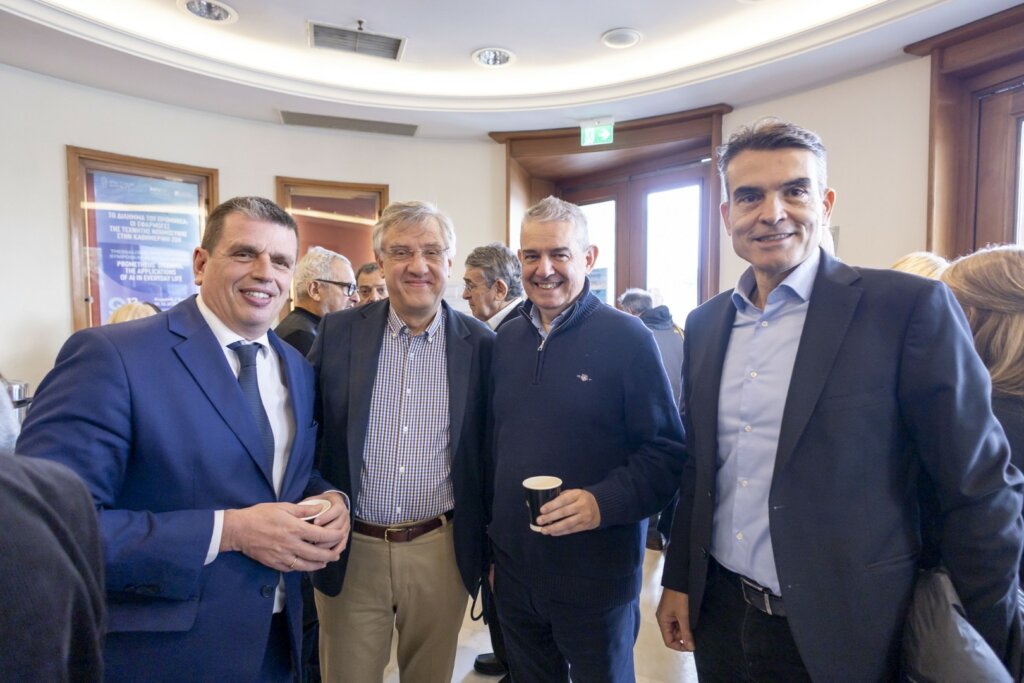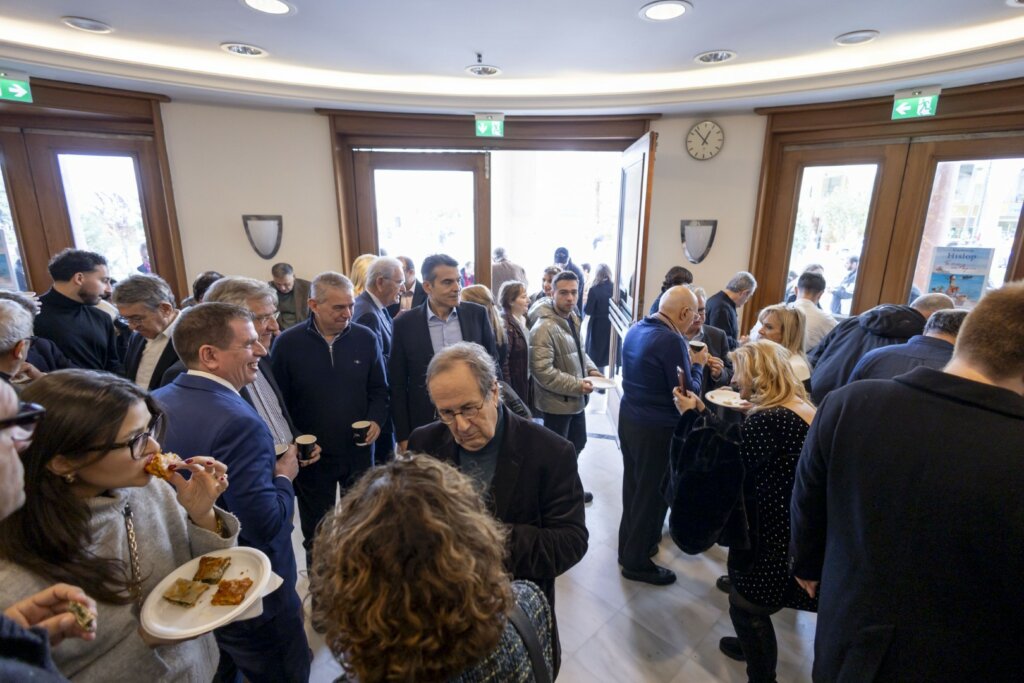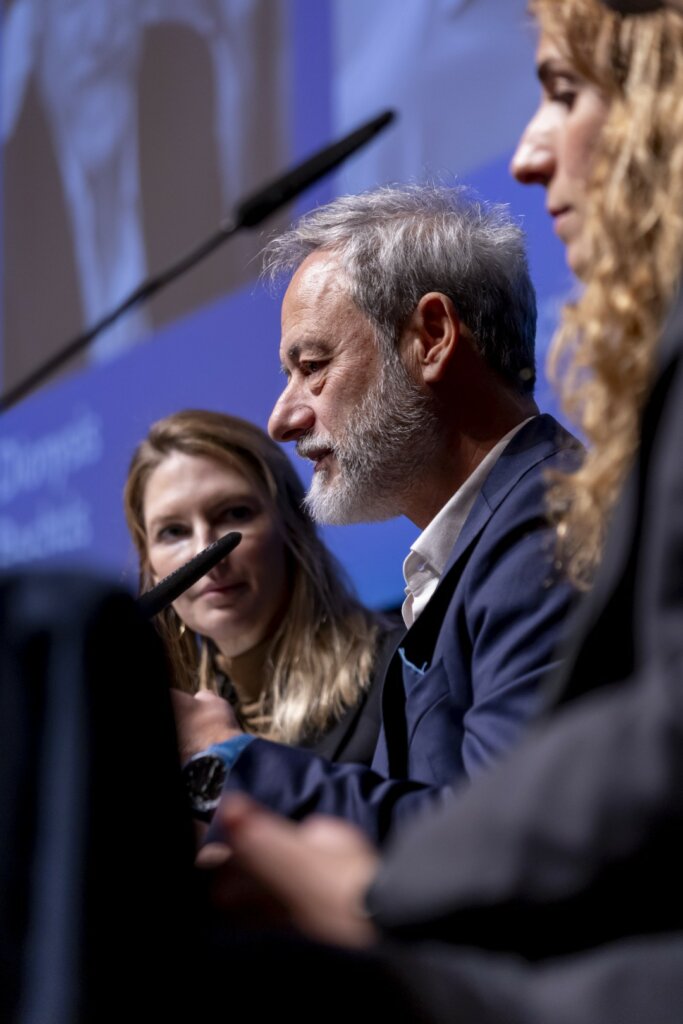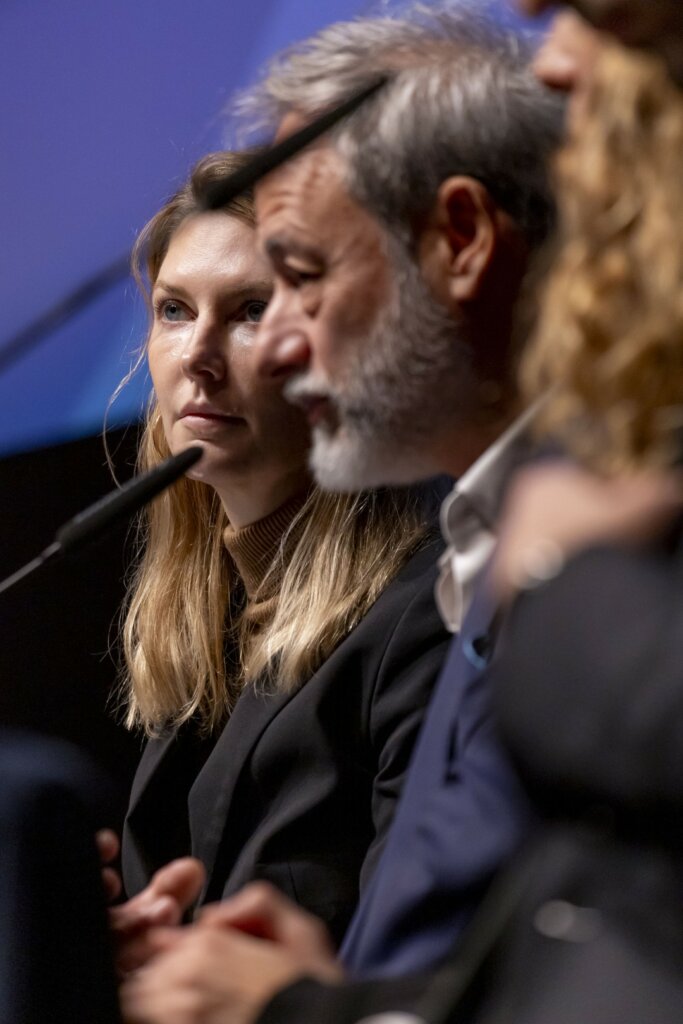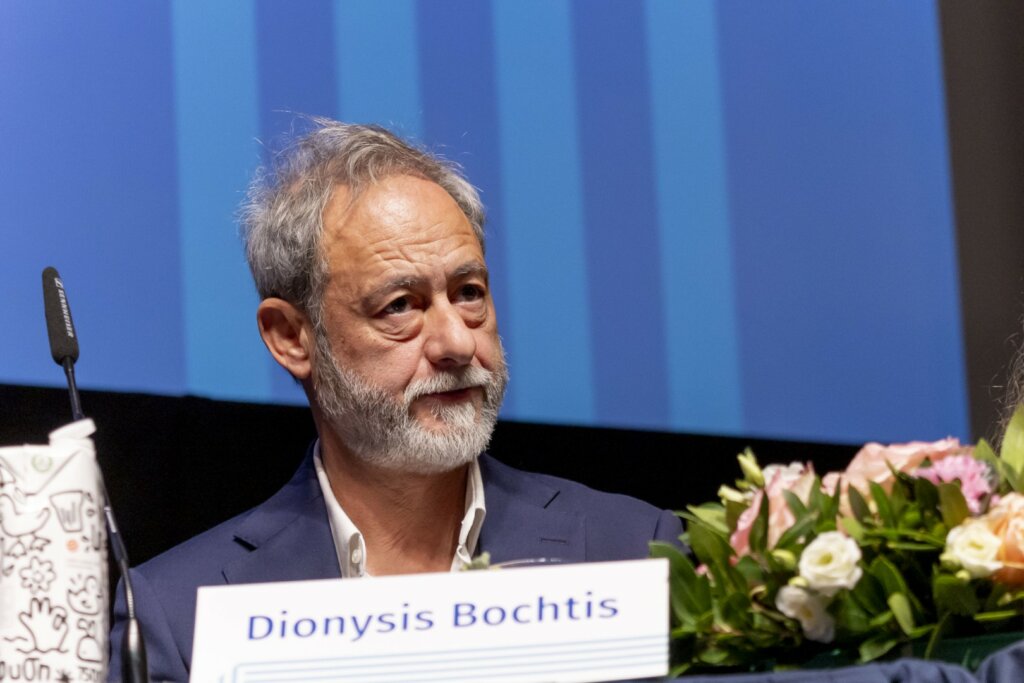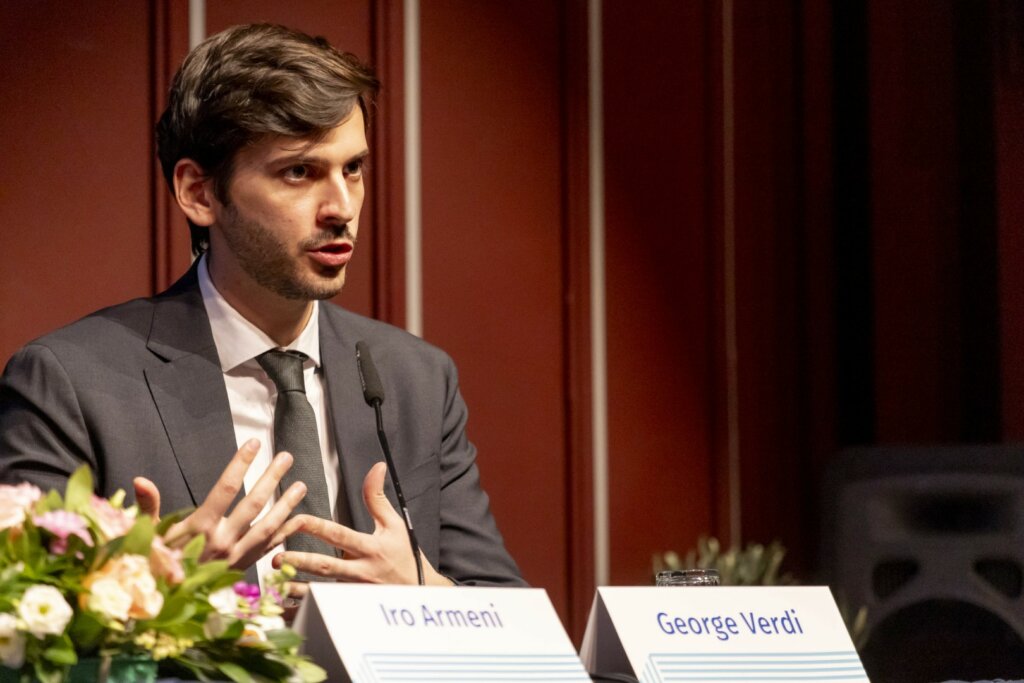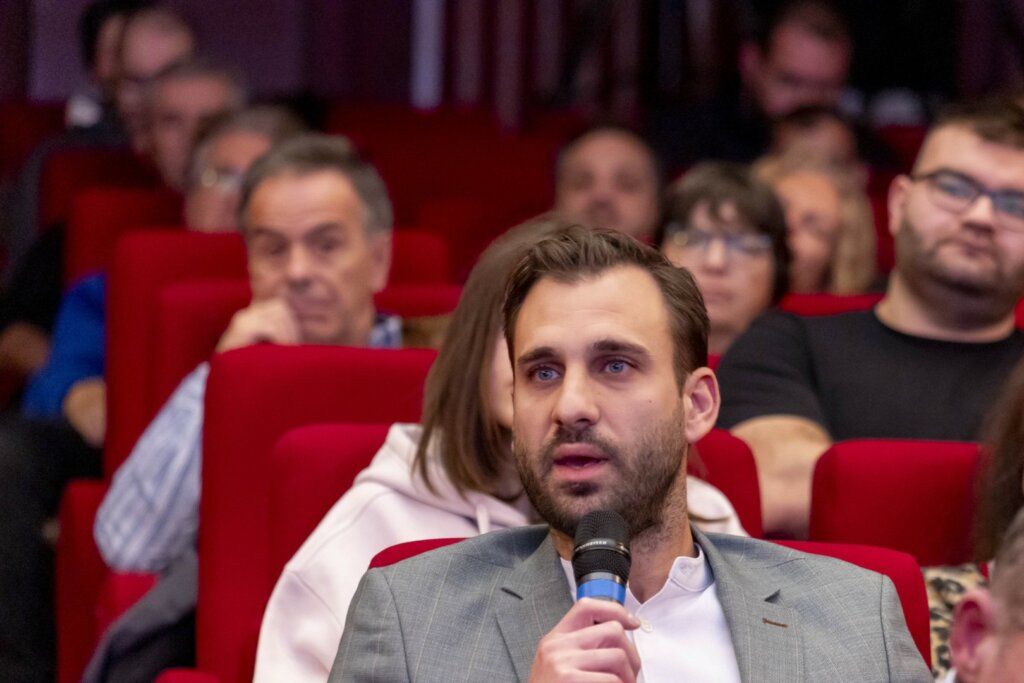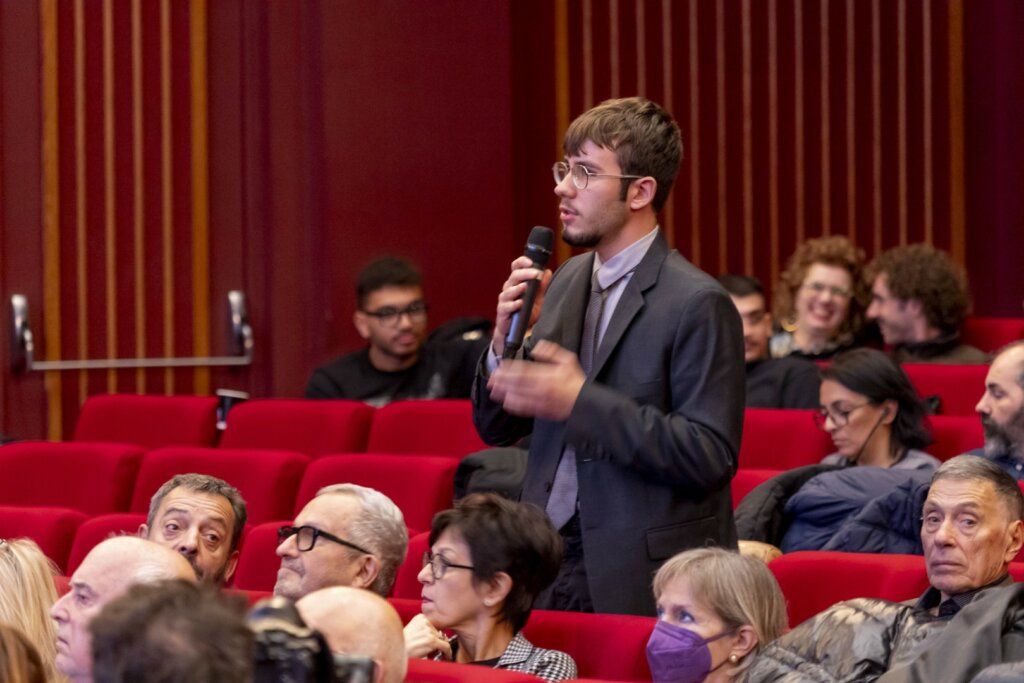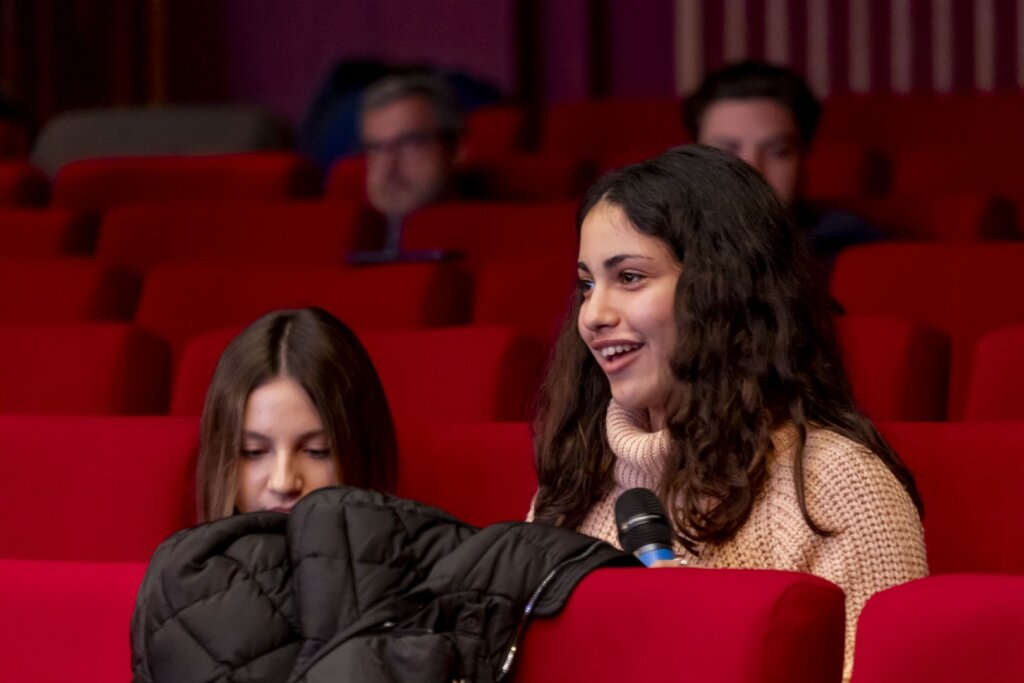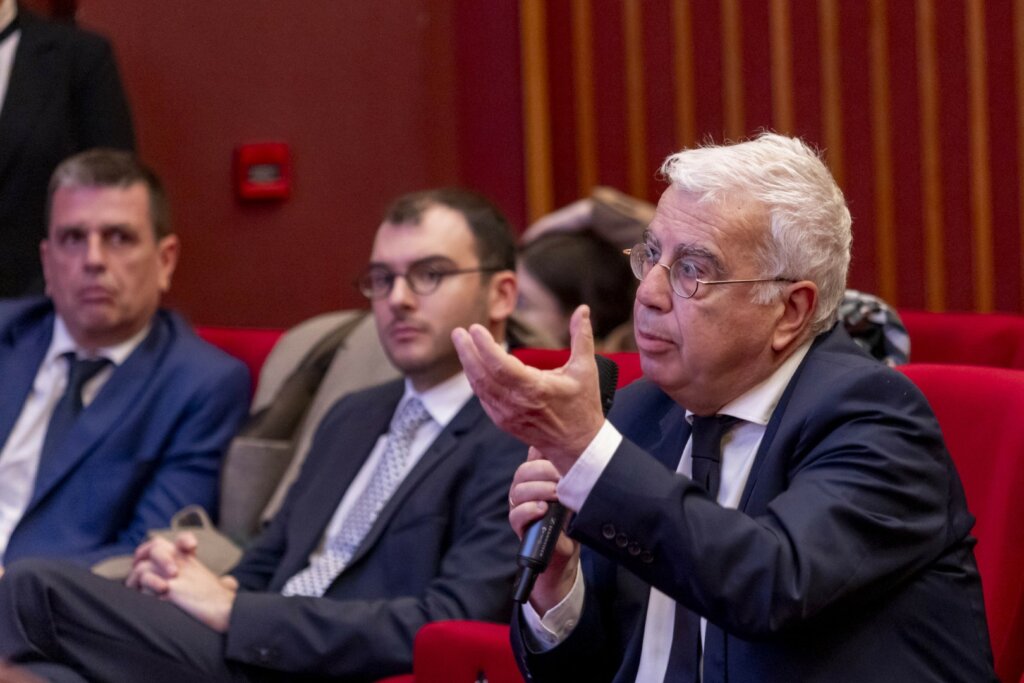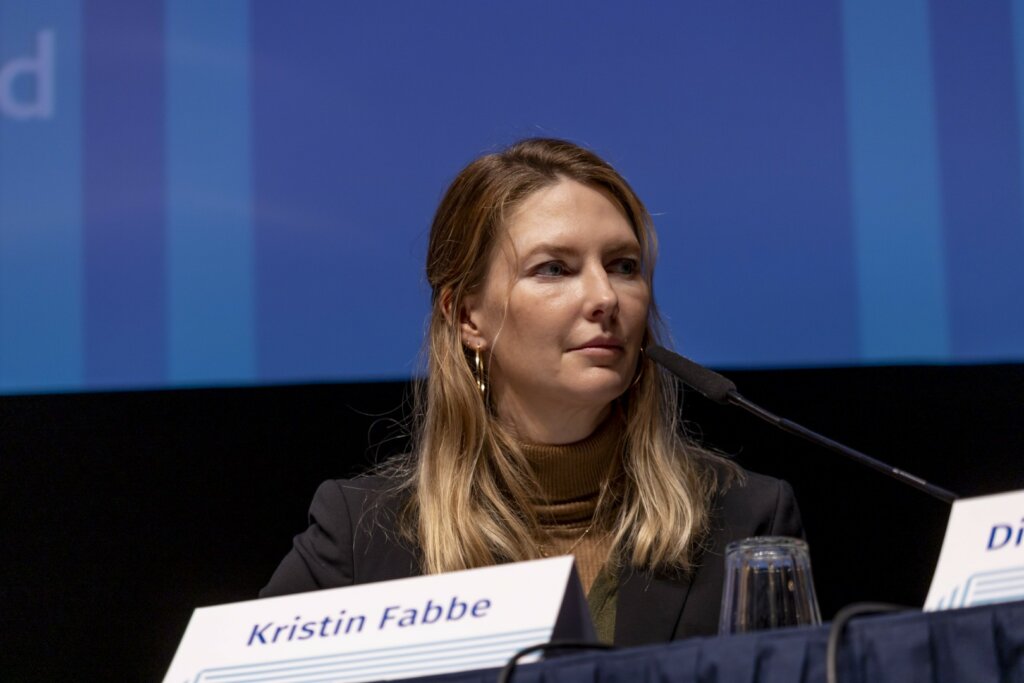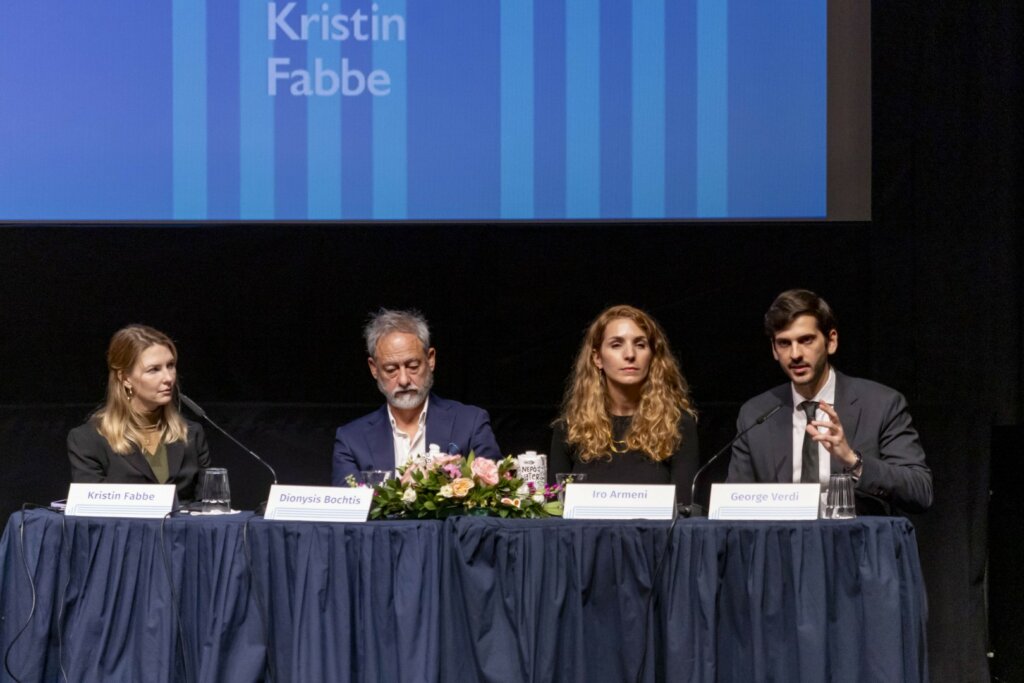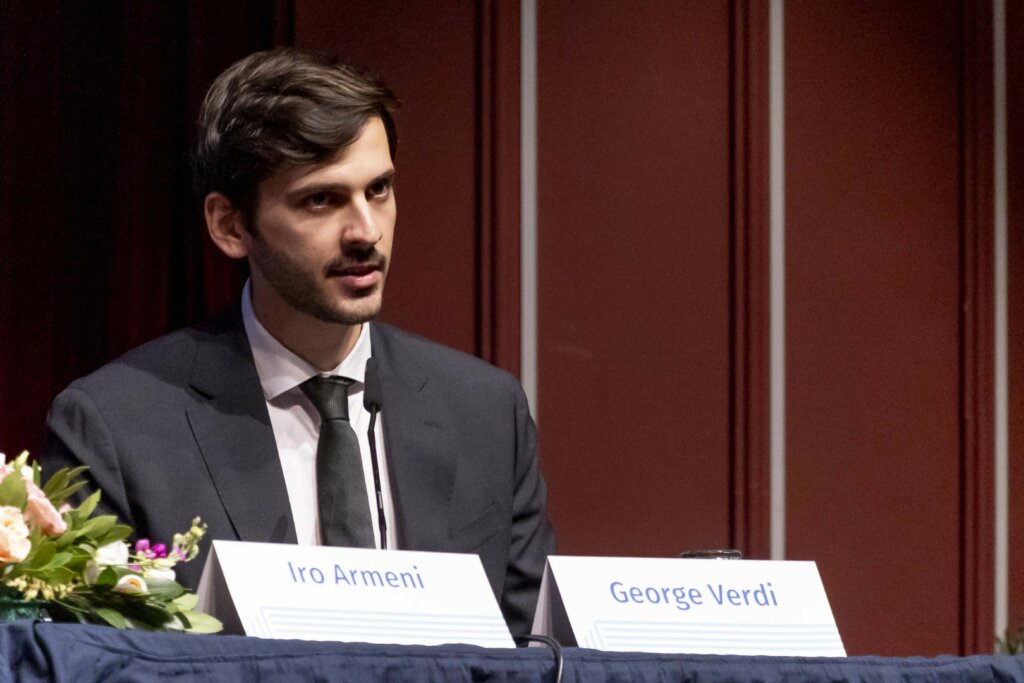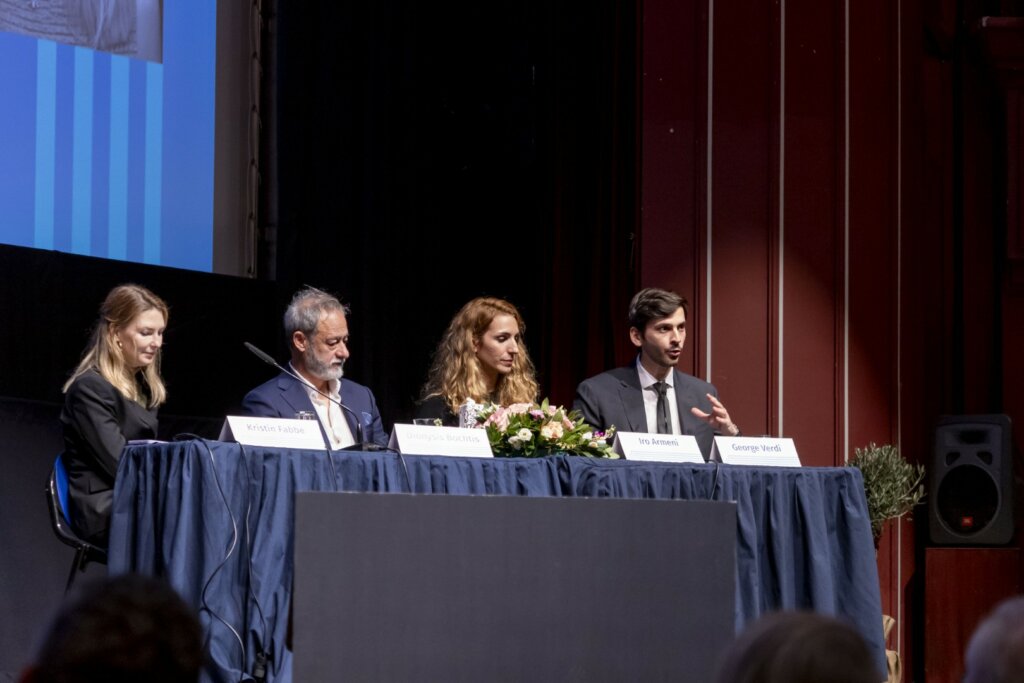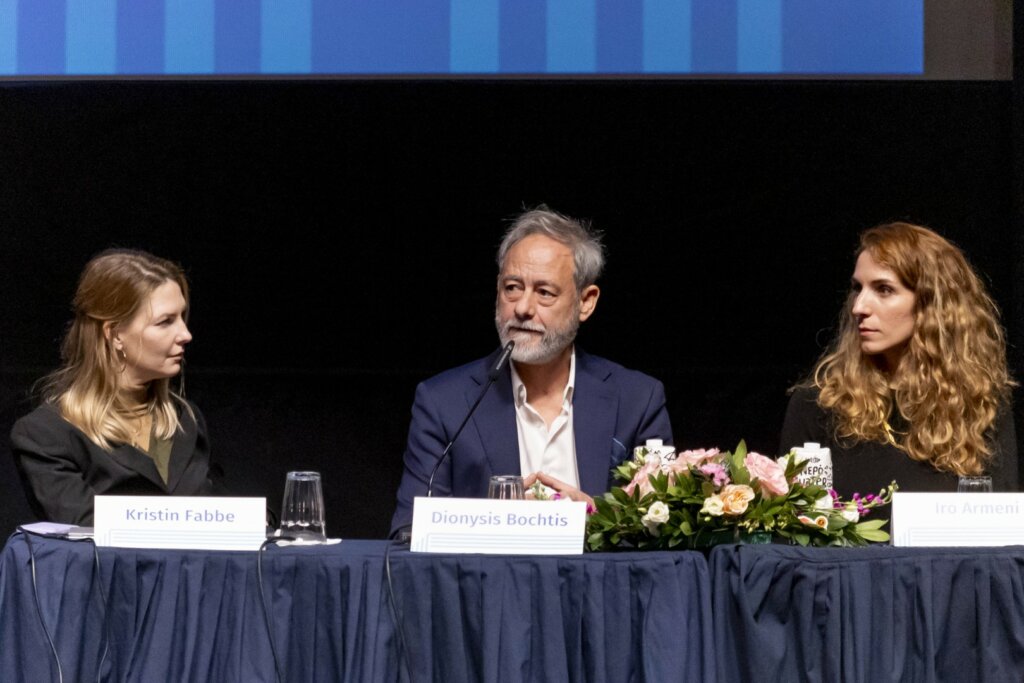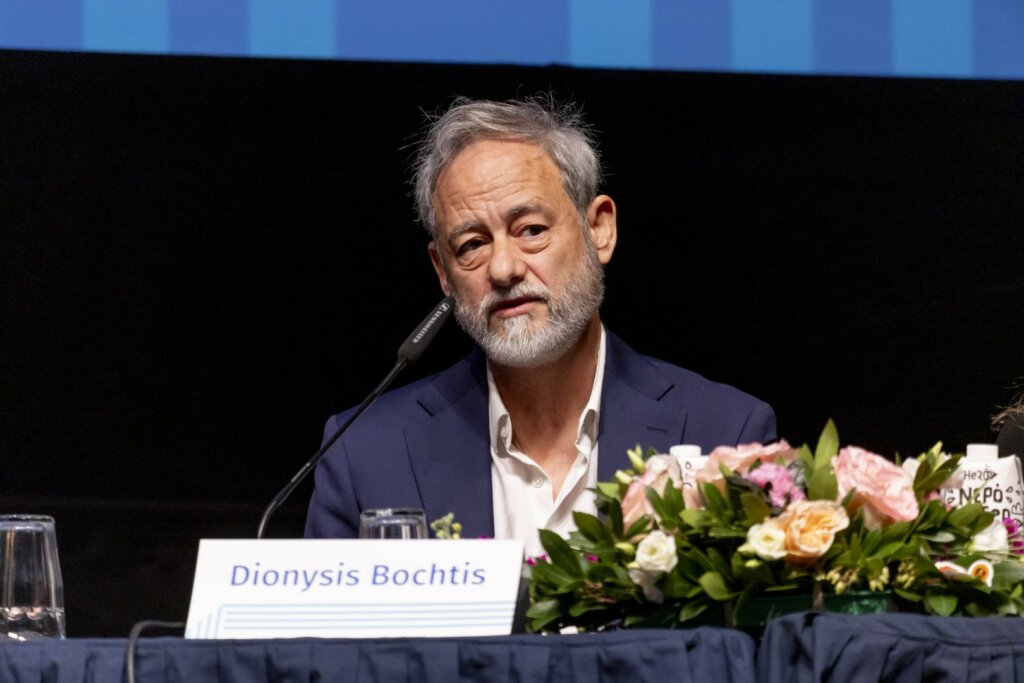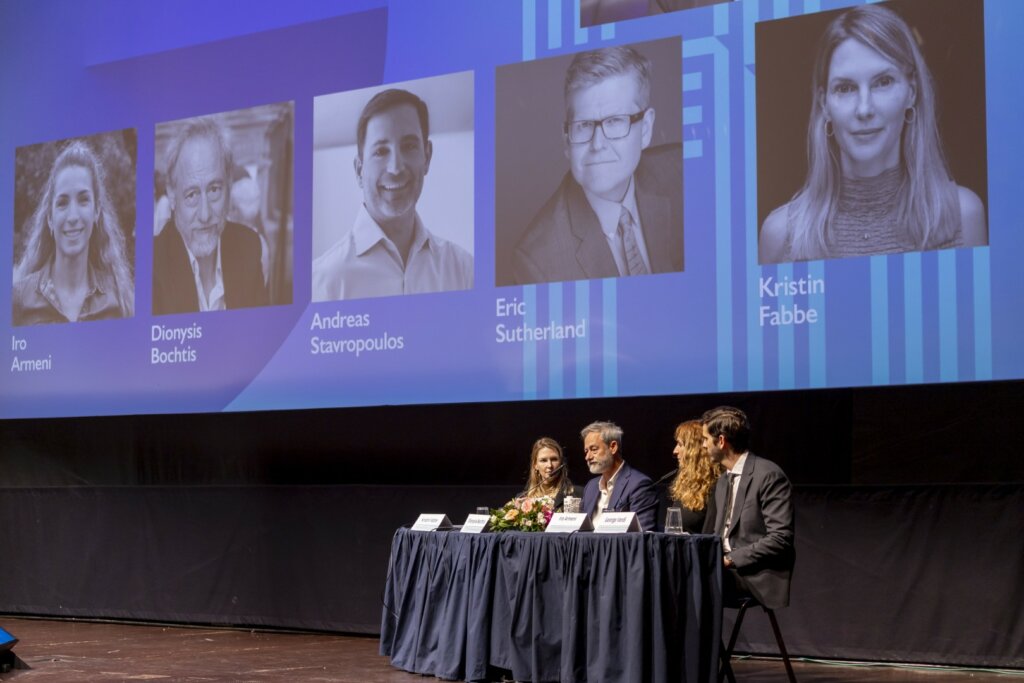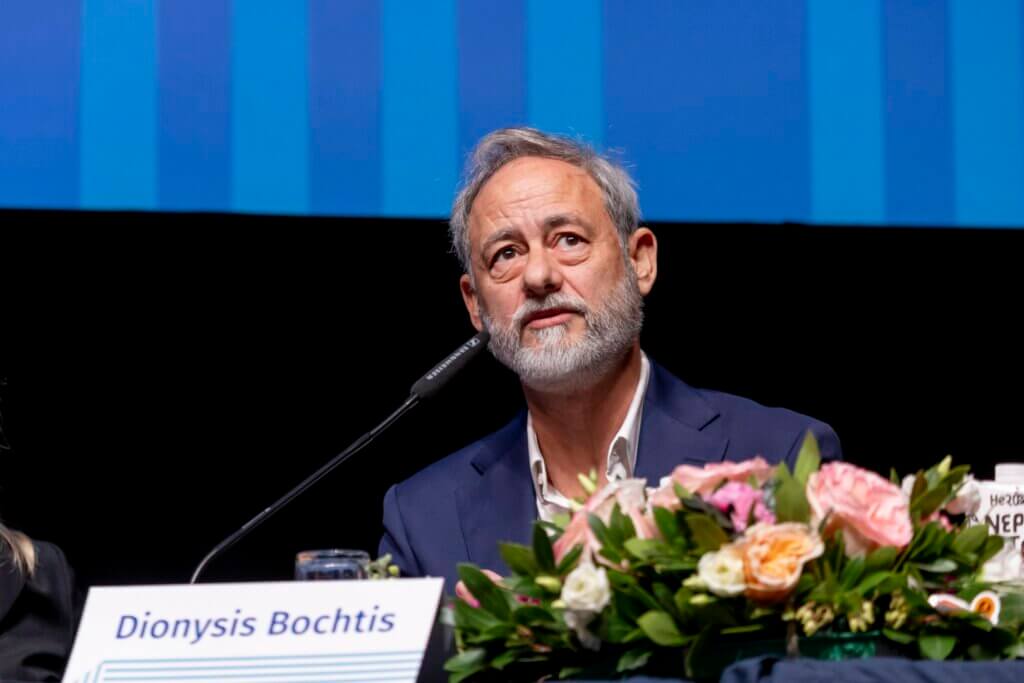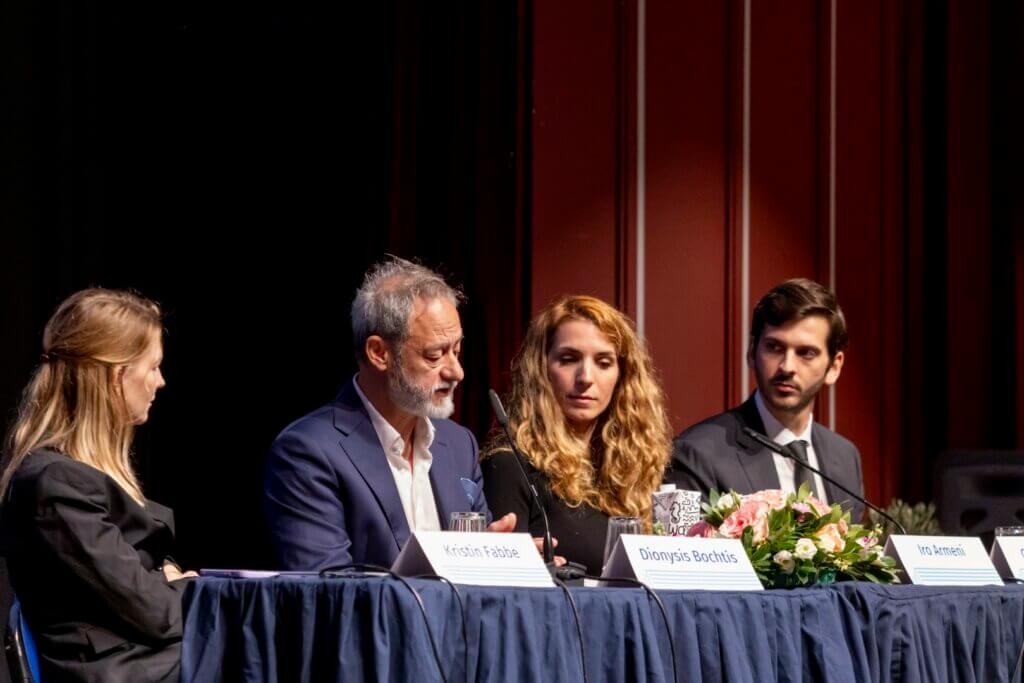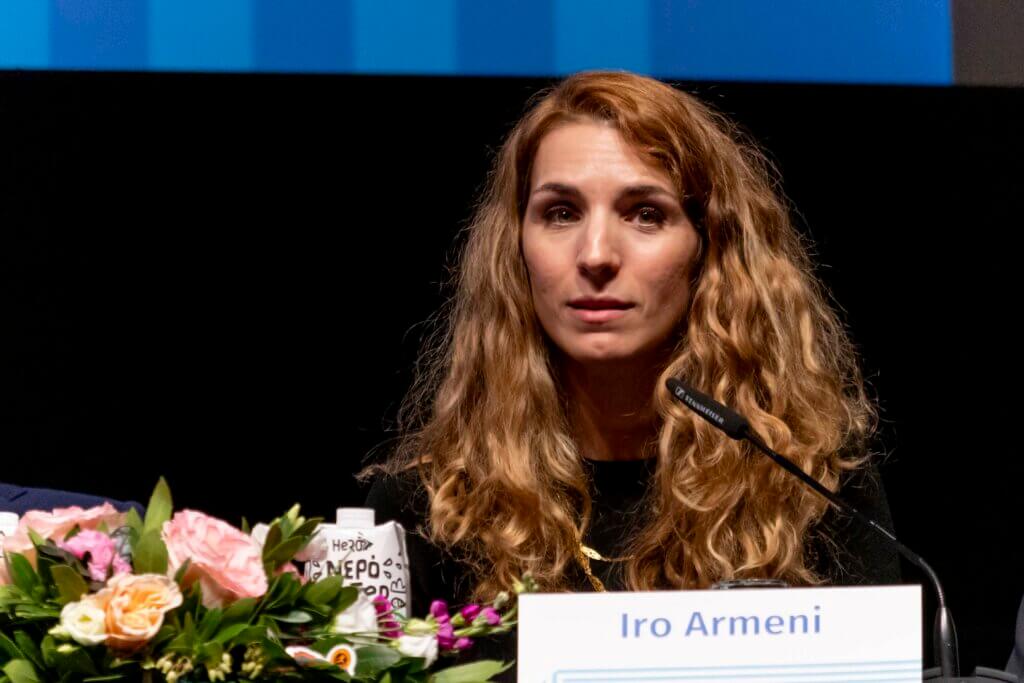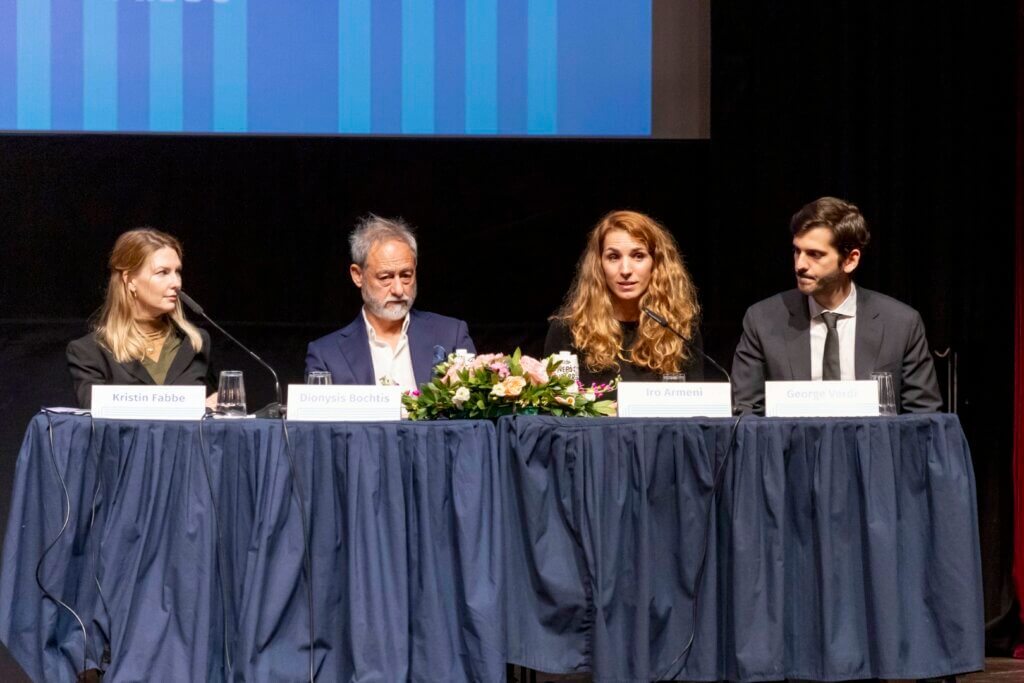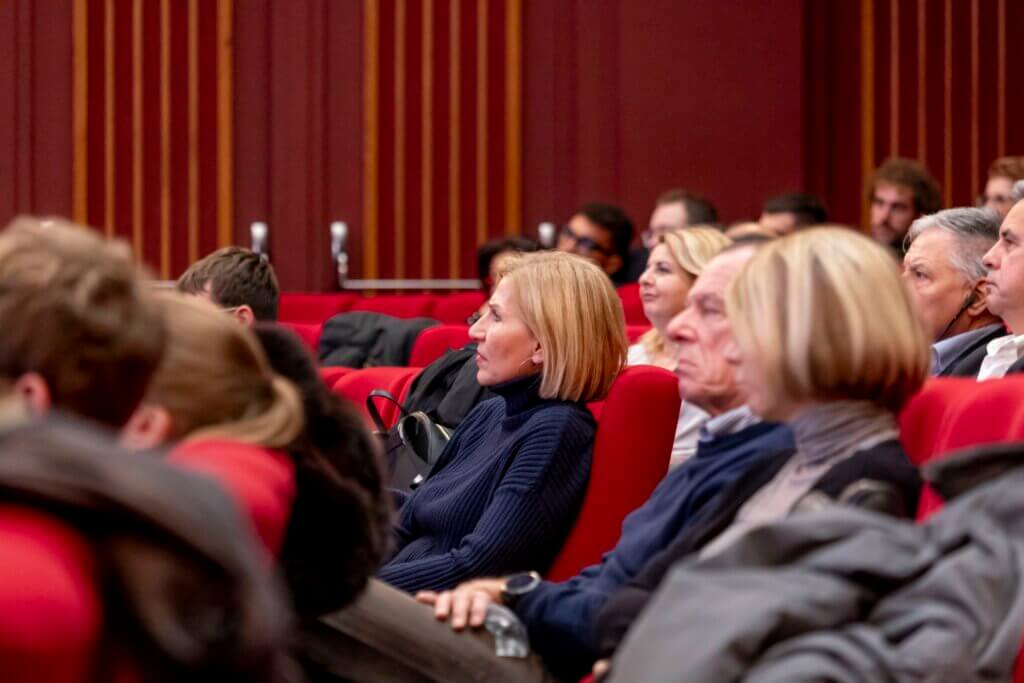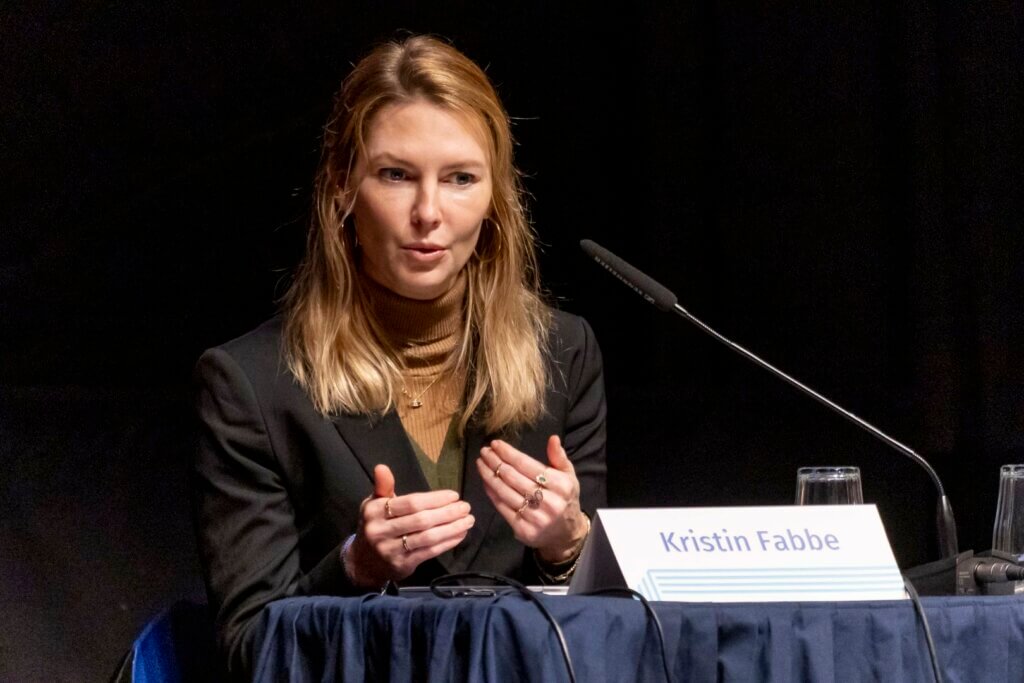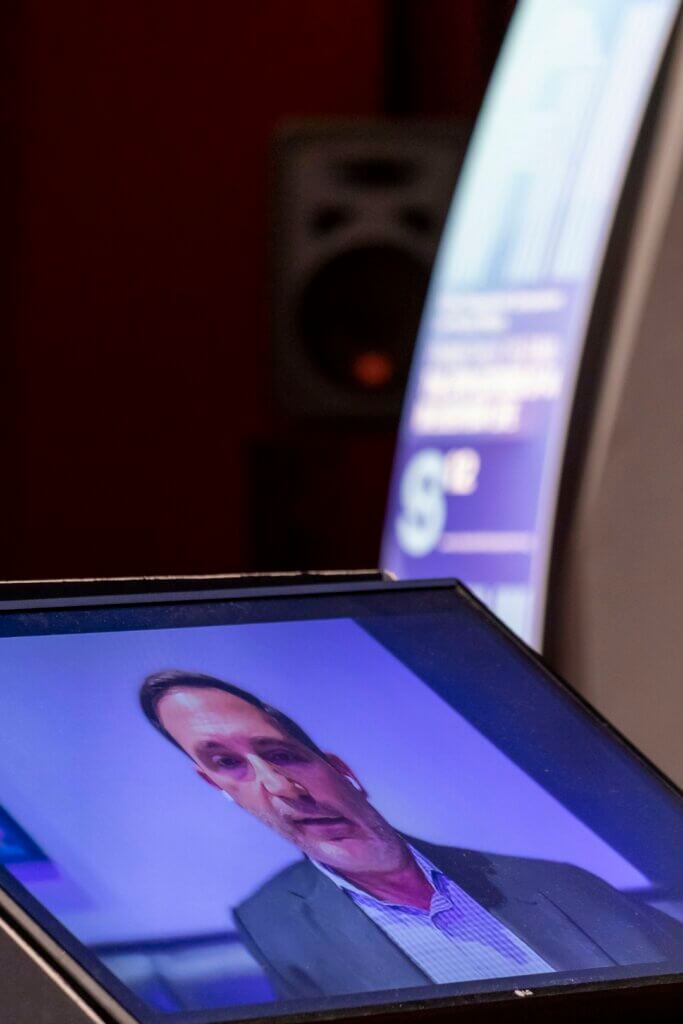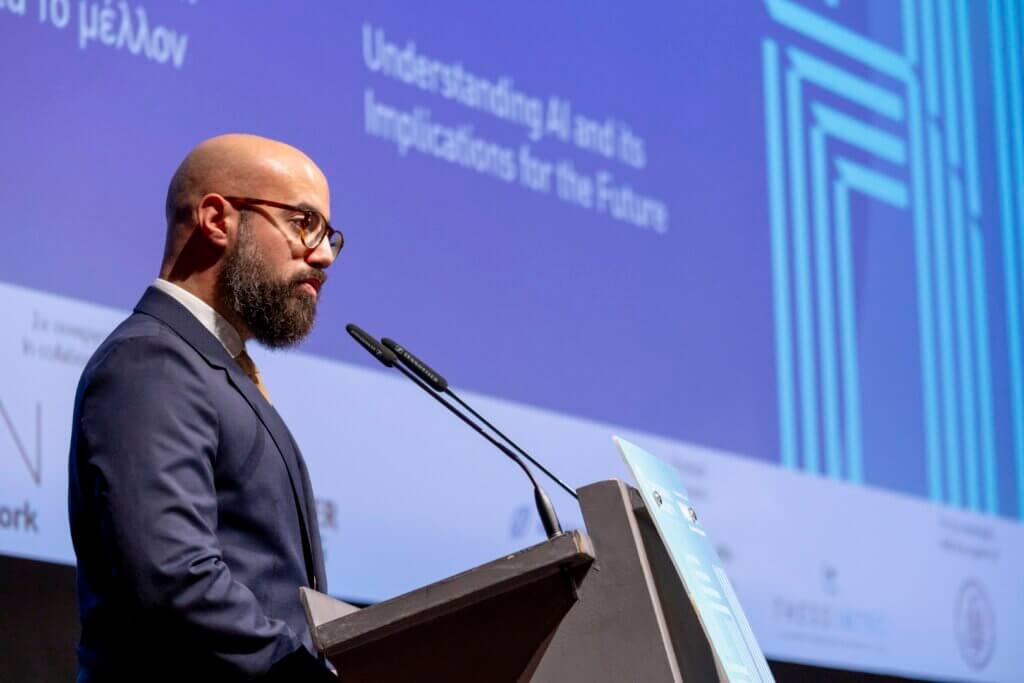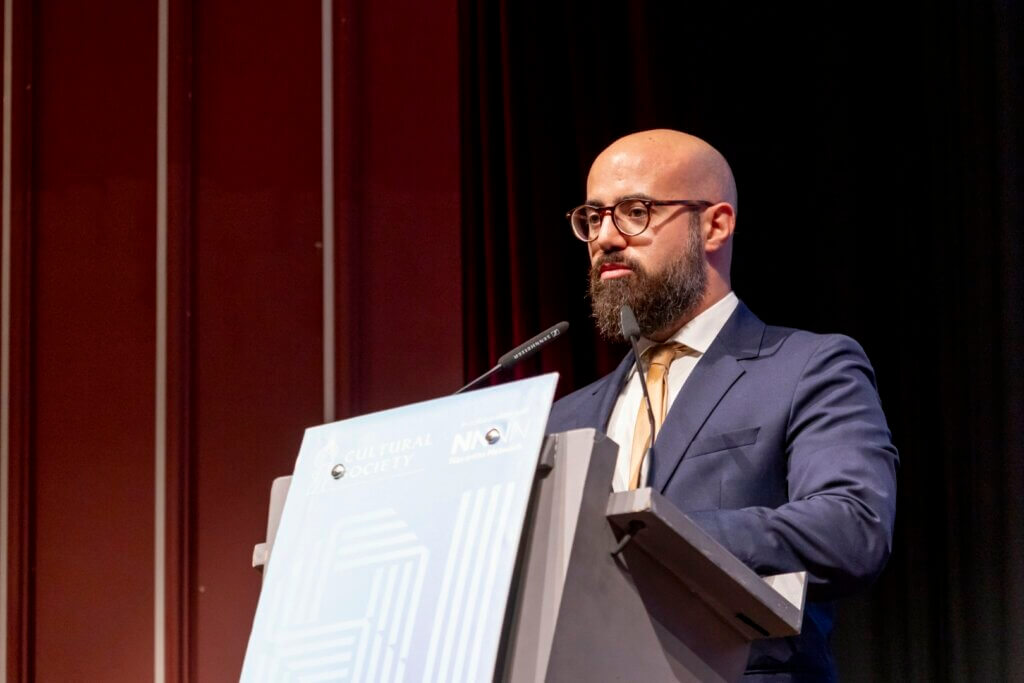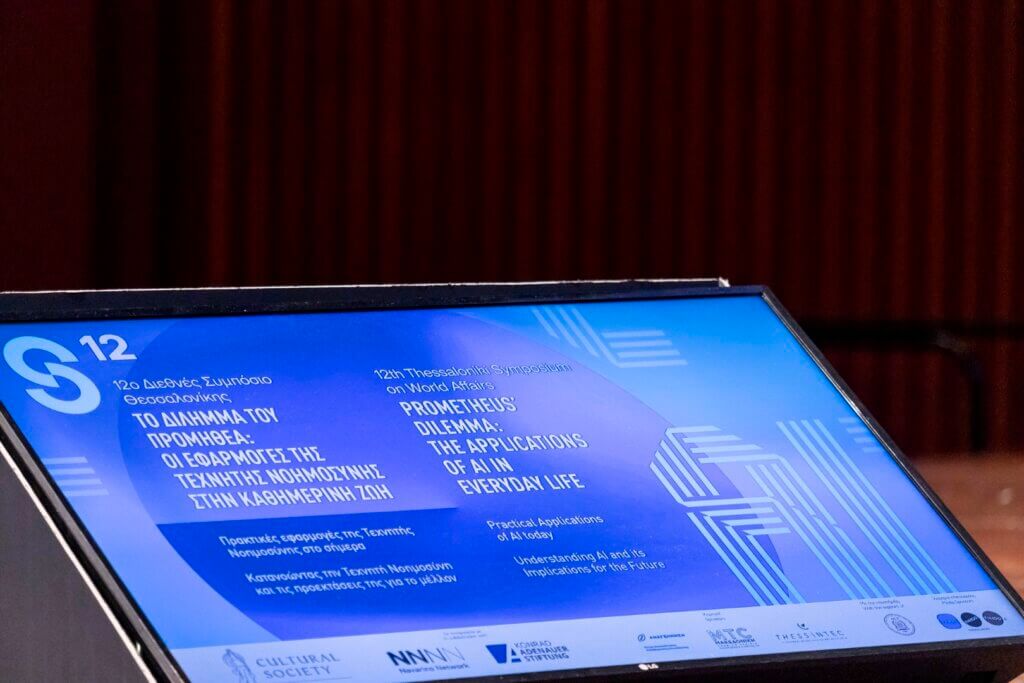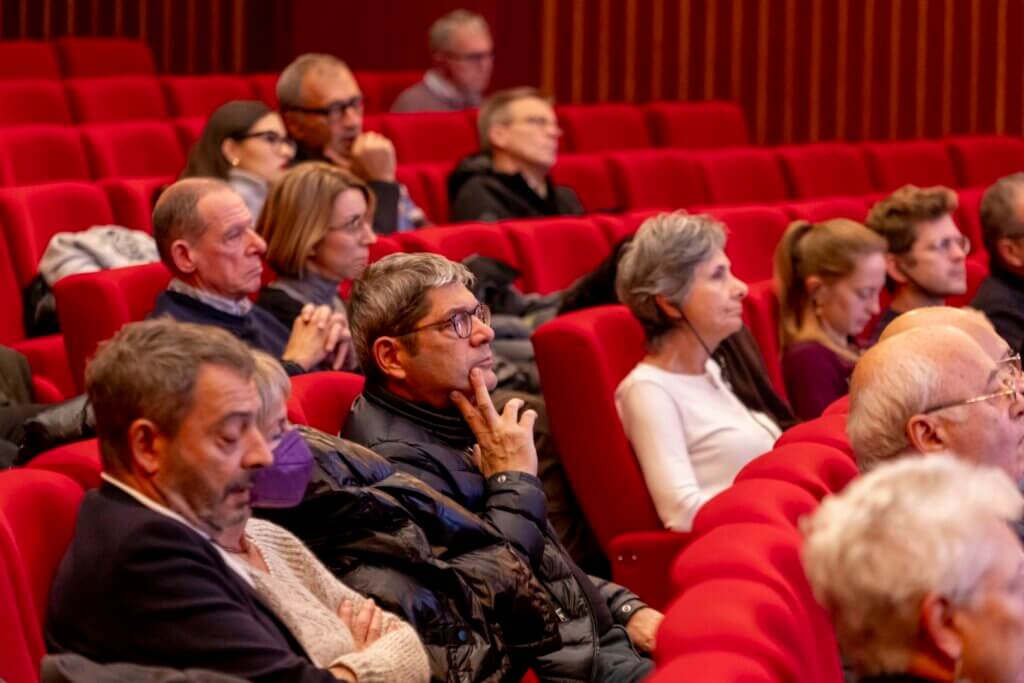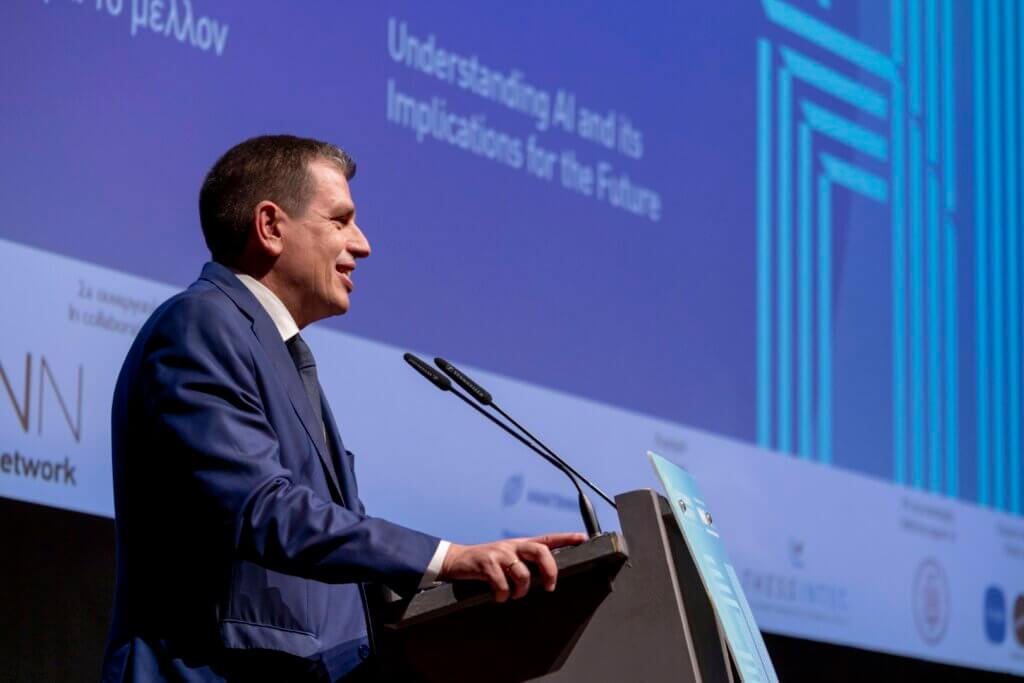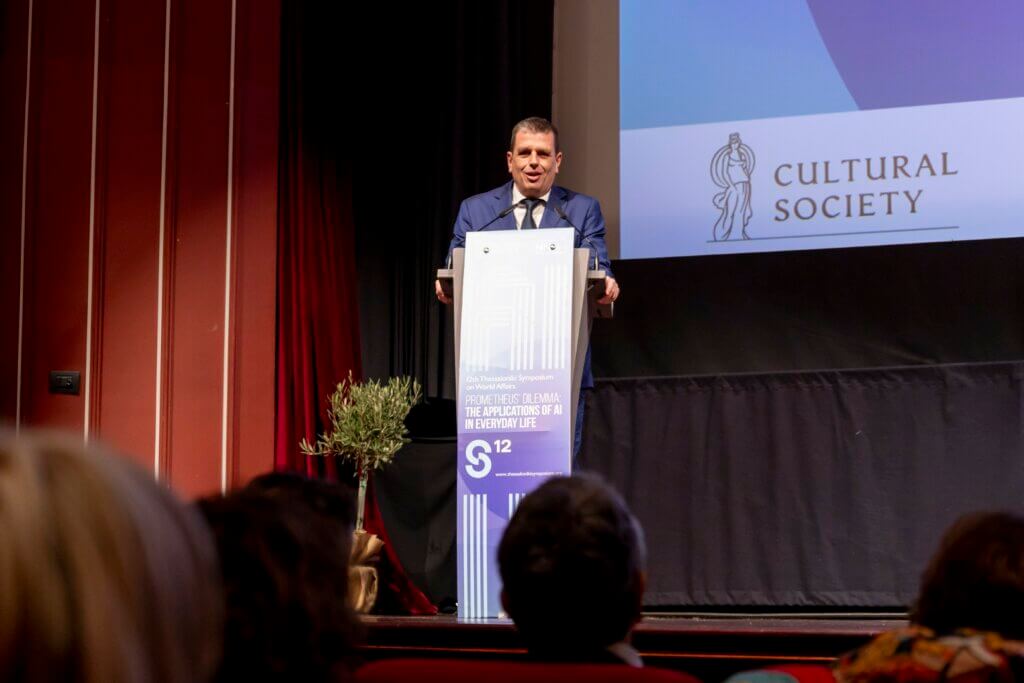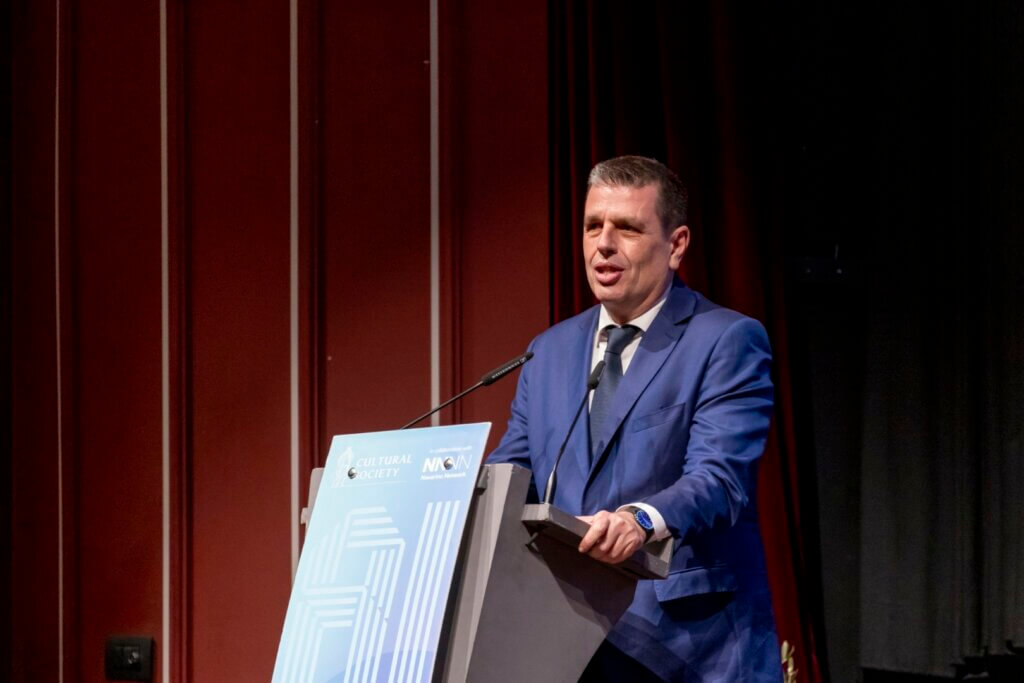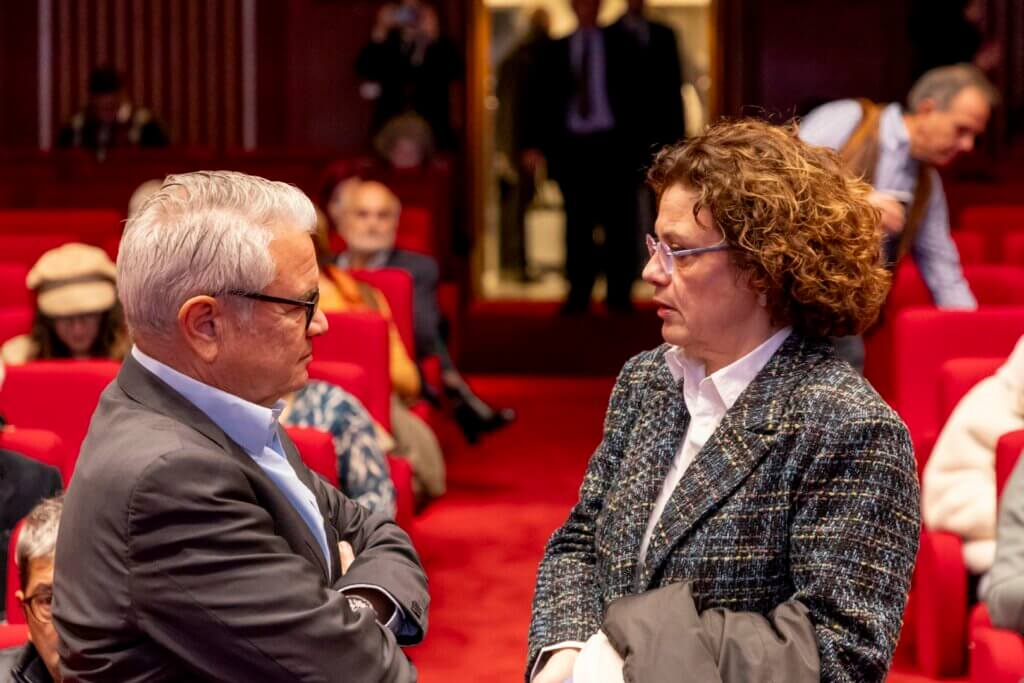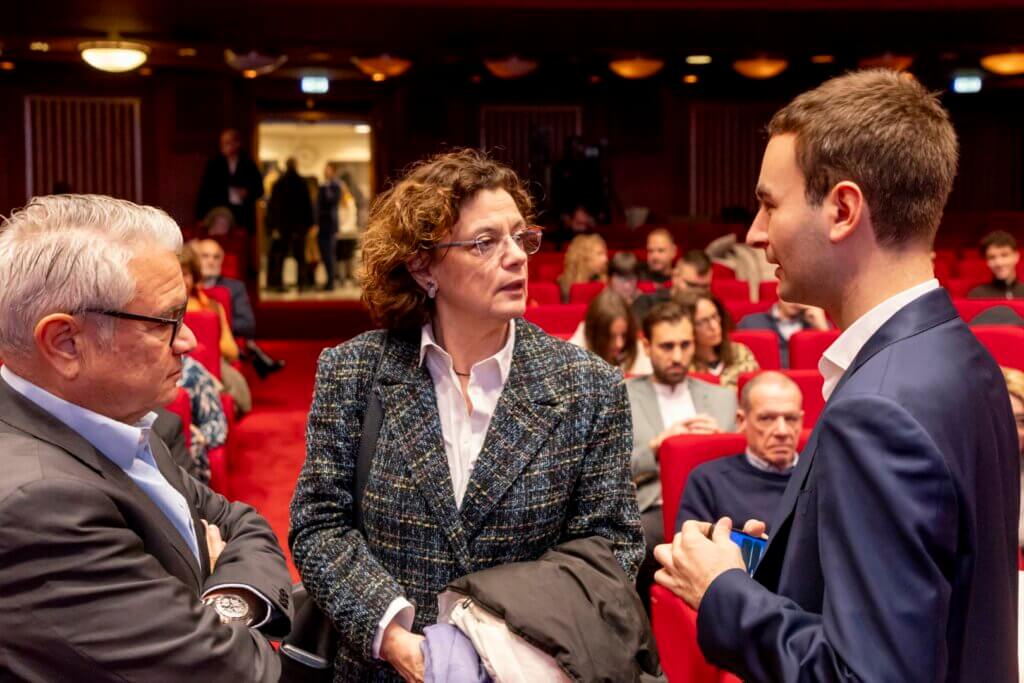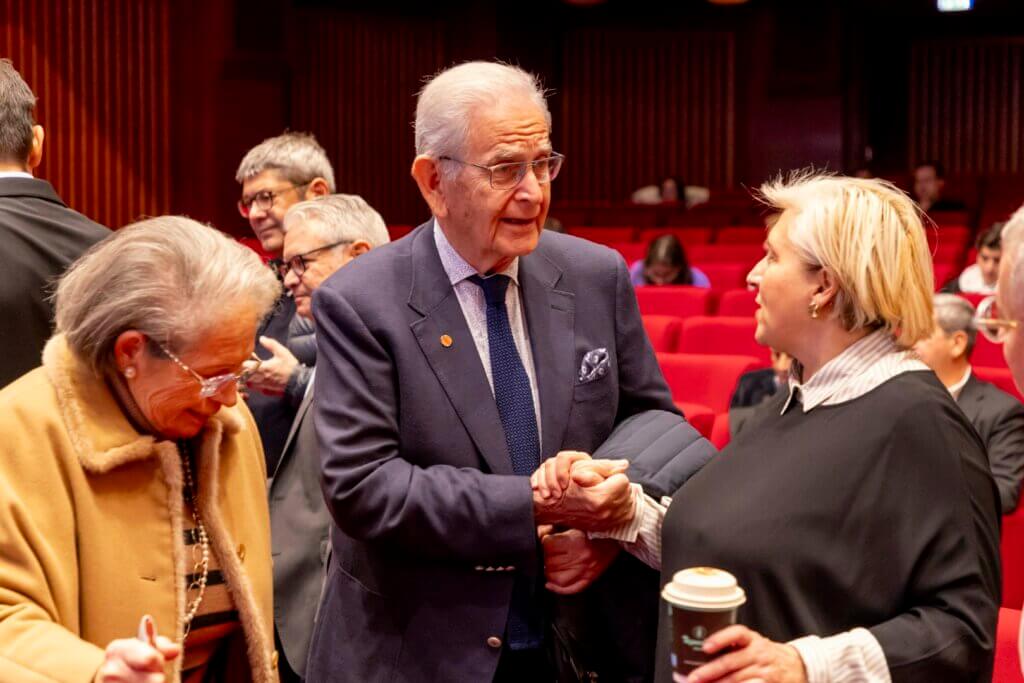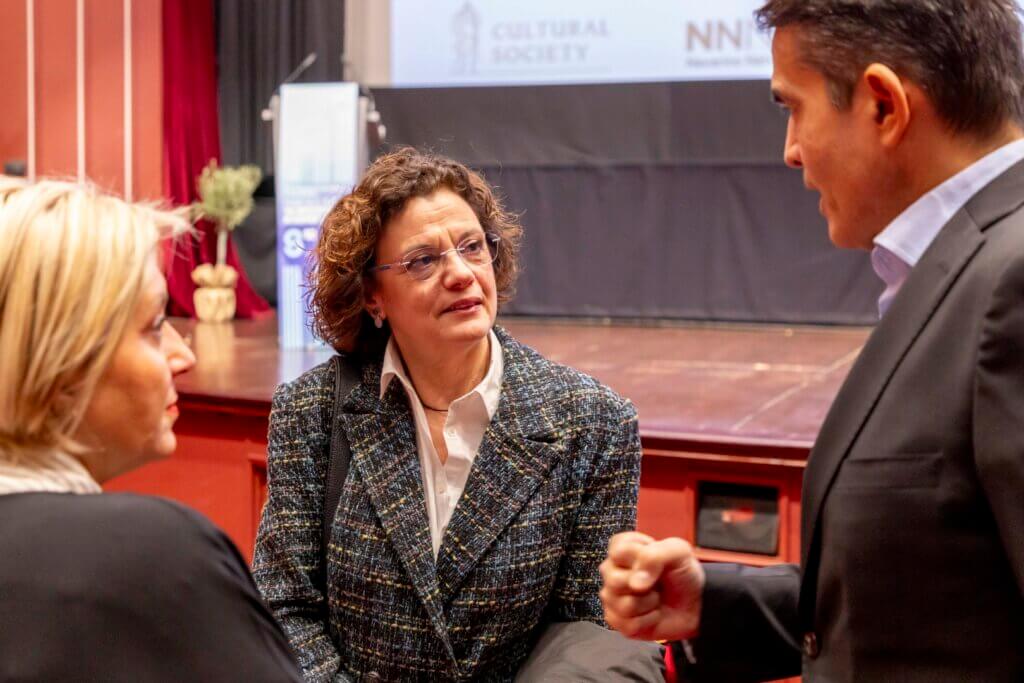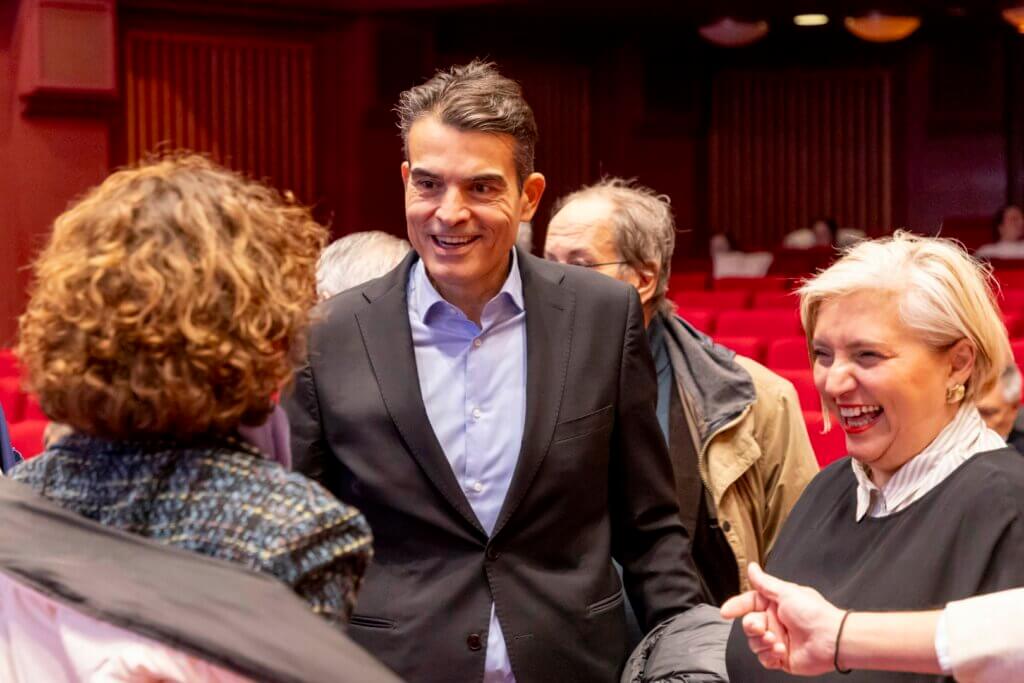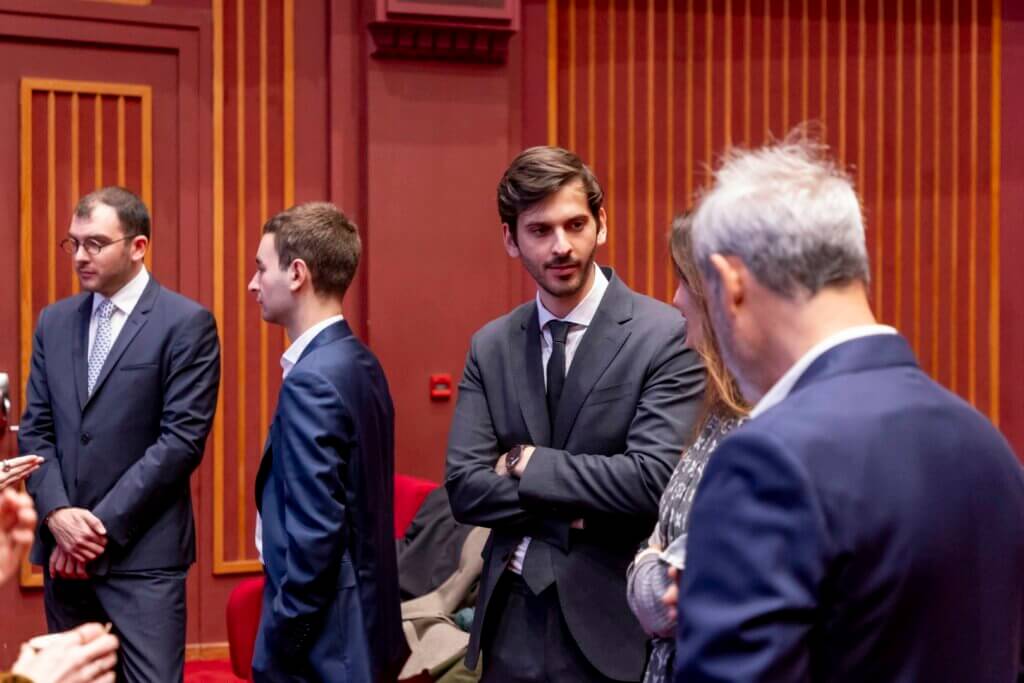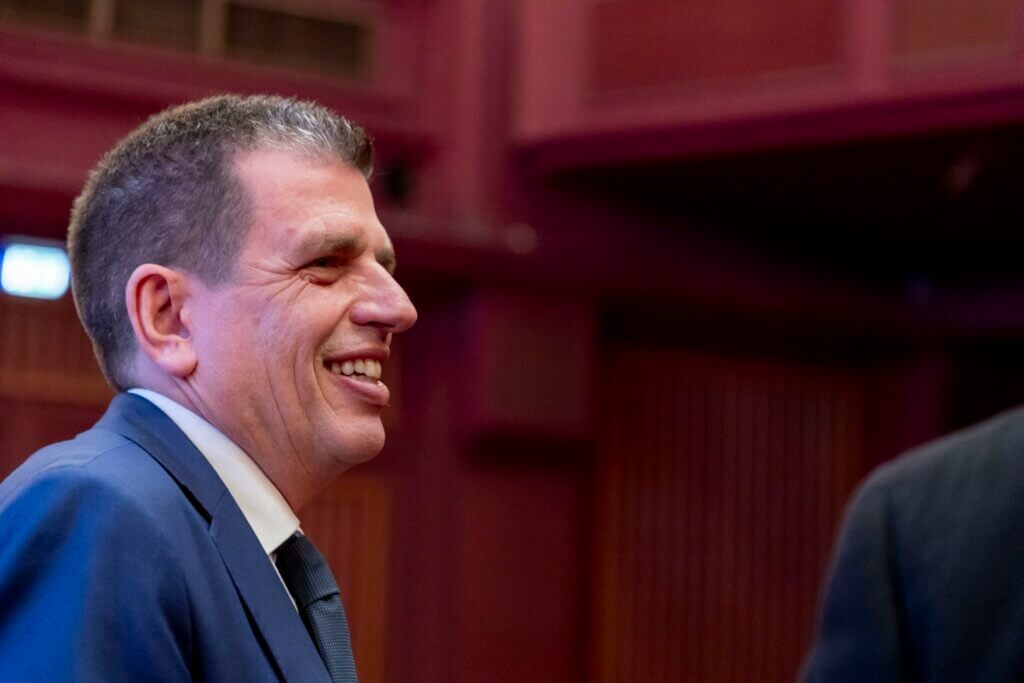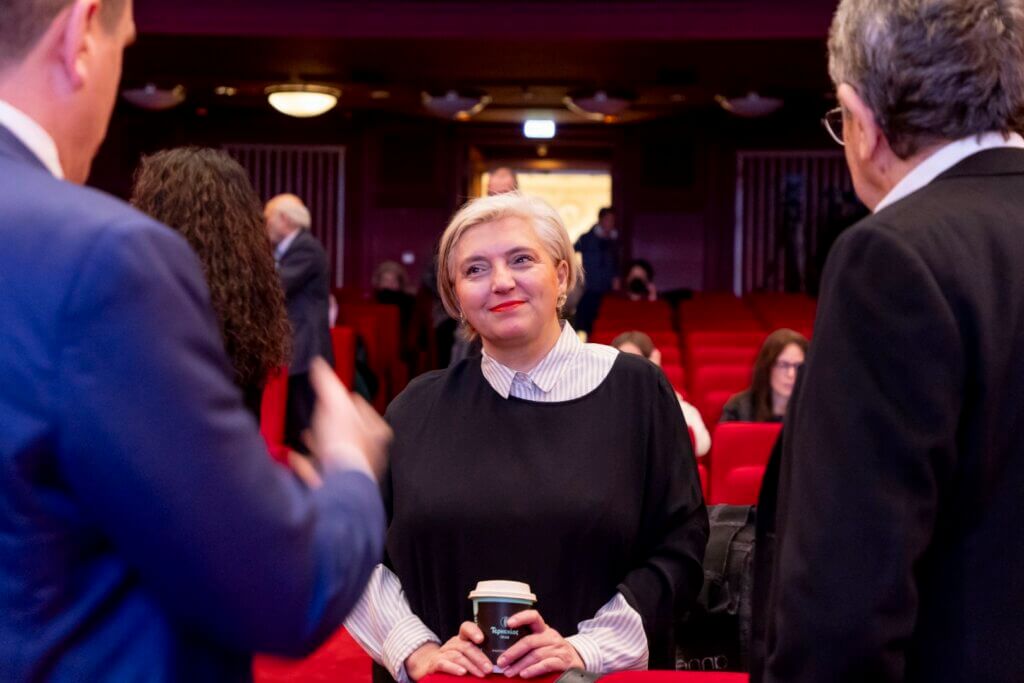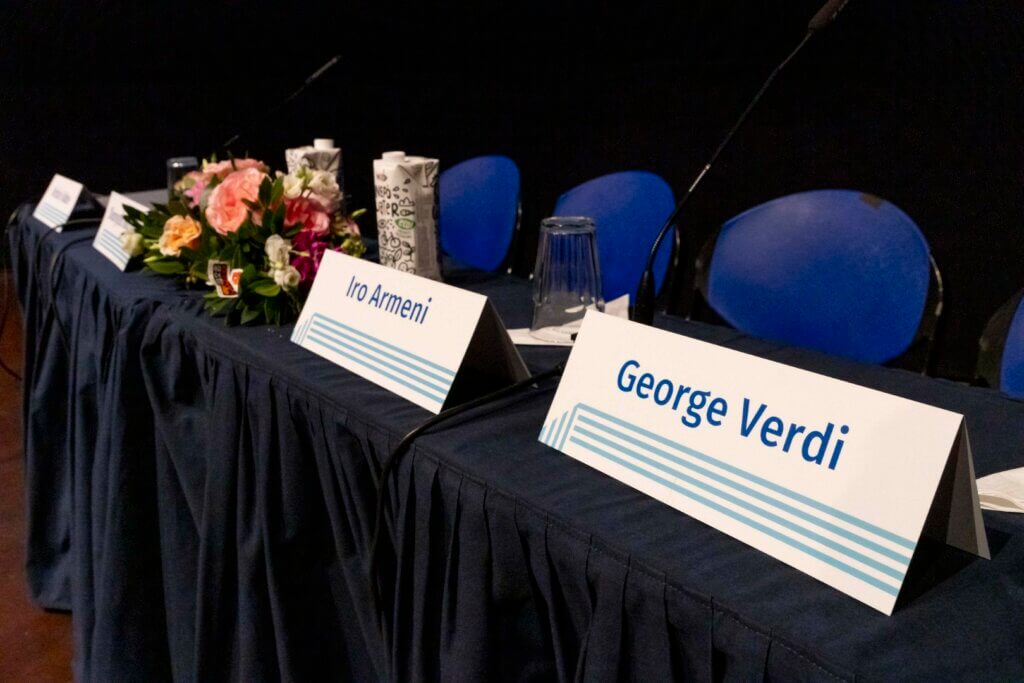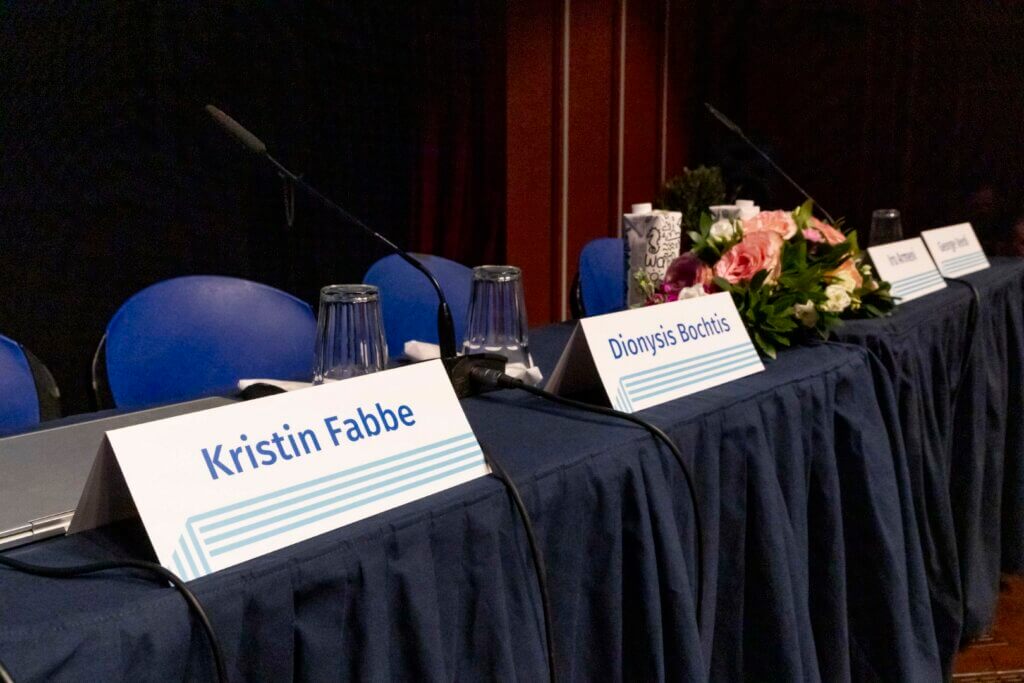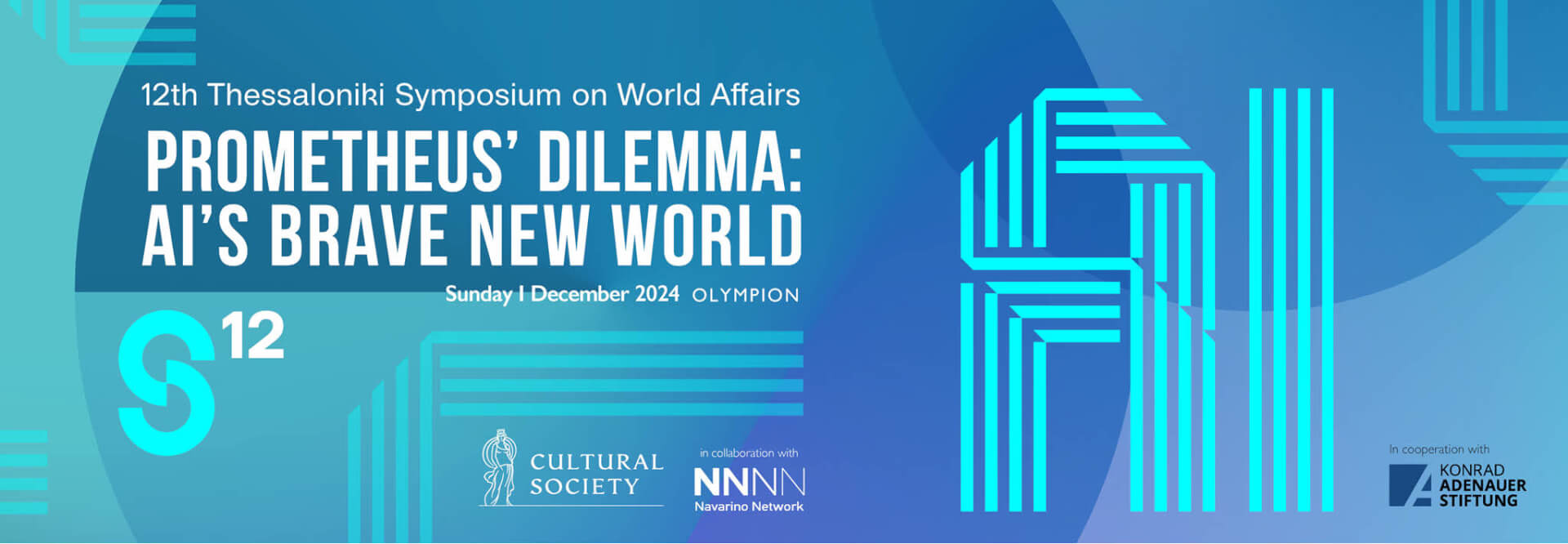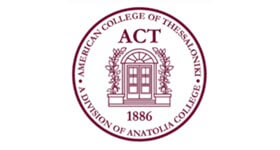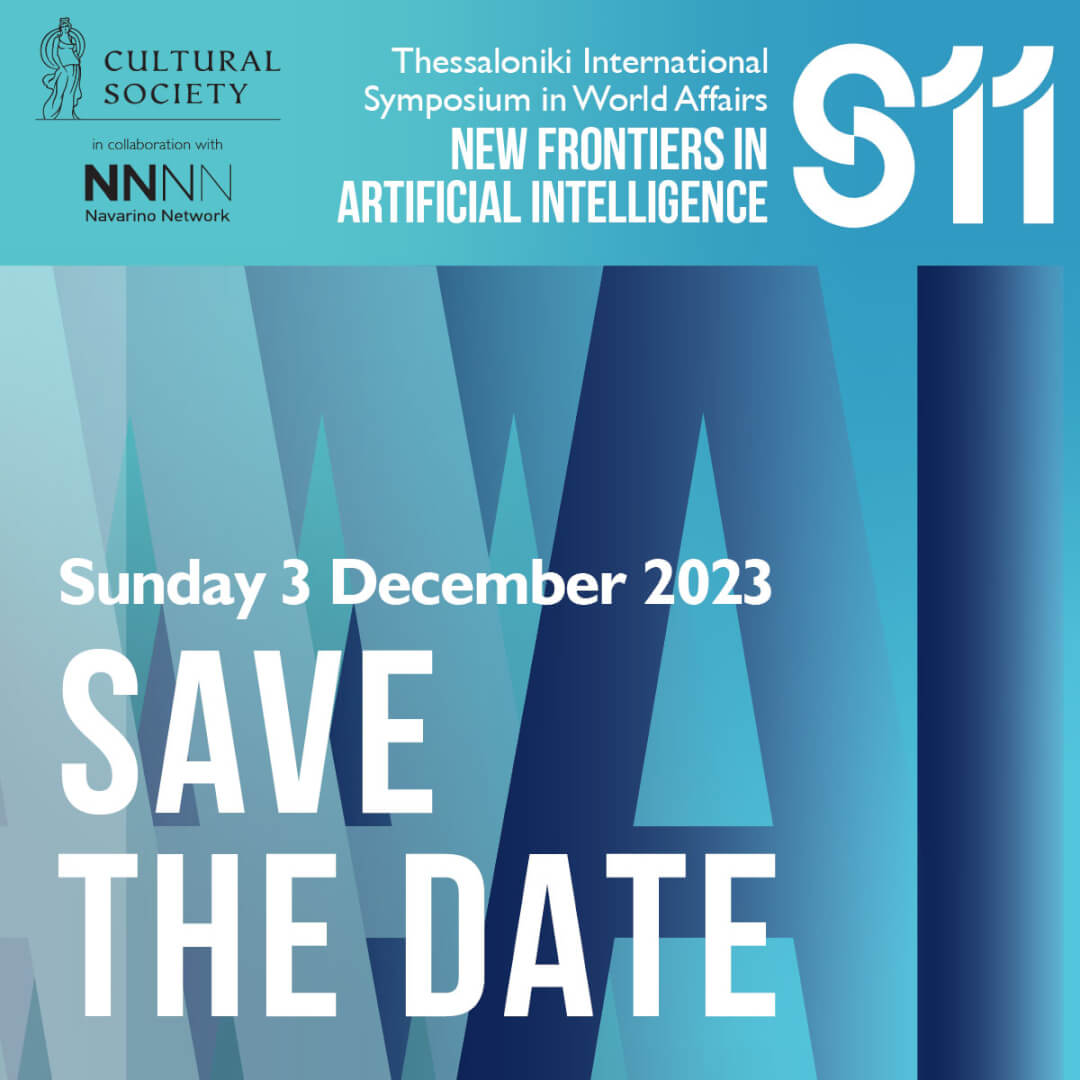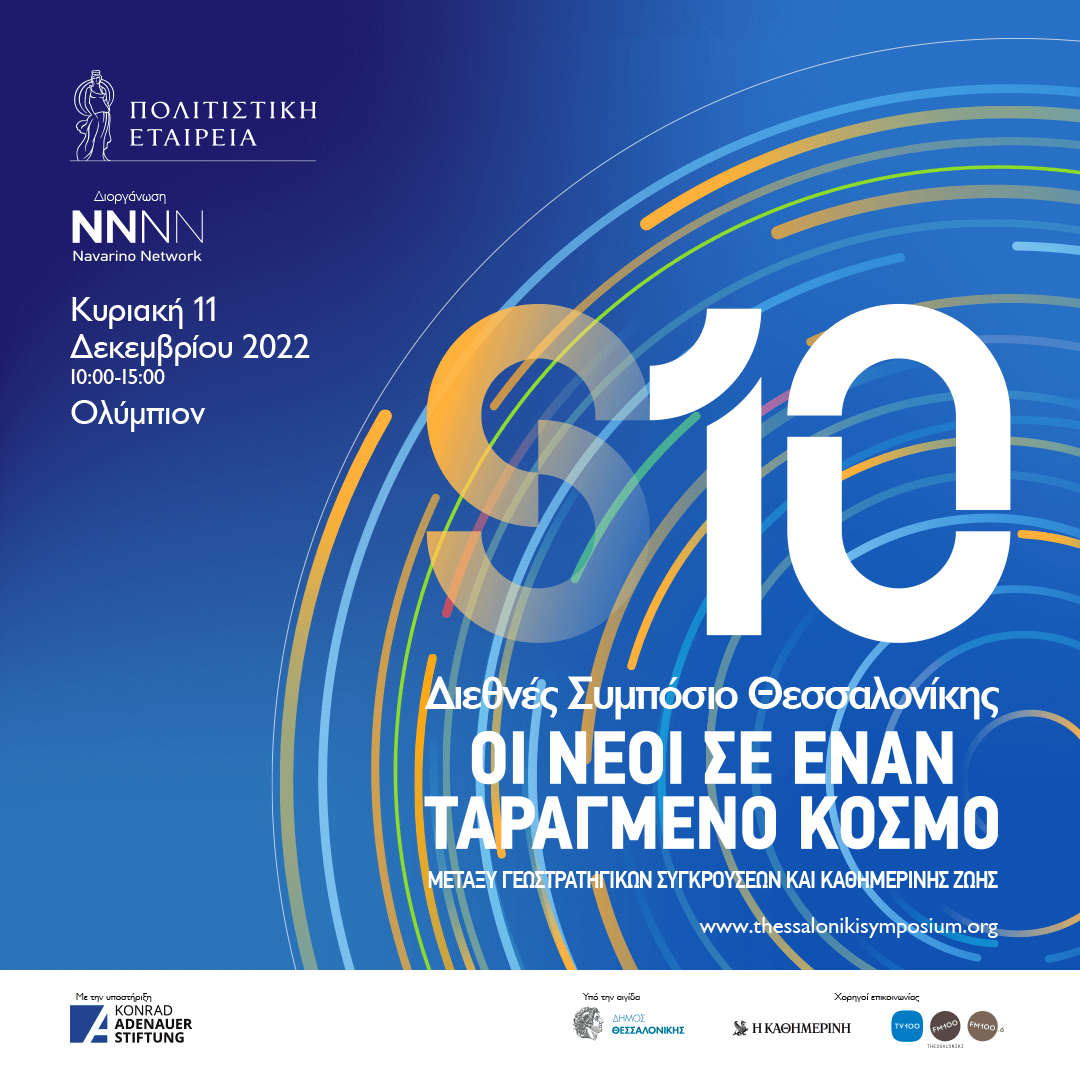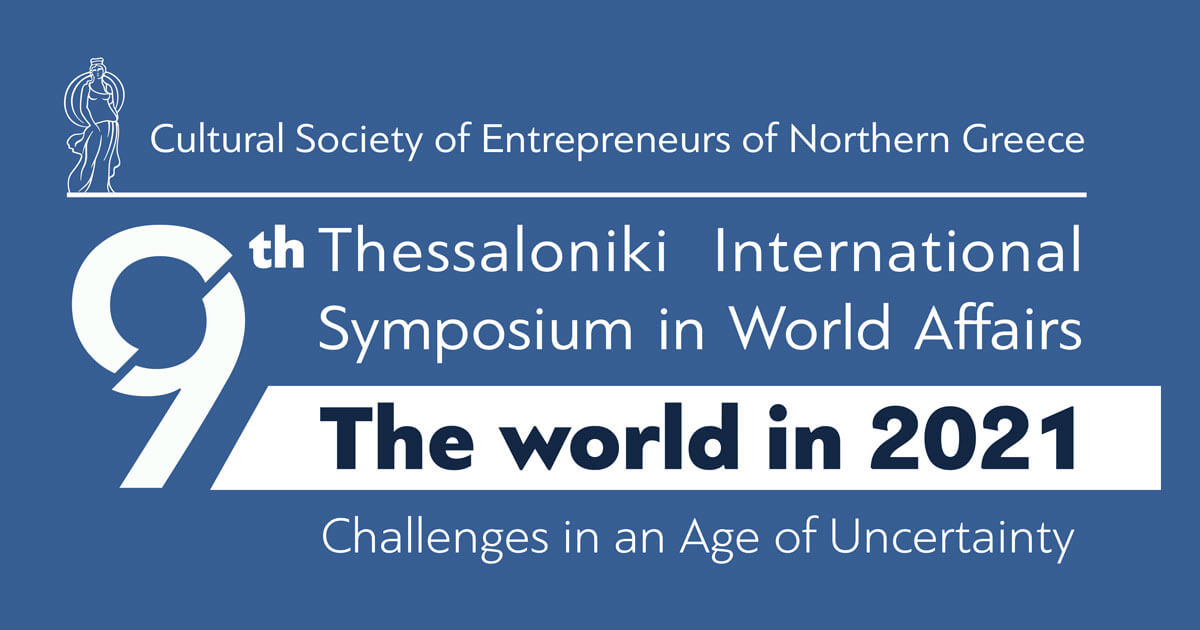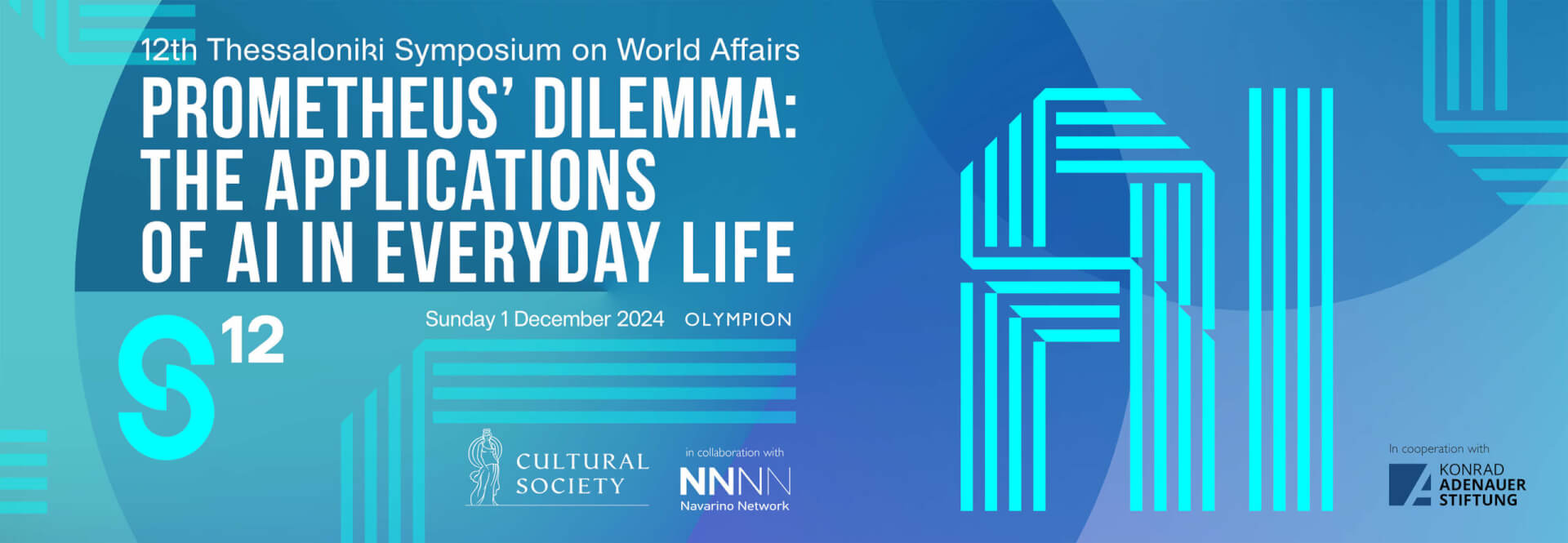
12ο Διεθνές Συμπόσιο Θεσσαλονίκης
12th Thessaloniki International Symposium in World Affairs
1 December 2024
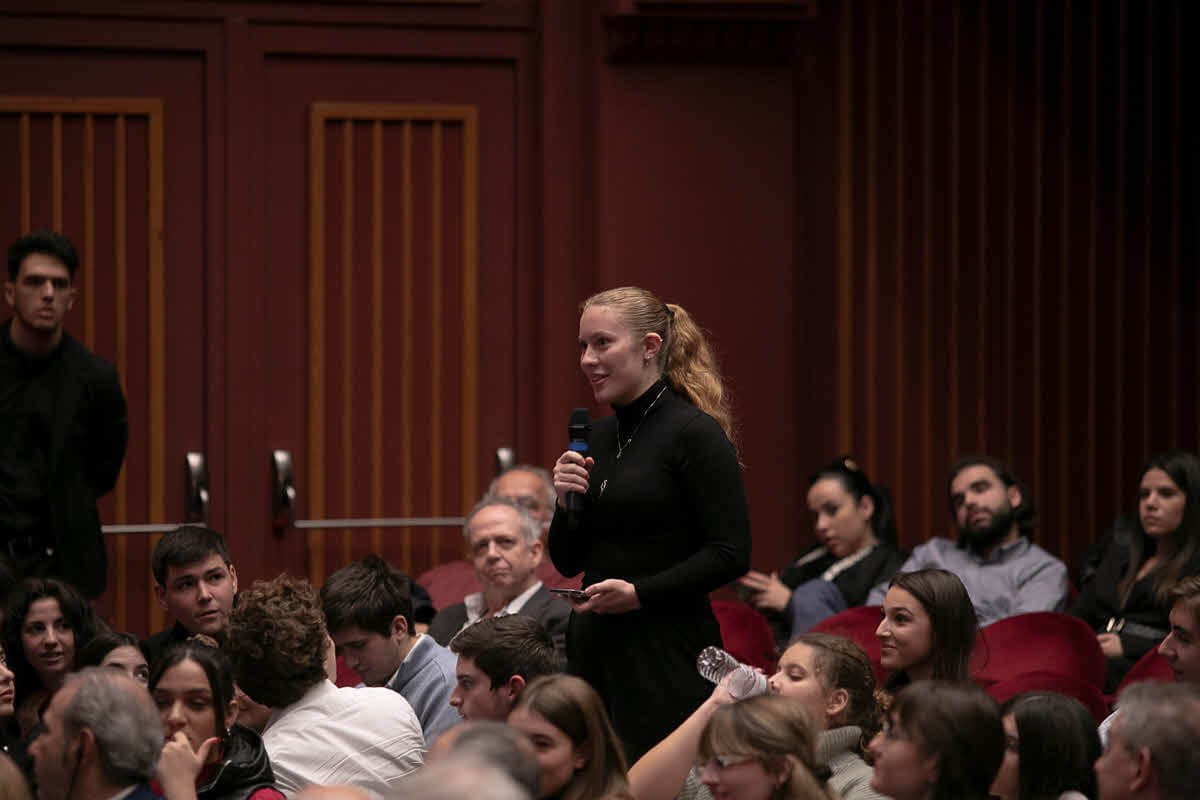
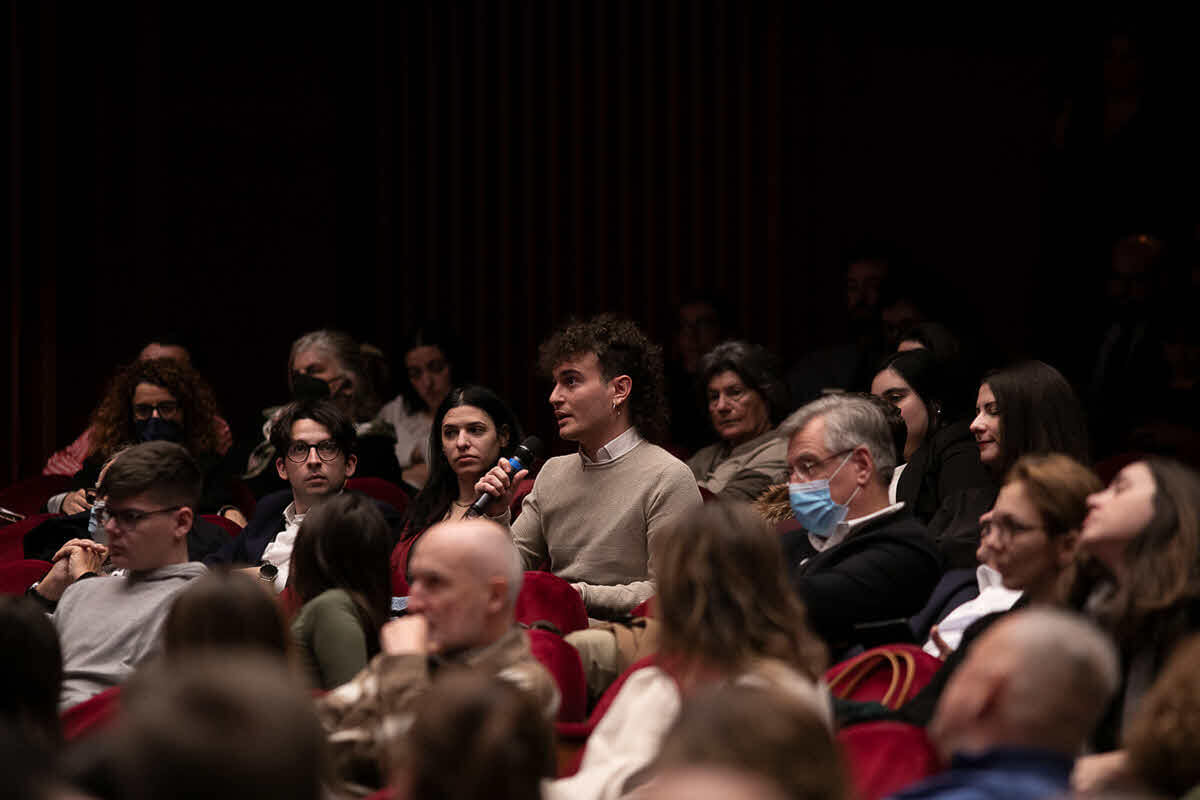
AI in Daily Life: Promise, Challenges, and Ethical Reflections
Exploring the Impact of Artificial Intelligence on Daily Life: Insights from the 12th Thessaloniki International Symposium
The 12th Thessaloniki International Symposium in World Affairs explored the growing impact of Artificial Intelligence on daily life, focusing on its applications, ethical challenges, and future implications.
Experts from various fields shared insights on how AI is transforming sectors like healthcare, finance, agriculture, and national security, while also raising important questions about regulation, education, and human values.
12ο Διεθνές Συμπόσιο Θεσσαλονίκης
Συζητώντας για τις δυνατότητες, τις προκλήσεις και την ηθική στη χρήση της Τεχνητής Νοημοσύνης στην καθημερινότητά μας.
Η συζήτηση που ξεκίνησε στο πλαίσιο του περσινού Διεθνούς Συμποσίου Θεσσαλονίκης, για την Τεχνητή Νοημοσύνη και την υιοθέτησή της σε ολοένα και περισσότερους τομείς της καθημερινής ζωής, συνέχιστηκε φέτος σε μια ιδιαίτερα πετυχημένη διοργάνωση της Πολιτιστικής Εταιρείας και του Δικτύου Ναυαρίνο, σε συνεργασία με το Konrad Adenauer Stiftung, που πραγματοποιήθηκε την Κυριακή 1 Δεκεμβρίου στο Ολύμπιον.
Θέτοντας το πλαίσιο της συζήτηση, ο Σταύρος Ανδρεάδης άνοιξε τις εργασίες του Συμποσίου με ένα απόσπασμα από το βιβλίο «Το επερχόμενο κύμα» του Mustafa Suleyman, αναγνωρίζοντας πως η ανθρωπότητα βρίσκεται μπροστά στη γιγάντωση ενός επερχόμενου τεχνολογικού κύματος, το οποίο περιλαμβάνει τόσο την προηγμένη τεχνητή νοημοσύνη όσο και τη βιοτεχνολογία. «Ποτέ άλλοτε δεν έχουμε σταθεί μάρτυρες τεχνολογιών με τέτοιες μεταμορφωτικές προοπτικές, ικανές να αναδιαμορφώσουν τον κόσμο μας με τρόπους οι οποίοι προκαλούν θαυμασμό και ταυτόχρονα δέος», τόνισε.
Στη διάρκεια του πρώτου πάνελ παρουσιάστηκε μία σειρά εφαρμοσμένων παραδειγμάτων χρήσης της Τεχνητής Νοημοσύνης από τον κόσμο σήμερα: Ο Ανδρέας Σταυρόπουλος, εταίρος στη Threshold Ventures, αναφέρθηκε στους τρόπους με τους οποίους οι αλγόριθμοι αξιοποιούνται πλέον στον κλάδο των χρηματοοικονομικών και στην Τεχνητή Νοημοσύνη ως ένα νέο πεδίο ανταγωνισμού, αναφέροντας επίσης πως «υπάρχουν ηθικά διλήμματα όχι μόνο για τη χρήση ΑΙ αλλά και για τη μη χρήση» όταν αυτή μπορεί να συμβάλει σημαντικά σε ένα ασφαλέστερο αποτέλεσμα, οπως στο παράδειγμα της οδήγησης. Η Ηρώ Αρμένη, Επίκουρη Καθηγήτρια Πολιτικών και Περιβαλλοντικών Μηχανικών στο Stanford University, ανέφερε τους τρόπους με τους οποίους η Τεχνητή Νοημοσύνη μπορεί να αξιοποιηθεί στις κατασκευές για τον περιορισμό της σπατάλης υλικών και τον σχεδιασμό ενεργειακά ουδέτερων κτιρίων. Ο Διονύσης Μπόχτης, Διευθυντής του Ινστιτούτου Βιο-οικονομίας και Αγρο-τεχνολογίας, του Εθνικού Κέντρου Έρευνας & Τεχνολογικής Ανάπτυξης, παρουσίασε εφαρμογές της Τεχνητής Νοημοσύνης στην γεωργία, όπως τη χρήση αλγορίθμων για την αποτελεσματικότερη εφαρμογή φυτοφαρμάκων αλλά και τη δυνατότητα βελτιστοποίησης των καλλιεργειών μέσω της επεξεργασίας δεκάδων δεδομένων (καιρός, γεωγραφία, ανάλυση εδάφους και νερού κ.λπ.) από συστήματα τεχνητής νοημοσύνης. Δεν παρέλειψε επίσης να επισημάνει την ανάγκη διαρκούς εκπαίδευσης του υπάρχοντος εργατικού δυναμικού προκειμένου η χρήση των νέων τεχνολογιών να είναι αξιοποιήσιμη από όσους το δυνατόν περισσότερους επαγγελματίες. Ο Eric Sutherland, Senior Health Economist στον Οργανισμό Οικονομικής Συνεργασίας και Ανάπτυξης, μίλησε για τους τρόπους με τους οποίους η Τεχνητή Νοημοσύνη ήδη έχει αντίκτυπο στην υγεία, βοηθώντας στην πρόβλεψη ασθενειών, αναλύοντας εξετάσεις, ή δημιουργώντας σημειώσεις ιατρικών συναντήσεων.
Τέλος, ο Γιώργος Βέρδη, Policy Fellow στο European Council on Foreign Relations, μίλησε για το ρυθμιστικό πλαίσιο της Ευρωπαϊκής Ένωσης γύρω από τις διάφορες εφαρμογές που συζητήθηκαν, θέτοντας το θέμα της ηθικής χρήσης και της προστασίας των ανθρωπίνων δικαιωμάτων.
Διαβάστε περισσότερα…
Το δεύτερο πάνελ, που σκοπό είχε την κατανόηση των προεκτάσεων της Τεχνητής Νοημοσύνης στο μέλλον, άνοιξε ο Μιχάλης Μπλέτσας, Διοικητής της Εθνικής Αρχής Κυβερνοασφάλειας, τονίζοντας πως η ΤΝ σήμερα “χακάρει” ανθρώπους και όχι υποδομές και μίλησε για την ανάγκη εκπαίδευσης του κοινού ώστε να αναγνωρίζει AI-generated περιεχόμενο και να είναι σε καλύτερη θέση να αντιλαμβάνεται απόπειρες παραπληροφόρησης. Η Sofia Romansky, στρατηγική αναλύτρια του Κέντρου Στρατηγικού Μελετών της Χάγης, ανέλυσε τις τρέχουσες εξελίξεις στις πολεμικές εφαρμογές της ΤΝ, αναφέροντας παραδείγματα από τους πολέμους σε Ουκρανία και Ισραήλ, και μίλησε για το πώς προβλέπει να ενταχθεί η ΤΝ στο διεθνές δίκαιο και τις διεθνείς συνθήκες. Ο Μάριος Δαφνομήλης, Σύμβουλος στην Ειδική Γραμματεία Μακροπρόθεσμου Σχεδιασμού, παρουσίασε κομμάτια της νέας Εθνικής Στρατηγικής για την Ανάπτυξη της Τεχνητής Νοημοσύνης υπογραμμίζοντας ότι η χώρα μας οφείλει να φροντίσει για την παροχή ελληνικού περιεχομένου στους αλγορίθμους προκειμένου να βελτιωθεί η αποδοτικότητα των νέων τεχνολογιών στην ελληνική γλώσσα. Τέλος, ο Γιώργος Βέρδη, σκιαγράφησε το διεθνές τοπίο, επισημαίνοντας πως «η Ευρώπη λόγω του ρυθμιστικού πλαισίου που προσπαθεί να διαμορφώσει για την ηθική χρήση του ΑΙ, αλλά και της πολυφωνίας 27 χωρών, μένει πίσω σε σχέση με την Αμερική και την Κίνα».
Αναμέσα στις ενδιαφέρουσες διαπιστώσεις των ομιλητών κατά τη διάρκεια της συζήτησης αλλά και των στοχευμένων ερωτήσεων και επισημάνσεων του κοινού, ανάμεσα σε αυτούς πολλοί νέοι φοιτητες/μαθητές, υπήρξε η αναφορά στο γεγονός οτι οι άνθρωποι έχουν εξοικειωθεί με την μερική αντικατάσταση της ανθρώπινης χειρωνακτικής εργασίας από μηχανές, αλλά τώρα βρισκόμαστε μπροστά στην πρόκληση της μερικής αντικατάστασης της ανθρώπινης σκέψης. Στο πλαίσιο αυτό επισημάνθηκε η εξαιρετικά μεγάλη σημασία της κριτικής σκέψης στην εκπαίδευση ώστε η ΤΝ να ενισχύει την κριτική σκέψη του ανθρώπου και να μην την υποκαθιστά, ενώ τονίστηκε οτι το συναίσθημα αποτελεί τη σημαντική ειδοποιό παράμετρο που δεν μπορεί ακόμα να υποκατασταθεί από την τεχνολογία της ΤΝ! Σημαντική υπήρξε η τοποθέτηση του Δημήτρη Καιρίδη, Καθηγητή Διεθνών Σχέσεων του Παντείου Πανεπιστημιου, Βουλευτή Βορείου Τομέα Αθηνών και Ιδρυτή του Δικτύου Ναυαρίνο, ότι «η δημοκρατία δεν είναι φτιαγμένη ούτε έχει προσαρμοστεί στον αλγόριθμο του διαδικτύου, με αποτέλεσμα να τη διαβρώνει εκ των έσω και να την πλήττει, εγκλωβίζοντας εμάς τους ανθρώπους στις φοβίες και τις προκαταλήψεις που έχουμε».
Με την παραδοχή ότι το αντικείμενο της Τεχνητής Νοημοσύνης αποτελεί ένα ανεξάντλητο θέμα συζήτησης και προβληματισμού, το οποίο θα απασχολήσει την ανθρωπότητα και τα επόμενα χρόνια, η διοργάνωση του Διεθνούς Συμποσίου Θεσσαλονίκης ανανέωσε τη συνάντηση για την επόμενη χρονιά, μια περίοδο που με ιδιαίτερο ενδιαφέρον θα παρακολουθούμε όλοι τις εξελίξεις και τις εφαρμογές αυτής της τεχνολογίας στην καθημερινή μας ζωή.
Η Πολιτιστική Εταιρεία Βορείου Ελλάδος και το Δίκτυο Ναυαρίνο έχουν την τιμή να σας παρουσιάσουν το 12ο Διεθνές Συμπόσιο Θεσσαλονίκης. Το φετινό Συμπόσιο, το οποίο θα πραγματοποιηθεί την Κυριακή, 1 Δεκεμβρίου, στον κινηματογράφο Ολύμπιον, έχει τίτλο «Το δίλημμα του Προμηθέα: Οι εφαρμογές της Τεχνητής Νοημοσύνης στην καθημερινή ζωή».
Θα προσφέρει πολύτιμες γνώσεις σχετικά με τις πρωτοποριακές εφαρμογές της Τεχνητής Νοημοσύνης σε διάφορες πτυχές των επιχειρήσεων, των κυβερνήσεων, και ολόκληρης της κοινωνίας μας. Οι προσκεκλημένοι ομιλητές μας θα μιλήσουν και θα παρουσιάσουν πρακτικά παραδείγματα γύρω από τους καινοτόμους τρόπους με τους οποίους η Τεχνητή Νοημοσύνη ήδη χρησιμοποιείται στον τομέα της υγείας, στα χρηματοοικονομικά, στις κατασκευές και στη γεωργία, καθώς και στη διεξαγωγή πολέμου, την κυβερνοασφάλεια, και στην ευρύτερη γεωπολιτική σκακιέρα.
Το Διεθνές Συμπόσιο της Θεσσαλονίκης θεσπίστηκε και πραγματοποιήθηκε για πρώτη φορά το 2012, με αφορμή τις επετειακές εκδηλώσεις για τα εκατό χρόνια από την απελευθέρωση της Θεσσαλονίκης. Στόχος του Διεθνούς Συμποσίου είναι να παρέχει ένα φόρουμ διαλόγου όπου θα συζητούνται οι κρίσιμες προκλήσεις του σημερινού κόσμου, όπως η Τεχνητή Νοημοσύνη, που, ήδη, φέρνει την επανάσταση στην καθημερινότητα μας.
Οι γλώσσες του Συμποσίου είναι τα Ελληνικά και τα Αγγλικά, με ζωντανή μετάφραση ανάμεσα στις δύο.
12th Thessaloniki International Symposium
Exploring the Potential, Challenges, and Ethics of Artificial Intelligence in Our Daily Lives.
The discussion initiated at last year’s Thessaloniki International Symposium on Artificial Intelligence (AI) and its increasing integration into various aspects of everyday life continued this year with a highly successful event organized by the Cultural Society and the Navarino Network, in collaboration with the Konrad Adenauer Stiftung, that took place on Sunday, December 1, at Olympion.
Opening the symposium, Stavros Andreadis set the tone with an excerpt from Mustafa Suleyman’s book The Coming Wave, recognizing that humanity faces the rise of a transformative technological wave encompassing advanced AI and biotechnology. “Never before have we witnessed technologies with such transformative potential, capable of reshaping our world in ways that inspire both awe and fear,” he emphasized.
The first panel showcased applied examples of AI use today. Andreas Stavropoulos, a partner at Threshold Ventures, and a member of the Prime Minister’s high level advisory committee on AI, discussed how algorithms are utilized in finance and described AI as a new field of competition. He also highlighted ethical dilemmas, not only in the use of AI but also in its absence when it could lead to safer outcomes, such as in driving. Iro Armeni, Assistant Professor of Civil and Environmental Engineering at Stanford University, explained how AI can optimize construction by reducing material waste and designing energy-neutral buildings. Dionysis Bochthis, Director of the Institute of Bio-economy and Agri-technology, presented AI applications in agriculture, such as using algorithms for more effective pesticide application and optimizing crop yields by processing weather, geography, soil, and water data. He emphasized the importance of continuously educating the workforce to maximize the accessibility of these technologies. Eric Sutherland, Senior Health Economist at the OECD, detailed how AI impacts healthcare by predicting diseases, analyzing tests, and generating medical notes. George Verdi, Policy Fellow at the European Council on Foreign Relations, spoke about the European Union’s regulatory framework for AI applications, emphasizing ethical use and human rights protection.
The second panel addressed AI’s future impacts. Michalis Bletsas, Head of the National Cybersecurity Authority, noted that AI today “hacks” people rather than infrastructures, stressing the need for public education to identify AI-generated content and combat misinformation. Sofia Romansky, strategic analyst at The Hague Centre for Strategic Studies, examined AI’s role in warfare, citing examples from Ukraine and Israel, and discussed integrating AI into international law and treaties. Marios Dafnomilis, Advisor at the Special Secretariat for Foresight, highlighted elements of Greece’s new National AI Development Strategy, emphasizing the need to incorporate Greek content into algorithms for better efficiency in the Greek language. George Verdi returned to outline the global landscape, stating that Europe lags behind the U.S. and China due to its regulatory efforts and the complexity of 27 countries’ input.
Read more…
Among the key insights were the challenge of AI partially replacing human thought was noted, moving beyond the long-accepted replacement of manual labor, the importance of fostering critical thinking in education was emphasized to ensure AI enhances human reasoning rather than replacing it, and the irreplaceability of emotion as a defining human characteristic was highlighted. Dimitris Kairidis, Professor of International Relations at Panteion University and founder of the Navarino Network, remarked that “democracy is neither designed for nor adapted to the algorithms of the internet, which erode it from within by trapping us in our fears and prejudices.”
Acknowledging the inexhaustible scope of AI as a topic of discussion, the Thessaloniki International Symposium announced its next event for the following year, as humanity continues to monitor developments and applications of this technology in daily life
The Cultural Society of Northern Greece and the Navarino Network are proud to bring you the 12th Thessaloniki International Symposium in World Affairs. This year’s Symposium, which will take place on Sunday, 1 December, at Olympion, is entitled “Prometheus’ dilemma: The applications of AI in everyday life”.
It will bring valuable insight about the pioneering applications of Artificial Intelligence in various aspects of the way we do business, govern ourselves, and organize society. Our guest speakers will talk and offer practical examples from real life on the innovative ways in which Artificial Intelligence is already being used in the health sector, in finance, in construction, and in agriculture, as well as in the conduct of warfare, its geopolitical extensions, as well as cybersecurity.
The Thessaloniki International Symposium in World Affairs was inaugurated in 2012, on the occasion of the festivities commemorating Thessaloniki’s centennial since its liberation. The Symposium aims to provide a platform for dialogue on the critical issues of today’s world, like Artificial Intelligence, which is already revolutionizing our daily lives.
The Symposium’s working languages are English and Greek, with live translation between the two.
Agenda 2024
Prometheus’ dilemma: The applications of AI in everyday life
12th Thessaloniki International Symposium In World Affairs
DOWNLOAD THE AGENDAAgenda 2024, 1 December
10:30 – Greetings
- Dimitris Kairidis, MP for Athens North Professor of International Politics, Panteion University & Kristin Fabbe, Professor of Business and Comparative Politics, EUI
- Stavros Andreadis, President of the Cultural Society
- Eleftherios Petropoulos, Senior Research Associate-Project Manager, KAS Greece/Cyprus
11:00 – Panel 1: Practical Applications of AI today
- Iro Armeni, Assistant Professor of Civil and Environmental Engineering at Stanford University
- Dionysis Bochtis, Director of the Institute for Bio-economy and Agri-technology
- Andreas Stavropoulos, Partner at Threshold Ventures
- Eric Sutherland (via video), Senior Health Economist at the OECD
- Moderator: Kristin Fabbe, Professor of Business and Comparative Politics, EUI
12:30 – Coffee Break
13:00 – Panel 2: Understanding AI and its Implications for the Future
- Marios Dafnomilis, advisor at the Special Secretariat of Foresight
- Sofia Romansky, Strategic Analyst at The Hague Centre for Strategic Studies
- George Verdi, policy fellow at the European Council on Foreign Relations
- Michalis Bletsas (via video), Governor of the Cyber Security Authority of Greece
- Moderator: Dimitris Kairidis, MP for Athens North
14:30 – Conclusions
- Dimitris Kairidis & Kristin Fabbe
14:45 – End of Confernece
Πρόγραμμα 2024
Το δίλημμα του Προμηθέα: Οι εφαρμογές της Τεχνητής Νοημοσύνης στην καθημερινή ζωή
12ο Διεθνές Συμπόσιο Θεσσαλονίκης
ΚΑΤΕΒΑΣΤΕ ΤΟ ΠΡΟΓΡΑΜΜΑΠρόγραμμα, 1 Δεκεμβρίου 2024
10:30 – Χαιρετισμοί
- Δημήτρης Καιρίδης, Βουλευτής Βόρειου Τομέα Αθηνών, Καθηγητής Διεθνών Σχέσεων στο Πάντειο Πανεπιστήμιο & Kristin Fabbe, Καθηγήτρια Business and Comparative Politics, EUI
- Σταύρος Ανδρεάδης, Πρόεδρος της Πολιτιστικής Εταιρείας
- Ελευθλεριος Πετρόπουλος, Senior Research Associate-Project Manage στο KAS Ελλάδας/Κύπρου
11:00 – 1ο Πάνελ Πρακτικές εφαρμογές της Τεχνητής Νοημοσύνης σήμερα
- Ηρώ Αρμένη, Επίκουρη Καθηγήτρια Πολιτικών και Περιβαλλοντικών Μηχανικών, Stanford University
- Διονύσης Μπόχτης, Διευθυντής του Ινστιτούτου Βιο-οικονομίας και Αγρο-τεχνολογίας (iBO)
- Ανδρέας Σταυρόπουλος, Εταίρος, Threshold Ventures
- Eric Sutherland (με βίντεο), Senior Health Economist στον ΟΟΣΑ
- Συντονιστής: Kristin Fabbe, Καθηγήτρια Business and Comparative Politics, EUI
12:30 – Διάλειμμα
13:00 – 2ο Πάνελ: Κατανοώντας την Τεχνητή Νοημοσύνη και τις προεκτάσεις της για το μέλλον
- Μάριος Δαφνομήλης, Σύμβουλος στην Ειδική Γραμματεία Μακροπρόθεσμου Σχεδιασμού
- Sophia Romansky, Στρατηγική αναλύτρια του Κέντρου Στρατηγικού Μελετών της Χάγης
- Γιώργος Βέρδη, Policy Fellow στο European Council on Foreign Relations
- Μιχάλης Μπλέτσας (με βίντεο), Διοικητής της Εθνικής Αρχής Κυβερνοασφάλειας
- Συντονιστής: Δημήτρης Καιρίδης, Βουλευτής Βόρειου Τομέα Αθηνών
14:30 – Συμπεράσματα
- Δημήτρης Καιρίδης & Kristin Fabbe
14:45 – Τέλος εκδήλωσης
Speakers – Moderators
Ομιλητές – Συντονιστές
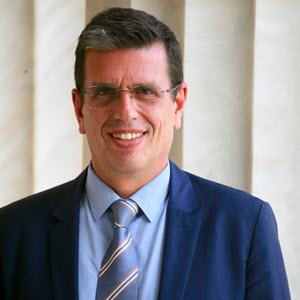
Dimitris Kairidis
Member of Parliament, New Democracy, B1 Athens – North & Professor of International Politics, Panteion University.
Dimitris Kairidis is a Member of the Hellenic Parliament, representing Athens – North, since 2019. He served as Minister of Migration and Asylum of Greece, from 2023 to 2024. He is a Professor of International Relations at the Department of International, European and Area Studies of Panteion University.
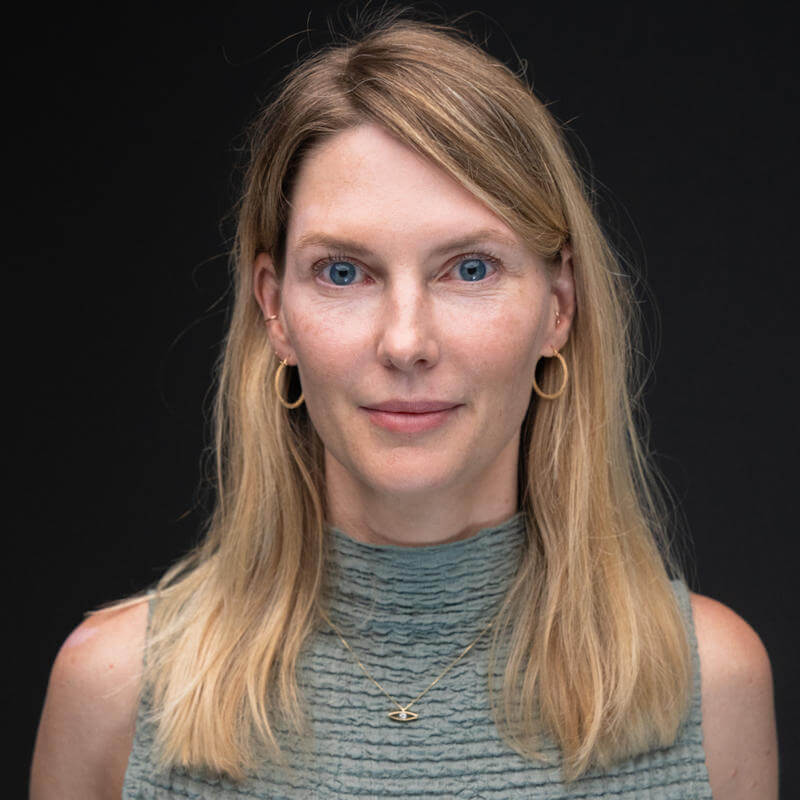
Kristin Fabbe
Professor of Transnational Governance at the EUI School of Transnational Governance
Kristin Fabbe is a full-time professor at the European University Institute, holding a Chair in Business and Comparative Politics at the Florence School of Transnational Governance. She was previously the Jakurski Family Associate Professor in the Business, Government, and International Economy Unit at Harvard Business School.
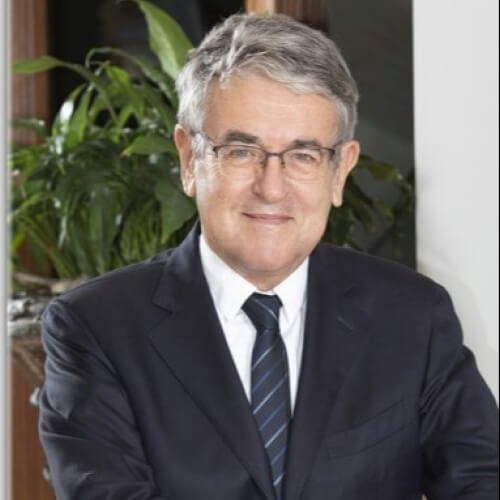
Stavros Andreadis
Chairman, The Cultural Society of Entrepreneurs of Northern Greece
Stavros Andreadis is President of the Cultural Society of Entrepreneurs of Northern Greece and Chairman of the Governing Council of the Theophano Foundation. He is also the Honorary President of the Sani/Ikos Group. He previously served as Chairman of the Association of Greek Tourism Enterprises for eight consecutive years (2001-2008), consequently becoming honorary Chairman and social partner.
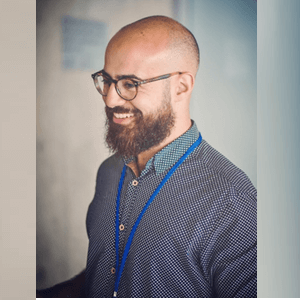
Eleftherios Petropoulos
Senior Research Associate-Project Manager, KAS Greece/Cyprus
Eleftherios Petropoulos is Senior Research Associate-Project Manager at the Greece and Cyprus Office of the Konrad-Adenauer Foundation (KAS). He has been working for KAS since 2017. Before joining KAS, he worked at the Legal Service of the European Commission, in the academia and in the private sector.
Read more
He has a legal background, graduating from the Law Faculty of the Aristotle University of Thessaloniki (Greece) and the Law School of the University of Strasbourg (France), whereas pursued postgraduate studies at the Universities of Tübingen (Private Intl. Law) and at the Europa-Institut of the Saarland University (European Law), Germany.
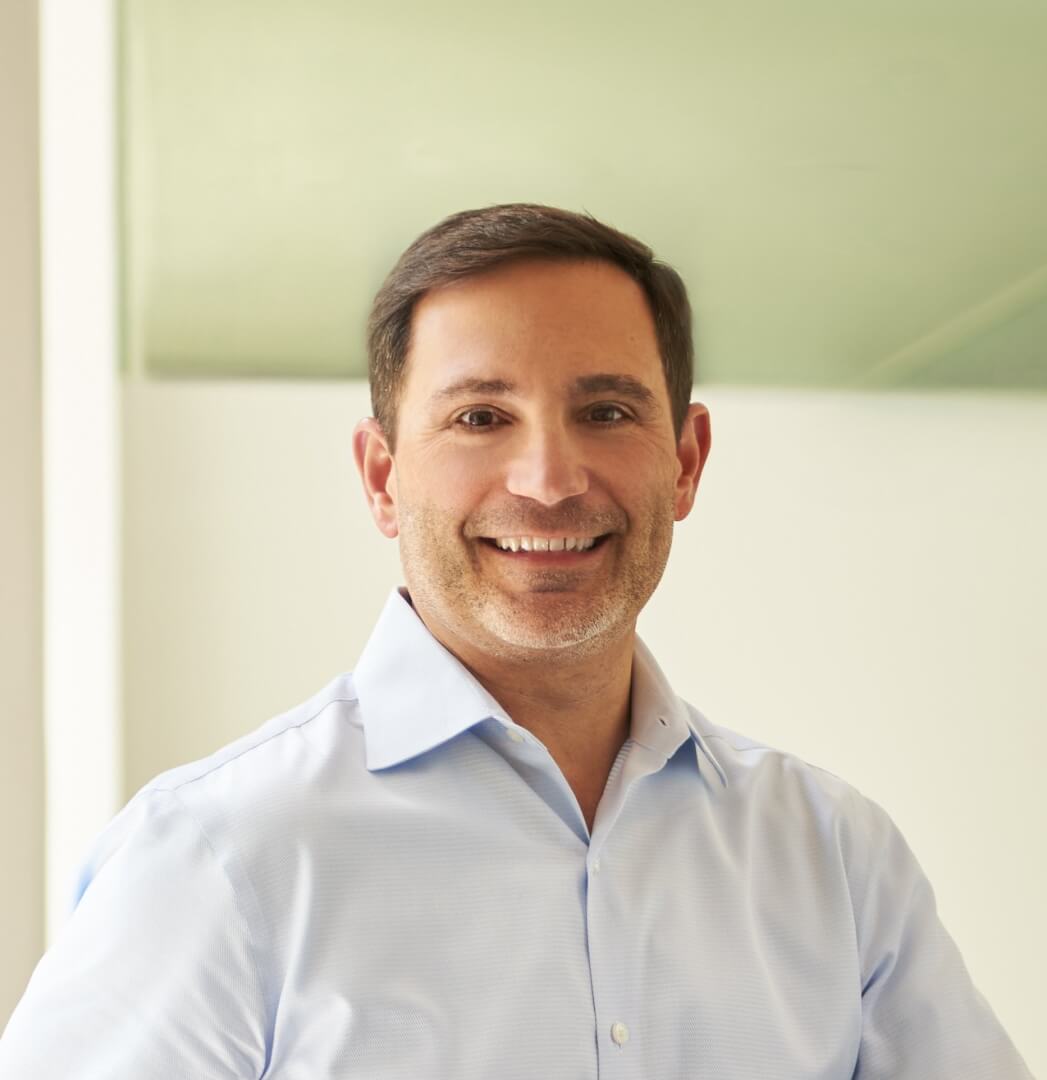
Andreas Stavropoulos
Partner at Threshold Venture Capital
Andreas Stavropoulos is a partner at Threshold Ventures, focusing on early-stage, high-conviction investments, particularly in enterprise infrastructure and platform technologies. He has extensive experience, including prior work at McKinsey & Company, and holds distinguished academic credentials with degrees in Computer Science and an MBA from Harvard, where he was a top graduate and Baker Scholar. He also serves on several boards, such as Endeavor Greece and Harvard-related advisory roles.
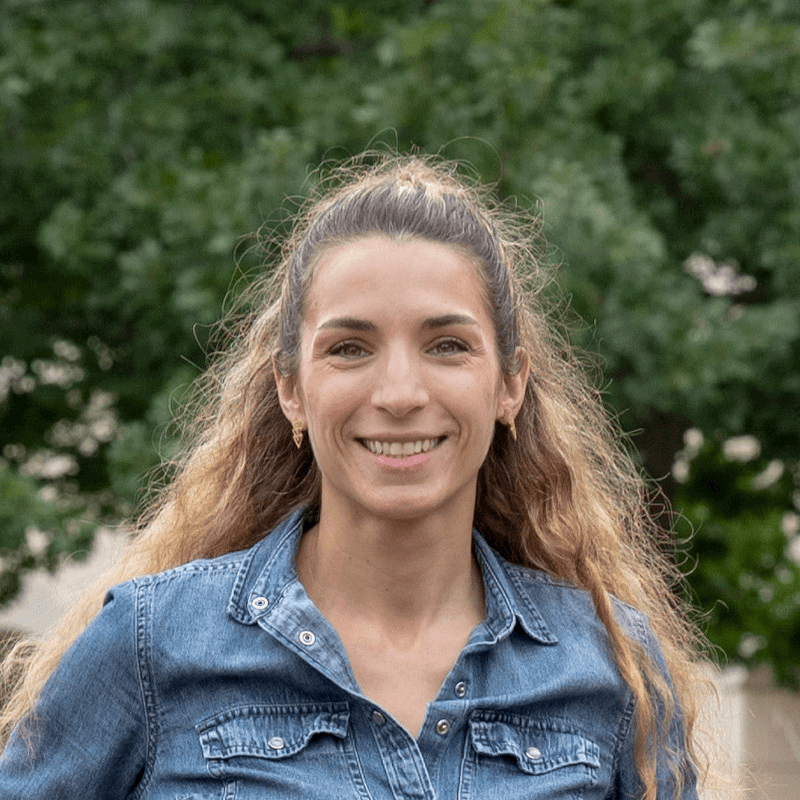
Iro Armeni
Assistant Professor of Civil and Environmental Engineering at Stanford University
Iro Armeni is an Assistant Professor of Civil and Environmental Engineering at Stanford University. Her research integrates architecture, civil engineering, and machine perception to develop data-driven methods for human-centered, sustainable, and adaptive built environments, including the use of Mixed Reality. She holds a PhD from Stanford University, with prior studies including an MSc in Computer Science and an MEng in Architecture.
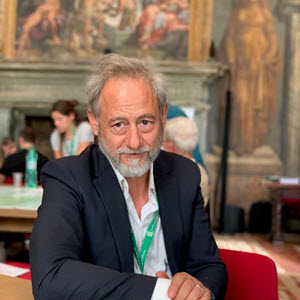
Dionysis Bochtis
Director of the Institute for Bio-Economy and Agri-Technology, at the Centre for Research and Technology – Hellas
Dionysis Bochtis specializes in systems engineering for bio-production, with a research focus that spans from ICT-enhanced agricultural systems to fully robotic and AI-based solutions. He currently serves as the Director of the Institute for Bio-economy and Agri-technology (iBO) at the Center for Research and Technology Hellas (CERTH), where he is also a member of the CERTH Board of Directors.
Read more
Additionally, he holds affiliated professorships at the University of Lincoln (UK) and Aarhus University (Denmark). Prof. Bochtis has an extensive body of work, comprising over 350 publications, including 150 research journal articles and 15 books. He has led numerous high-impact research and innovation projects focused on the digitalization and robotization of primary production. Furthermore, he has held leadership roles in prominent international biosystems engineering organizations, such as CIGR, CIOSTA, and EFITA. He is also the founder of farmB Digital Agriculture S.A. and farmB Labs Ltd.

Eric Sutherland
Senior Health Economist at the Organisation for Economic Co-operation and Development
Eric Sutherland is a Senior Health Economist at the Organisation for Economic Co-operation and Development where he leads the organization’s work on digital health. He previously served as the Executive Director of the pan-Canadian Health Data Strategy for Canada’s Public Health Agency.

George Verdi
Policy fellow with the European Power Program at the European Council on Foreign Relations
George Verdi is a policy fellow with the European Power Program at the European Council on Foreign Relations. He specializes on the implications of critical and emerging technologies for the EU’s competitiveness, economic security, and foreign policy.
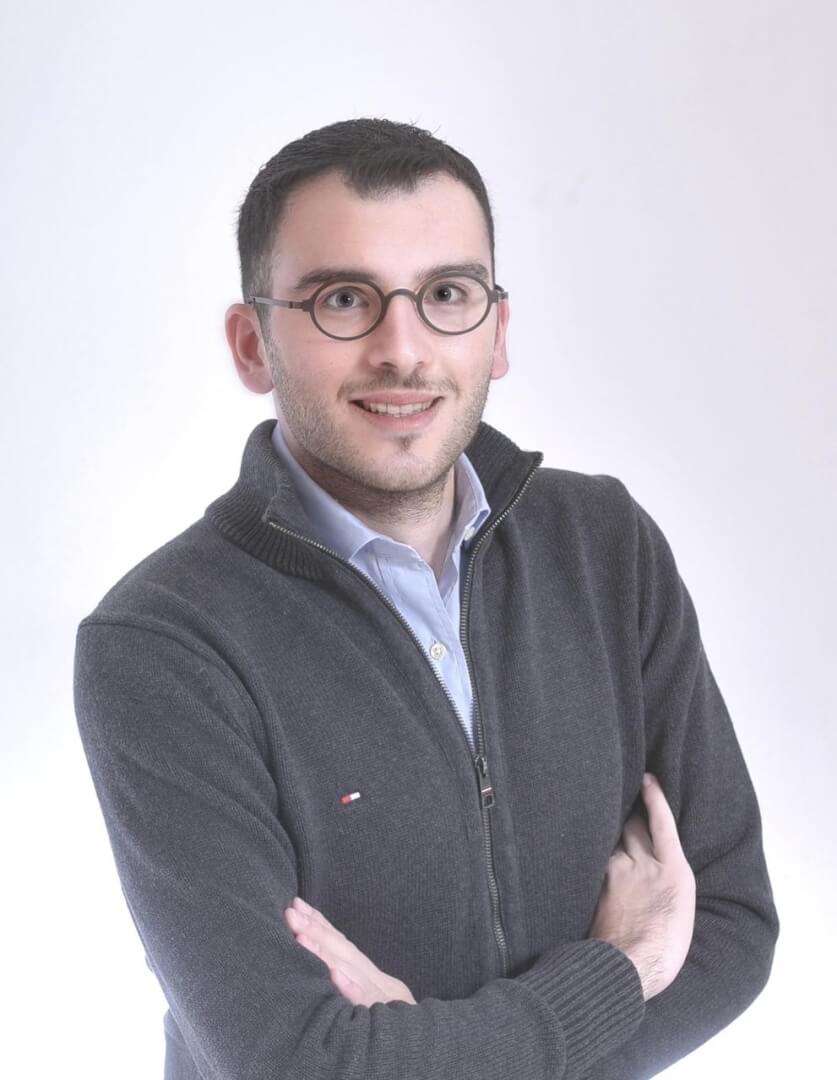
Marios Dafnomilis
Advisor at the Special Secretariat of Foresight of the Presidency of the Greek Government
Marios Dafnomilis is an advisor at the Special Secretariat of Foresight of the Presidency of the Greek Government, where he, among other things supports the work of the Prime Minister’s High Level Group Committee on Artificial Intelligence.
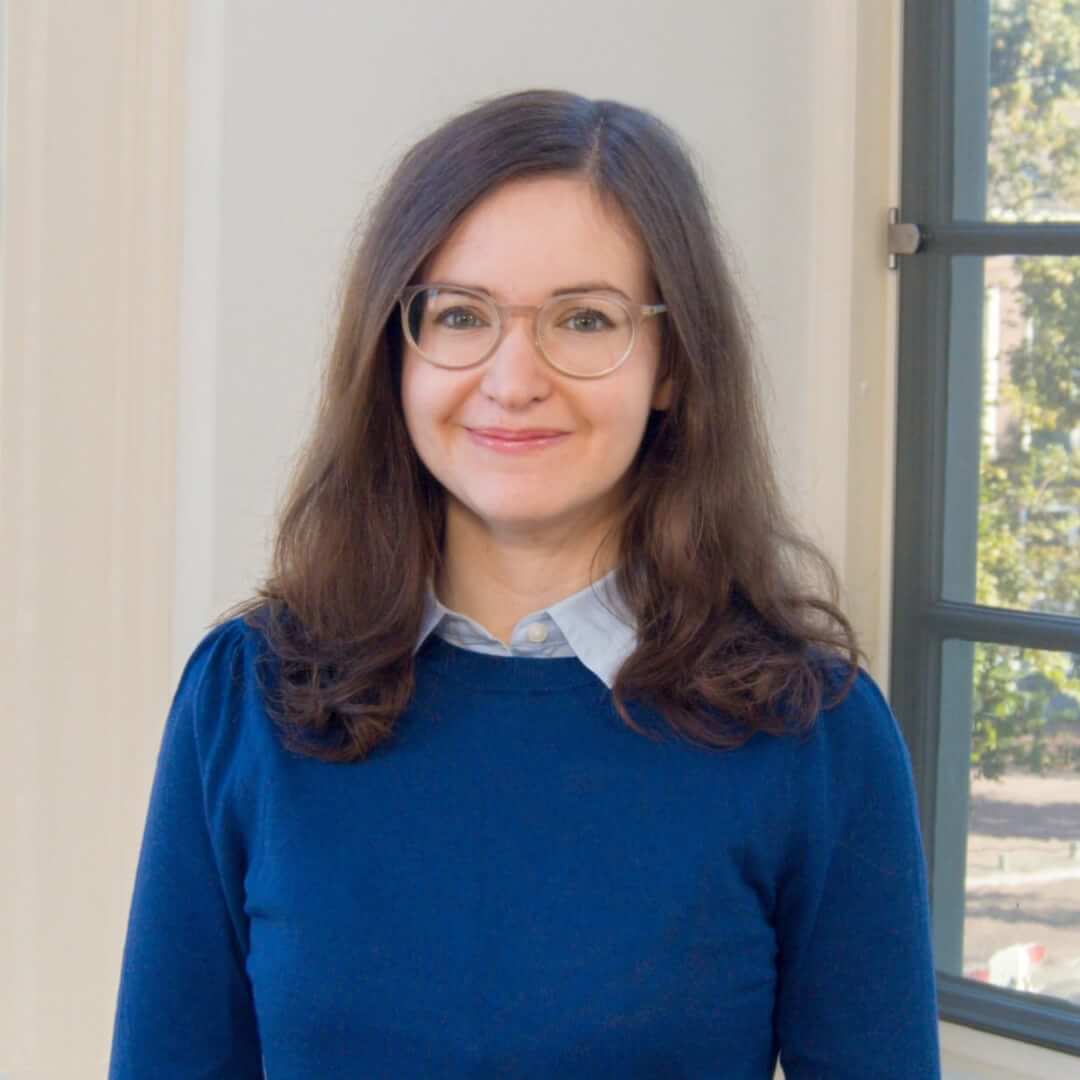
Sophia Romansky
Strategic Analyst at The Hague Centre for Strategic Studies.
Sophia Romansky is a Strategic Analyst at The Hague Centre for Strategic Studies. She is also the Project Coordinator for the Global Commission on Responsible AI in the Military Domain.
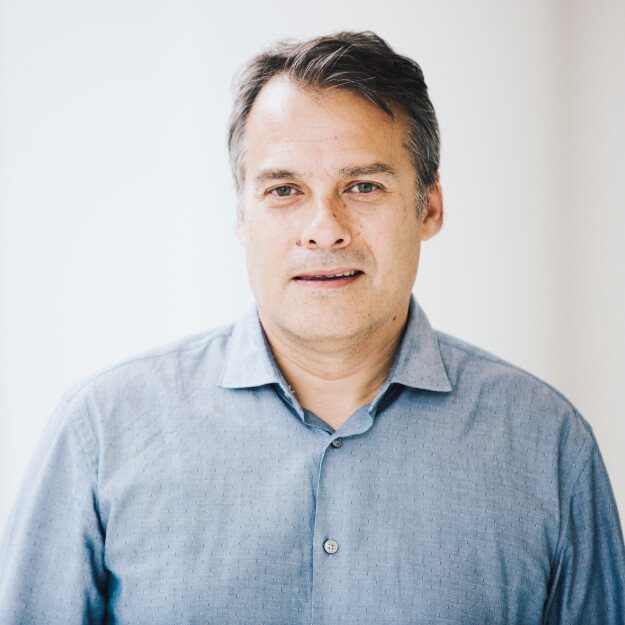
Michalis Bletsas
Governor of the Cyber Security Authority of Greece
Michalis Bletsas is a research scientist, specializing in Network Computing Systems. He currently serves as the Governor of the Cyber Security Authority of Greece and he is also the Director of Computing at the MIT Media Lab.
With the sponsorship of
Mε τη χορηγία

Gallery
Thessaloniki International Symposium in World Affairs
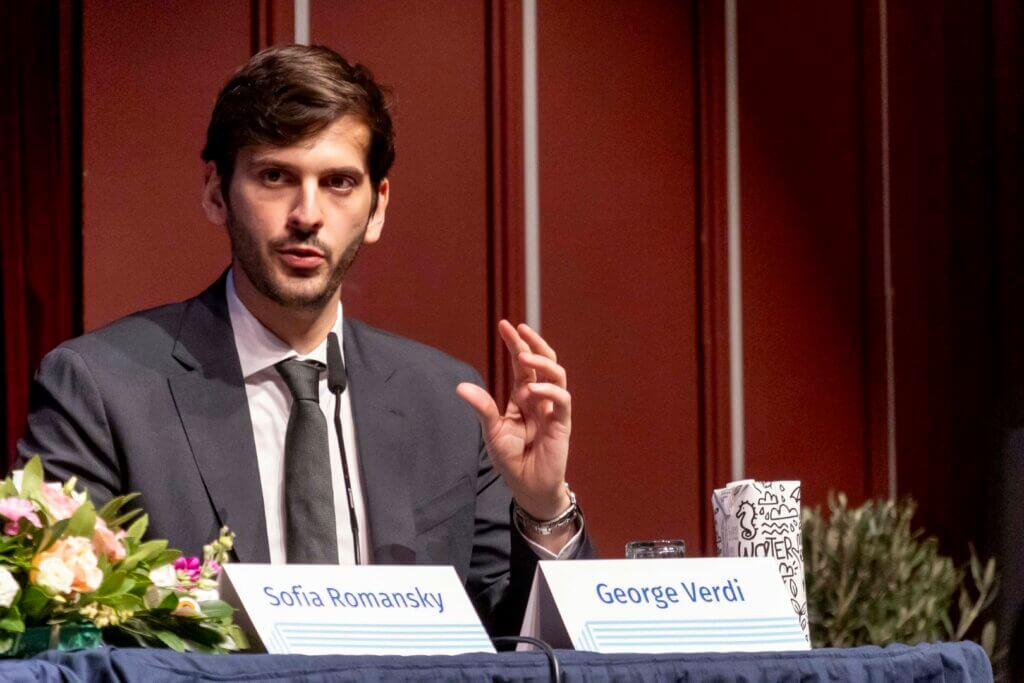
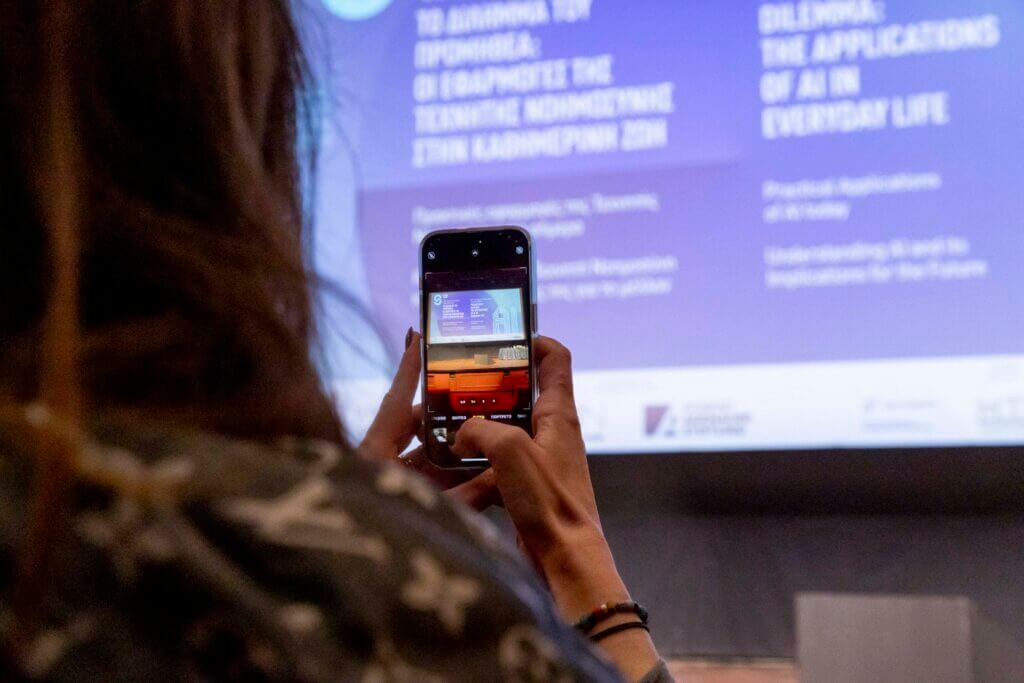
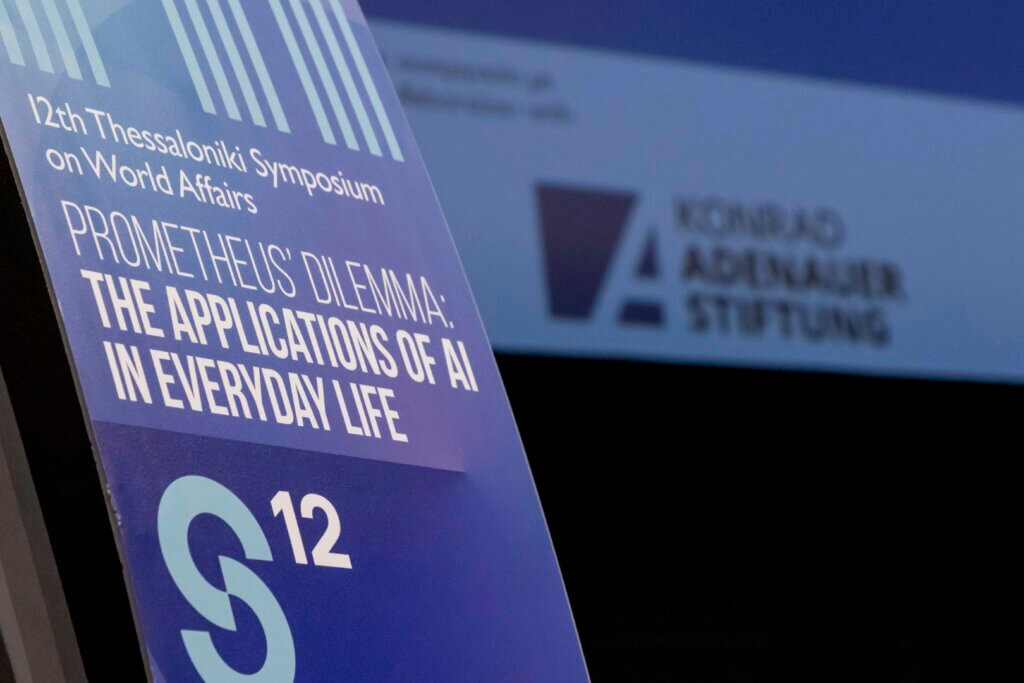
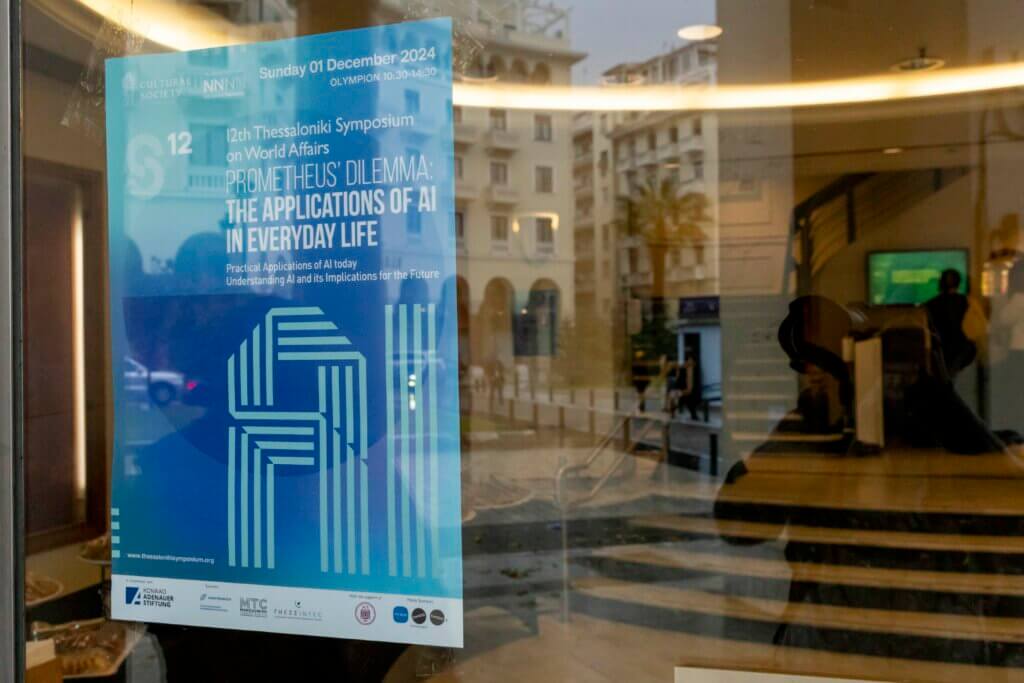

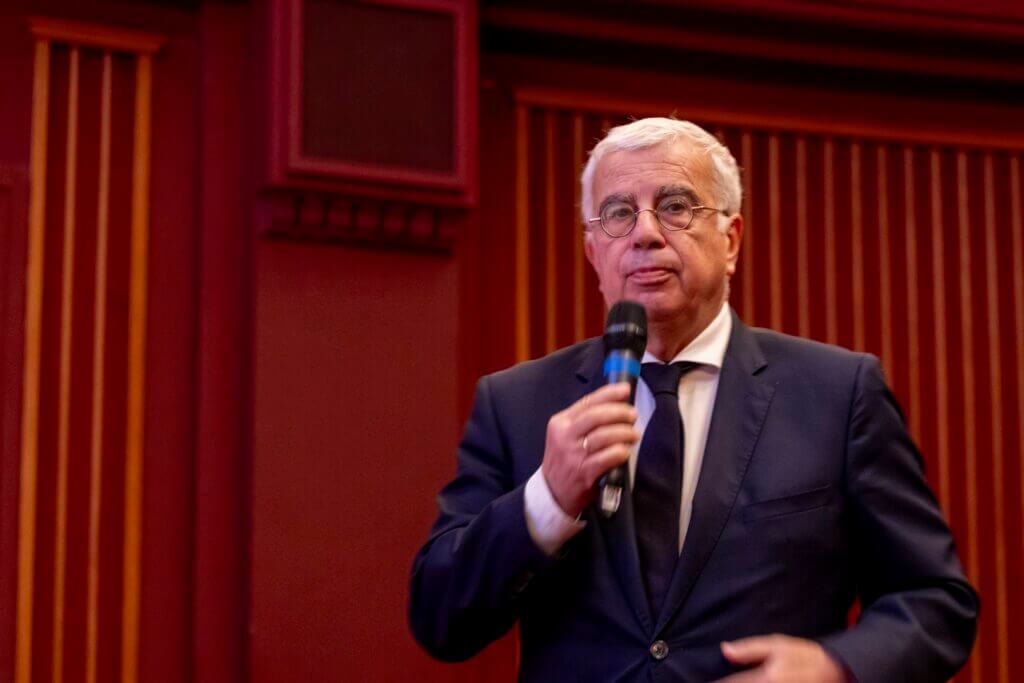
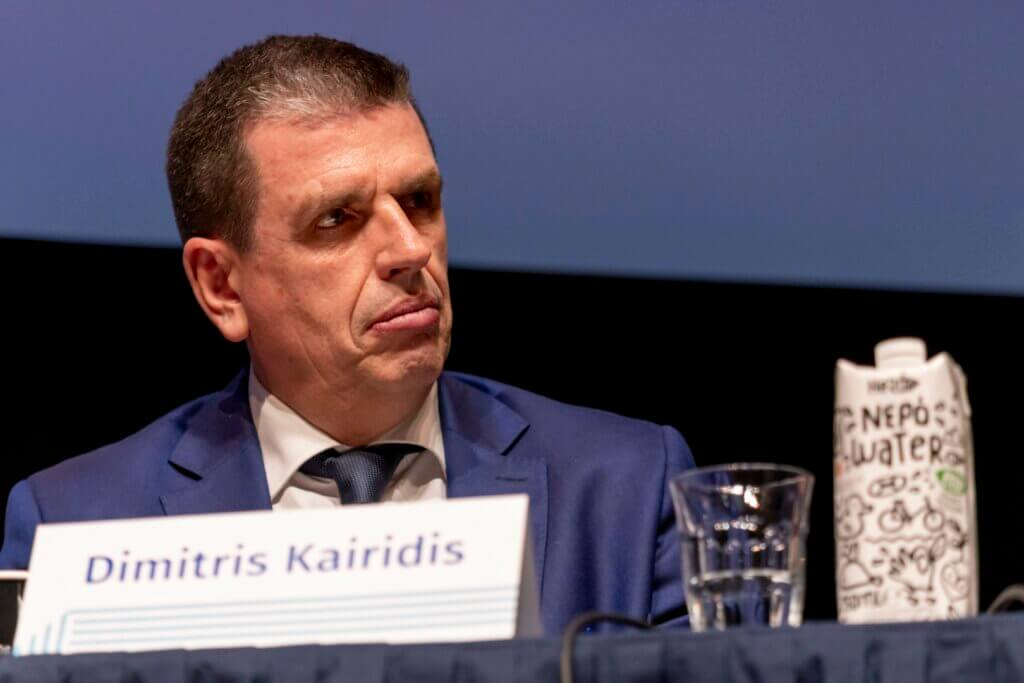
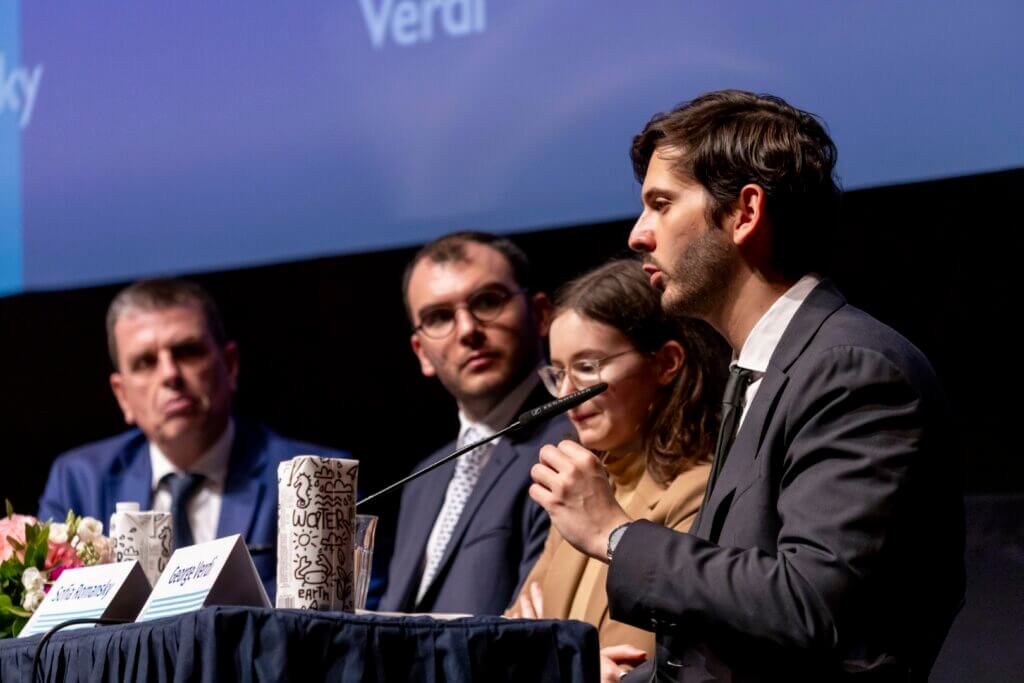
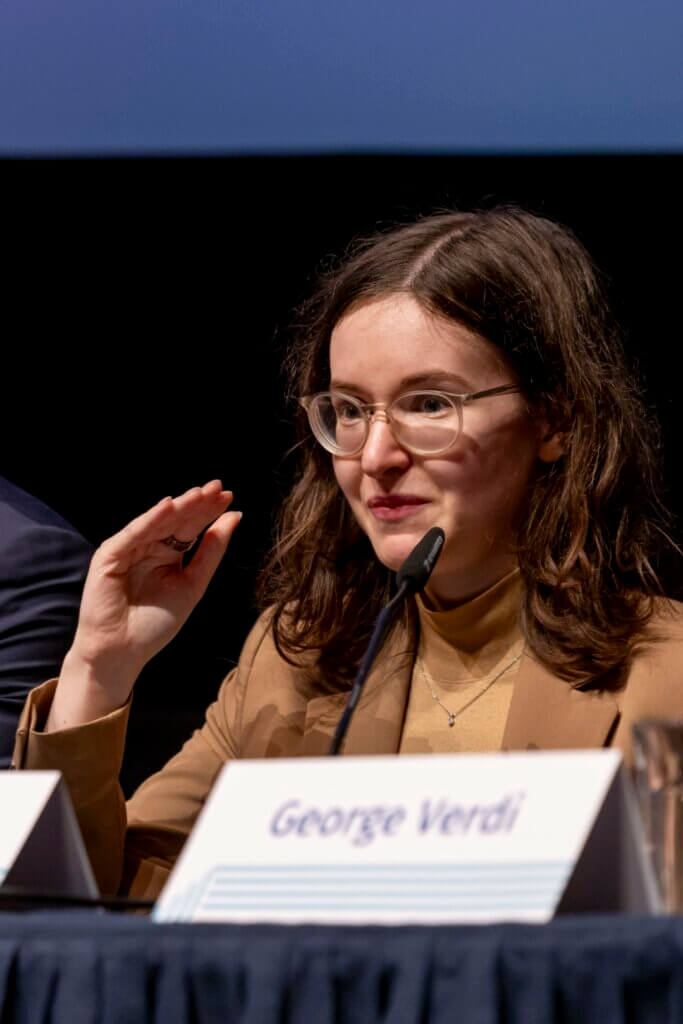
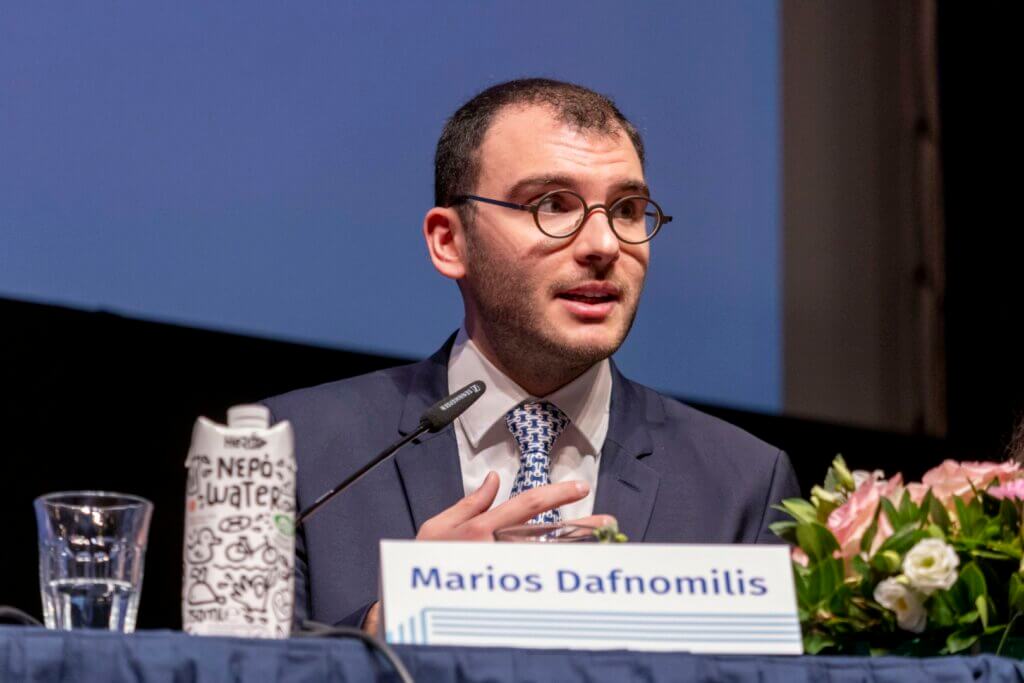
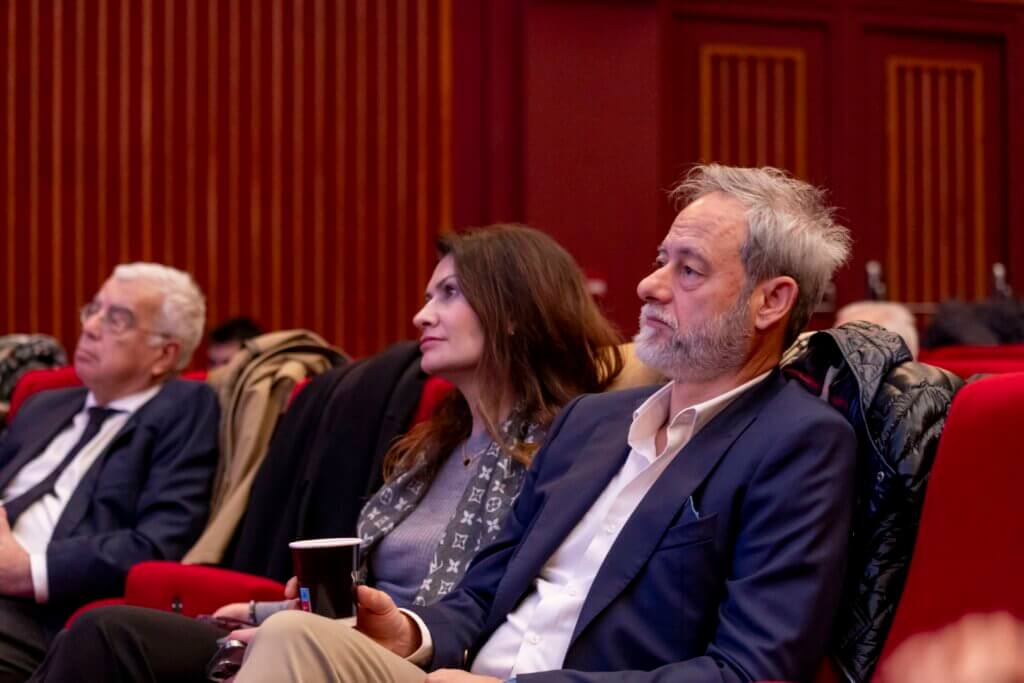
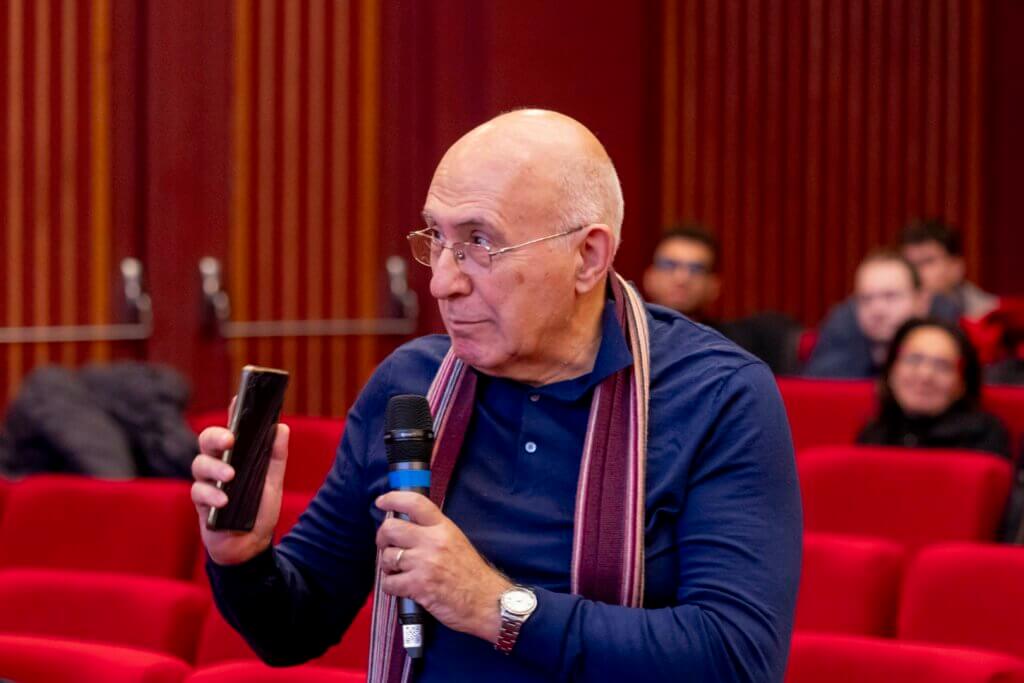
Show more
